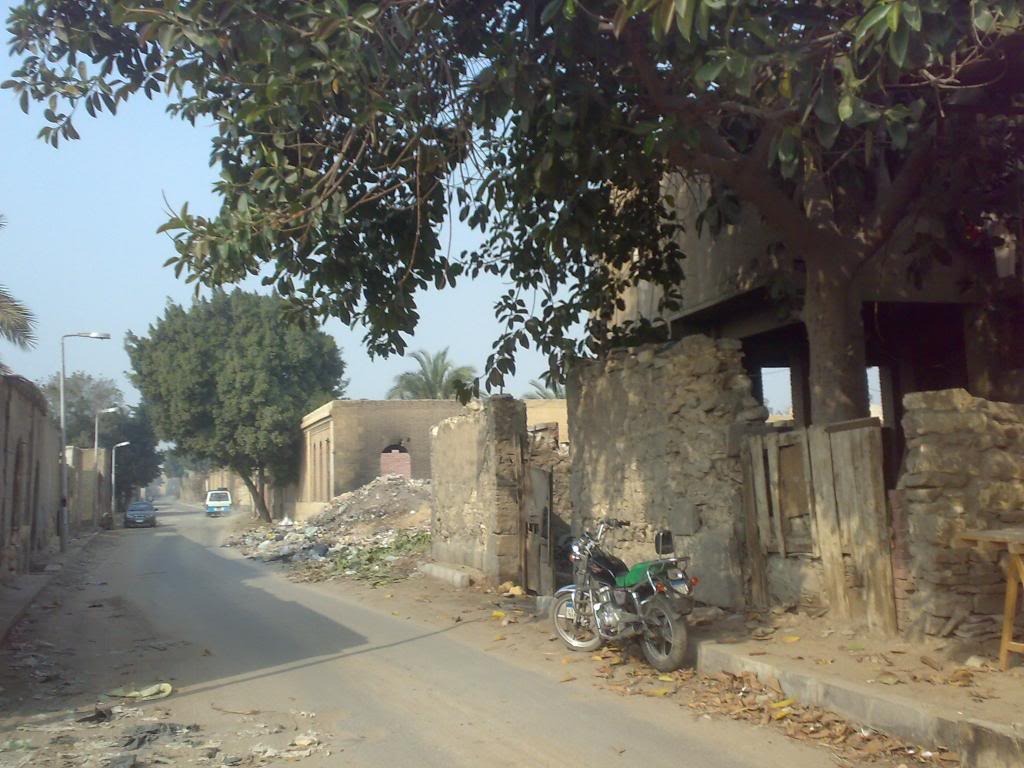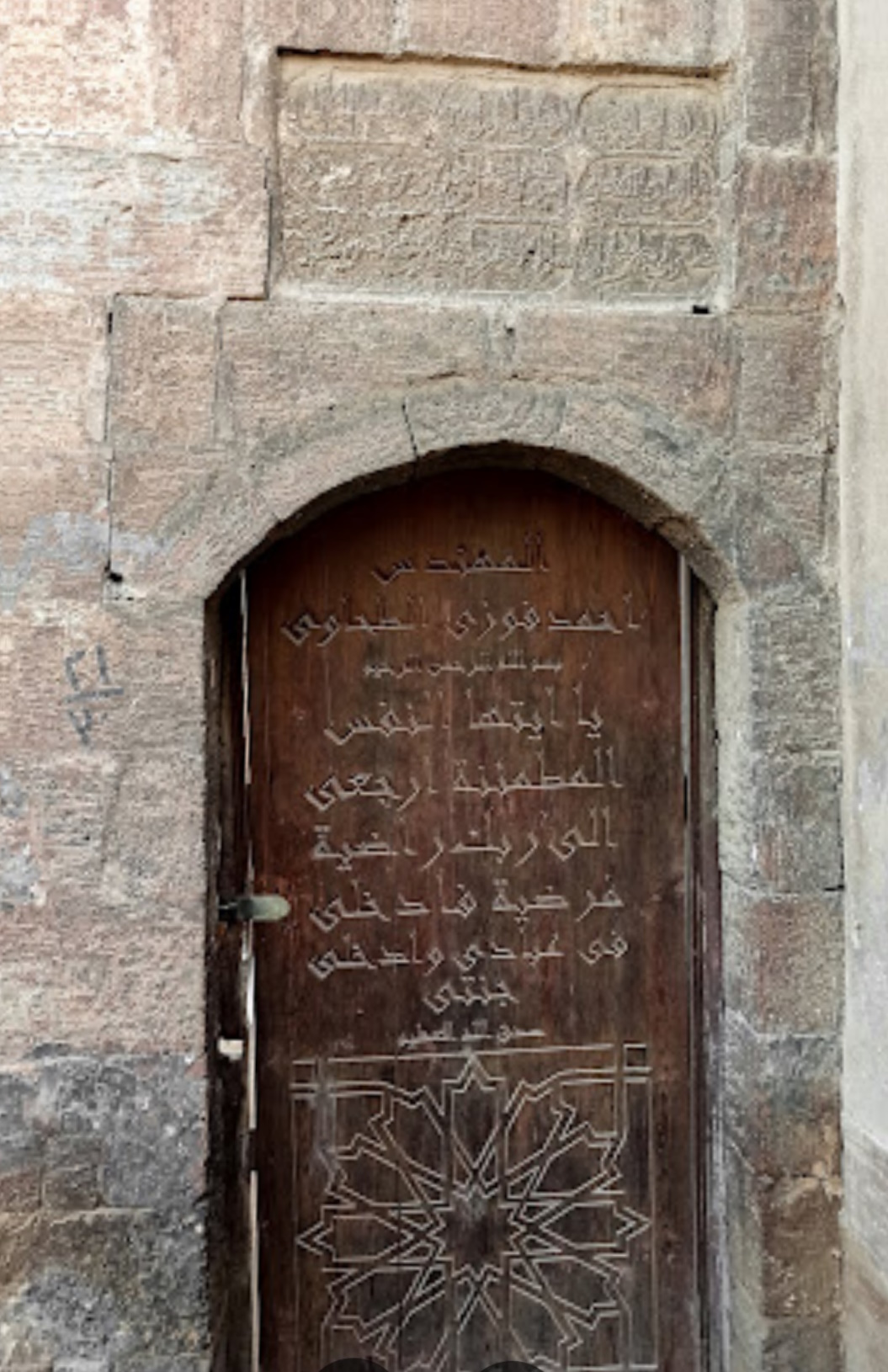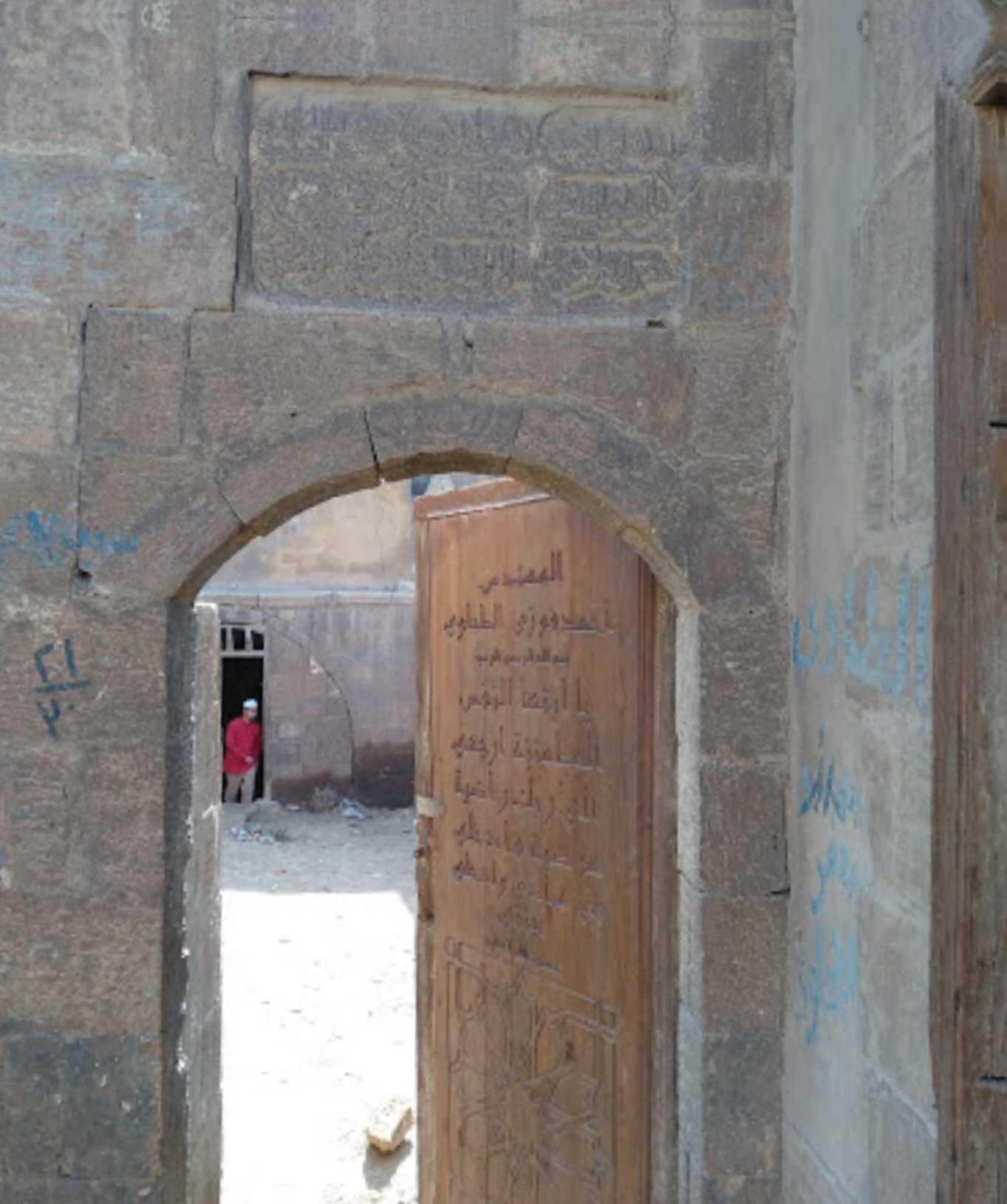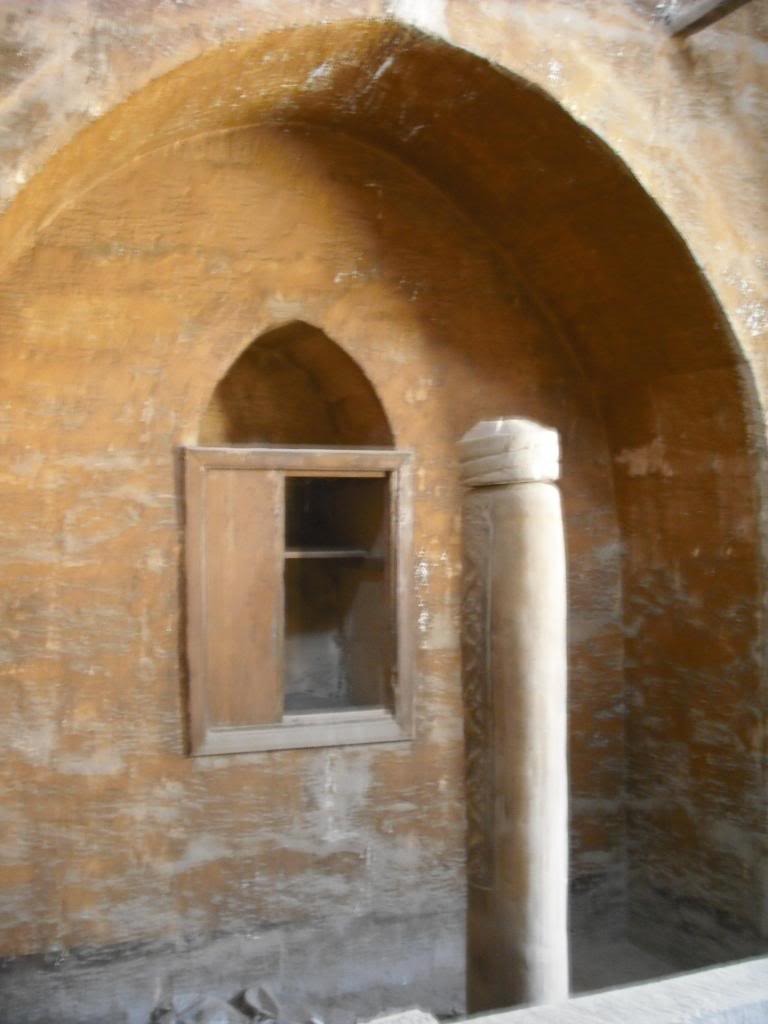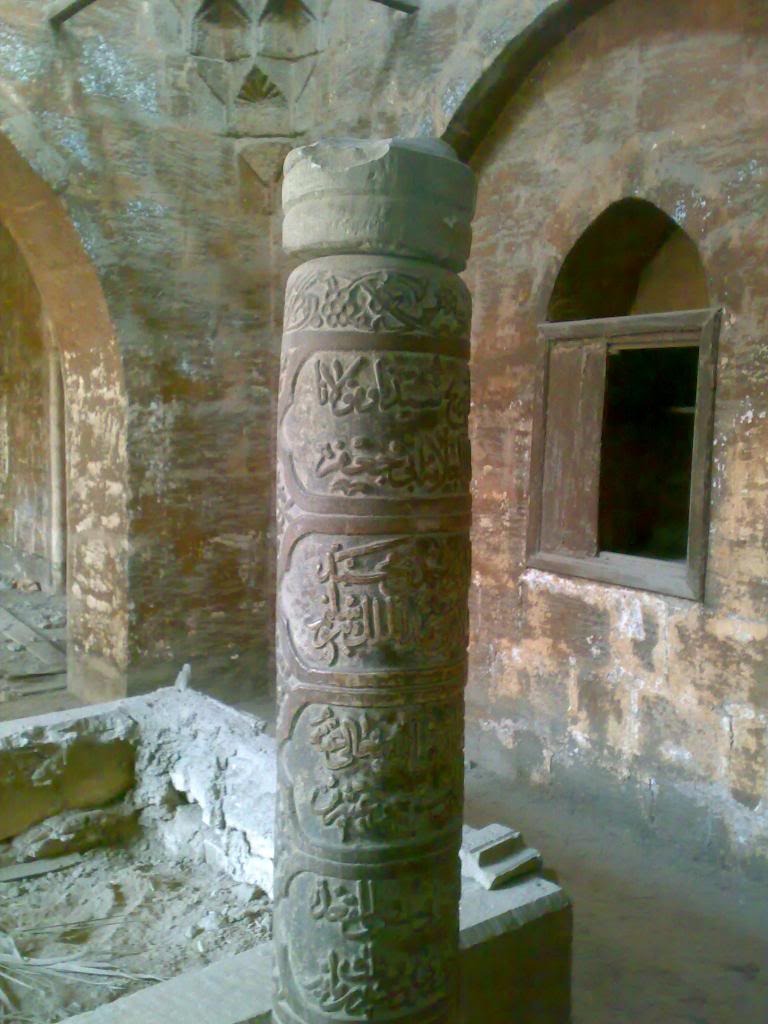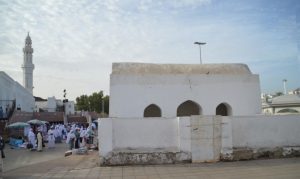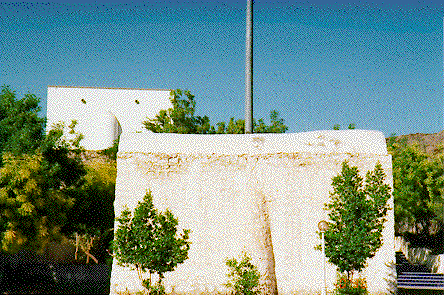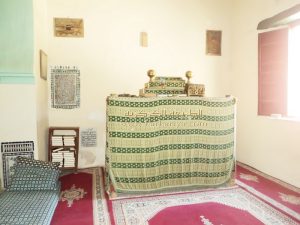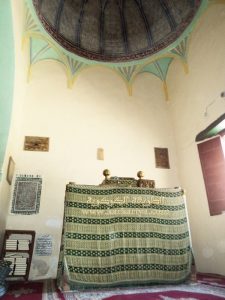Archives: Bios
Bio: Imam al-Shafi’i | الإمام الشافعي

Imam Muhammad b. Idris al-Shafi'i
الإمام الشافعيb. 150 H. in Ghazza – d.204 H. in Cairo
radiya Allah 'anhu
Bio: Imam Al-Suyuti | الإمام جلال الدين السيوطي

Imam al-Suyuti
الإمام الحافظ عبد الرحمن بن أبي بكر بن محمد جلال الدين السيوطيb. 849 in Cairo - d. 911 H. in Cairo
Bio: Imam Al-Tahawi | الإمام الطحاوي

Imam Abu Ja´far al-Warraq Al-Tahawi
الإمام أبو جعفر اوراق الطحاويb. - d. 321 C. H. in Cairo
may Allah be pleased with him
﷽
English
عربي
From Siyar al-A’lam View | Download
From Tarwid al-Mihan – ترويض المحن View | Download | Read online: Open | Close
وهاكذا نرى أن أبا جعفر ولد وأمضى نعومة أظفاره فى عهد اتصف بالعدل والورع والتقوى وكان ذلك بمدينة طحا التى نسب إليها وطحا من المدن المصرية القديمة ذكرها جوتيية فى قاموسه فقال : أن اسمها المصرى ( تيهر ) والقبطى ( توهو ) ومنها اسمها العربى طحا وقال اميلنوا إن اسمها اليونانى والرمانى هو ووردت فى كتب الجغرافيين العرب طحا كورة بمصر الصعيد فى غربى النيل ويضيف البعض فيقول من أعمال الاشمونين والبعض الآخر يقول من أعمال البهنساوية ويصفها الإدريسى فيقول : وهى من مدن الصعيد مشهورة يعمل بها وفى طرزها ( اى مصانع النسيج ) ستور صوف وأكسية صوف منسوبة إليها . ويقول ابن خلكان : كان أبو جعفر الطحاوى شافعى المذهب فى اول أمره يقرأ على شيخه اسماعيل بن يحيى بن اسماعيل بن عمر بن اسحق المزنى صاحب الإمام الشافعى فقال له يوما والله لا جاء منك شىء فغضب أبو جعفر من ذلك وانتقل الى شيخ آخر هو أبو جعفر بن أبى عمران الحنفى واشتغل عليه فلما صنف مختصره قال رحم الله أبا ابراهيم يعنى المزنى لو كان حيا لكفر عن يمينه .
Books
• «الشفا بتعريف حقوق المصطفى – ط»
• و «الغنية – خ» في ذكر مشيخته،
• و «ترتيب المدارك وتقريب المسالك في معرفة أعلام مذهب الإمام مالك – ط» أربعة أجزاء وخامس للفهارس،
• و «شرح صحيح مسلم – خ» [ثم طُبع]
• و «مشارق الأنوار – ط» مجلدان، في الحديث،
• و «الإلماع إلى معرفة أصول الرواية وتقييد السماع – ط» في مصطلح الحديث وكتاب في «التاريخ».
كتب المصنف بالموقع
Burial Place
Map
Bio: Imam al-Tirmidhi

Imam Abu ´Isa Muhammad b.´Isa al-Tirmidhi
الإمام محمد بن عيسى بن سورة الترمذي
b. 209 – d. 279 H. in … ( CE)
radiya Allah anhu
﷽
Author of one of the six canonocal hadith collections
English
Imam Tirmidhi (209 – 279 H)
By Dr. G.F. Haddad
Imam Tirmidhi was born in the year 209 A.H. during the reign of the Abbasid Khalifa Ma’mun al-Rashid. The Abbasid Caliphate, despite its brilliant contributions to Islam, brought along with it many thorny problems. Greek Philosophy had a free flow into the Islamic world. This was fully sanctioned by the government until eventually it declared the Mu’tazila school of thought as the state religion. Anyone who opposed the Mu’tazila school of thought would be opposing the state. With the influence of Greek philosophy infiltrating within the people, many Muslims began attempting to reconcile between reason and revelation. As a result they deviated themselves and misled many innocent weak Muslims away from Allah and His Prophet (s). Many scholars of Islam had come to the fore in order to defend the Shari`ah. Forgeries and interpolations in Hadith by rulers who wished to fulfil their personal motives was common. In the first century `Umar bin Abdul `Aziz (r) initiated a movement for the compilation of the holy hadith of the the Prophet (s) as there was a fear of it being lost. Eventually this gigantic task was undertaken by six towering scholars of Islam. One of them was Imam Abu `Isa Muhammed ibn `Isa Tirmidhi
Having grown up in an environment of learning, together with possessing many great qualities naturally drove Imam Tirmidhi to dedicate his life totally towards the field of Hadith. He obtained his basic knowledge at home and later travelled to far off lands in search of this great science. He studied Hadith under great personalities such as Imam Bukhari, Imam Muslim and Imam Abu Dawud. In some narrations Imam Bukhari and Imam Muslim are his students as well.
Once Imam Bukhari mentioned to him “I have benefited more from you than you have benefitted from me.” Musa ibn `Alaq once said: “When Imam Bukhari passed away, he left no one in Khurasan who compared with Abu `Isa Tirmidhi in knowledge, memory, piety and abstinence.” According to `Abdullah ibn Muhammed Al-Ansari, Imam Tirmidhi’s Al-Jami` is more beneficial than the works of Bukhari and Muslim since their compilations can only be understood by a very deep sighted scholar whereas Al-Jami` can be understood by both the scholar and the layman.
Imam Tirmidhi said that he compiled this book and presented it to the learned of Hijaz, Iraq and Khurasan and they were pleased with it. Who ever has this book in his home, it is as though he has the Prophet (s) speaking to him there.
His remarkable memory:
Imam Tirmidhi had an exceptionally remarkable memory. If he heard something once he never forgot it. Once on his way to Makkah, Imam Tirmidhi met a scholar of hadith (muhaddith) from whom he had previously copied two chapters of hadith. Thinking that he had the notes with him he asked the scholar if he would allow him to read out these two chapters so that he could correct any errors. After realizing that he did not have those notes with him he took a blank piece of paper and read out the entire two parts from memory. When the muhaddith realized what he was doing he rebuked Imam Tirmidhi saying: “Have you no shame, why are you wasting my time.” Imam Tirmidhi assured him that he had committed all the ahadith to memory. The scholar was not convinced, even though Imam Tirmidhi had recited all the hadith from memory. Imam Tirmidhi requested him to recite to him some other hadith. The scholar recited forty ahadith which Imam Tirmidhi thenrepeated without making a single error, thus showing his remarkable power of committing hadith to memory.
Another incident has been recorded by Hakim ul-Ummat in his Al-Misk-us-Zaki, depicting the profound memory of Imam Tirmidhi. He writes:
Imam Tirmidhi had lost his sight towards the latter portion of his life. Once whilst on a journey, at a certain point he bowed his head. When asked as to why he did this, he replied: “Is there not a tree here whose branches hang over in such a manner that it harms those who are passing by.” They answered in the negative. He was quite shocked when he heard this as he distinctly remembered there being a tree and was worried as to whether his memory was failing him or not. He stopped the caravan immediately and asked his companions to enquire from the locals whether a tree had existed there or not. “If it is established that no tree existed then I will stop narrating the Hadith of the Prophet (s) due to my weak memory.” On inquiry it was shown to them that a tree had previously existed over there but due to it being a hindrance to travelers it was removed.
Imam Tirmidhi had a large number of students from all over the world. The most famous amongst them were Haysam ibn Kulaib, Abul Abbaas and Muhammed ibn Ahmed Shah Abdul `Aziz describes Imam Tirmidhi in the following words: “His memory was unique and his piety and fear of Allah ta’la was of a very high caliber. He would cry so much out of the fear of Allah, that towards the end of his life he lost his sight.”
According to Ibn Taymiyya and Shah Waliullah, Imam Timidhi was an independent Jurist (Mujtahid). Moulana Anwar Shah Kashmiri is of the opinion that he was a Shafi`i.
In the year 279 A.H. in a village called Bawag at the age of 70 , Imam Tirmidhi left this temporary abode for the everlasting life of the hereafter. May Allah swt fill his grave with light. The enormity of his sacrifices and the extent to which he served the religion can never be fully comprehended.
Many books of hadith were compiled before Imam Tirmidhi decided to compile his Al-Jami`. Dawud Tayalisi and Ahmed ibn Hanbal had compiled books consisting of both authentic and weak hadith. Later Imam Bukhari compiled his Sahih and omitted all weak narrations from it. His main objective was to derive masa’il / laws from the relevant hadith. Later Imam Muslim compiled his book with a primary focus on the isnad (different chain of narrators). Imam Nasa’i’s aim was to mention the discrepancies of the hadith whilst Abu Dawud prepared a book which became the basis for the fuqaha. Imam Tirmidhi had combined the styles of Bukhari, Muslim, Abu Dawud and Nasa’i by mentioning the discrepancies regarding the narrators and also making his compilation a basis for the jurists.
The Special characteristics of al-Jami` ut-Tirmidhi
1. It is a Sunan and a Jami`.
2. Only 83 hadith are repeated.
3. Imam Tirmidhi omits the major portion of the hadith and only mentions that part which is relevant to the heading. (title)
4. After mentioning a hadith he classifies it narration (whether it is authentic or weak, etc.)
5. He specifies the narrators names, e.g. if the narrators kunya (honorific name) was mentioned, he would then mention his proper name and vice versa.
6. One hadith in Tirmidhi is a thulaathiyaat i.e. the transmitters of the hadith betwen Imam Tirmidhi and the Prophet (s) are only three.
7. Every hadith in Tirmidhi al-Jami` is “ma’mul bihi” (practised upon by the jurists.)
8. He explains the different madhahib together with their proofs.
9. He gives an explanation to all difficult ahadith.
10. His book has been set out in an excellent sequence, hence to look for a hadith is very easy.
11. There is no fabricated hadith in the entire book.
The conditions of Imam Tirmidhi in the selection of hadith
According to the commentators of Al-Jami Imam Tirmidhi maintained the following conditions throughout the compilation of his book.
1. He never narrated hadith from those who fabricated hadith. 2. Allama Tahir Muqaddisi mentions that al-Jami` ut-Tirmidhicontains four types of hadith:
[1] Those ahadith that conform with the conditions of Bukhari and Muslim. [2] Those ahadith that conform with the conditions of Abu Dawud and Nasa’i. [3] Those ahadith that have certain discrepancies either in the sanad or matan. [4] Those weak hadith that some fuqaha have relied on.3. Imam Tirmidhi accepts a hadith which is narrated with the word “a’n” provided both the narrators are contemporaries. 4. After mentioning a weak hadith, he explains the state of its weakness. 5. A mursal hadith is accepted by Imam Tirmidhi when it is supported by a chain of narrators which is not broken.
The status of al-Jami` ut-Tirmidhi among the six authentic books of hadith. al-Jami` ut-Tirmidhi has been categorized as fifth amongst the six most authentic books of hadith. According to the most preferred opinion, Bukhari enjoys the highest status, followed by Muslim, Abu Dawood, Nasai, Tirmidhi and Ibn Majah respectively. Haji Khalifa in al-Kashf al-Dhunoon has categorised Tirmidhi in third position. Al-Dhahabi has written that Tirmidhi in actual fact should be holding the third position, but due to him bringing weak narrators like Kalbi and Masloob its status has dropped. However, looking at the manner in which he set out his book it seems that Haji Khalifa’s opinion is best.
Some of the commentaries of Tirmidhi
{1.} ‘A’ridat-ul-Ahwazi
An Arabic compilation of Qadi Abu Bakr ibn `Arabi (r) in 7 volumes.
{2} Qut-ul Mughtazi
Compiled by Jalal ad-Din Suyuti (r).
{3} Tuhfat-ul Ahwadhi
Written by Sheikh Abdur Rahmaan Mubaarakpuri in 10 volumes. He is very critical against the Ahnaaf.
The Terminology of Imam Tirmidhi
The classification of hadith was firmly established by Ali ibn Madini (r) and later by his student Imam Bukhari (r). However Imam Tirmidhi was the first Imam to base his book on these classifications.
Imam Tirmidhi classifies most of the Ahadith and mentions its reliability. Altogether Imam Tirmidhi uses nine different terms.
1.) sahih: That hadith wherein each reporter must be trustworthy, he must have the power of retention and the sanad of the hadith must go back to Nabi (sallallahu alyhi wasallam) without any interruption, it must agree with those of other reliable reporters and there should be no hidden defect in the matan or the sanad. N.B. Imam Tirmidhi does not consider it a prerequisite that a sahih Hadith must have several chains of narrators.
2.) hasan: That hadith which does not contain a reporter accused of lying, it is not shaaz and the hadith has been reported through more than one sanad.
3.) da`eef: Such a hadith wherein the narrators are not trustworthy, or they don’t posses the ability of retaining, or there is a break in the chain of narrators, or the hadith is shaaz or mu’alall.
4.) gharib: According to Imam Tirmidhi a hadith is classified gharib for one of the following reasons..
(a) it is narrated from one chain only.
(b) there is some addition in the text.
(c) it is narrated through various chains of transmitters but having within one of its chains an addition in the sanad.
5.) hasan gharib: These two can be combined. i.e. hasan refers to the uprighteousness of the narrators whilst gharib implies that he is alone in transmitting the hadith.
6.) sahih gharib: This term implies that the hadith is authentic but there is only one sanad.
7.) hasan sahih gharib: This hadith is hasan since it has several chains of transmitters, it is sahih as the chains are all authentic and it is gharib in the words that Imam Tirmidhi narrated.
8.) hasan sahih: This term has caused much confusion amongst the Muhadditheen since hasan is lower in rank than sahih. While sahih indicates to the excellent retention power of a narrator, hasan indicates to a deficiency in this regard hence it seems that both are opposites and is not possible to reconcile. The mutaqaddimeen have given many explanations to this :
[1] Ibn Hajar (r) has mentioned that the word “aw” is omitted hence the hadith will be either hasan or sahih. [2] Ibn Salah is of the opinion that when a hadith is reported with two sanads, one should be considered as hasan and the other as sahih. [3] Ibn Kathir says that Imam Tirmidhi has made up a new term which implies the hadith to be higher than hasan but lower than sahih. [4] Ibn Daqiq ul `Eid is of this opinion that sahih and hasan are not opposites. Rather they belong to the same category. However hasan will be considered as inferior to sahih hence they both can be combined. This opinion has been given most preference by the Muhadditheen.CONCLUSION
By the third century A.H. a number of collections on hadith were compiled. Imam Tirmidhi was one of those scholars who contributed greatly towards this field of hadith. In this modern age the world at large is deeply indebted to Imam Tirmidhi for his compilation of hadith. May Allah swt make it possible for all of us to benefit tremendously from this priceless collection of hadith.
عربي
Books
Burial Place
Imam al-TIrmidhi died on Monday night, 13 Rajab 279 AH (Sunday night, 8 October 892) in Bugh. He is buried on the outskirts of Sherobod, a 60 kilometers north of Termez in Uzbekistan. [wiki]
Bio: Imam Sari Al-Saqati

Abū ‘l-Ḥasan Sarī ibn al-Mughallis Saqatī
(b. 155 – d. 251 H. in Baghdad)
radiya Allah anhu
.
He was Abu al-Hasan Sari (al Sirri) b. al-Maghallis al-Saqati, the imam of Baghdad of his day, and one of the first formultators of sufi sayings. He was a student of Ma`aruf al-Karkhi, and one of the companions of Bishr al-Hafi. He was the maternal uncle of al-Junayd and his teacher. He took hadith from al-Fadil. From him narrated al-Junayd and Abu al-`Abbas b. Masruq, the first in Baghdad to speak about al-haqa’iq wa al-isharat. – He was born and died in Baghdad. He passed away in 251/253 H. at the age of ninety-eight.
Silsila
As-Sari as-Saqati (d. 251 H. In Baghdad)
Ma´ruf al-Karkhi (d. 201 H.)
Imam `Ali al-Rida (d. 203 H.)
ImamMusa al-Kazim (d, 182 H.)
Imam Ja`far as-Sadiq (b, 83 – d. 148 H.)
his father Muhammad al-Baqir ibn ‘Ali (b. 59 – 114 H.)
his father Zayn al ‘Abidin ‘Ali ibn Husayn (b. 38 – d. 94H.)
his father Sayyid al-shuhadaa Imam Husayn ibn ‘Ali (b. 4 – d. 61 H.)
Imam al-Anbiya, Sayyiduna wa Mawlana Muhammad ibn `AbdAllah (d 11 H.)
English
Svenska
Abu‑‘l‑Hasan Sarī b. al‑Mughallis al‑Saqatī [d. 251/865] var morbror till al‑Djunayd och dennes lärare, och själv var han lärjunge till Macrūf al‑Karkhī. Han var en av sin tids mest enastående
Jag (al‑Qushayrī) hörde Muhammad b. al‑Husayn berätta, att han hört cAbd Allāh b. cAlī al‑Tūsī berätta, att han hört Abū cAmr b. cAlwān berätta, att han hade hört Abu‑‘l‑cAbbās b. Masrūq berätta att al‑Sarī al‑Saqatī brukade idka handel på marknadsplatsen. En dag kom Macrūf al‑Karkhī – vars krets al‑Sarī tillhörde – till honom och hade ett föräldralöst barn med sig och sade: »Kläd denne föräldralöse!» Sarī sade: »Jag klädde honom då, och Macruf gladde sig därvid och sade ›Måtte Gud få dig att hata Denna Världen och befria dig från det du befinner dig i!‹. Därpå lämnade jag handelsboden, och inget är mig förhatligare än Denna Världen. Och allt som kommit mig till del har jag Macrūfs välsignelser att tacka för.»‑{2}
Jag hörde sufimästaren Abū cAbd al‑Rahmān al‑Sulamī {Gud förbarme sig över honom!} säga, att han hört Aū Bakr al‑Rāzī säga, att han hört Abū cUmar al‑Anmātī säga, att han hade hört al‑Djunayd berätta ›Jag har inte sett någon ägna sig mer åt gudstjänst än Sarī, som uppnådde en ålder av nittioåtta år(3) och aldrig sågs ligga ned – utom då han var dödssjuk!‹.‑{3}
Det berättas om Sarī att han har sagt: »Sufism [tasawwuf] är en beteckning med tre betydelser: (1) en sufier vars inre ljus ej släcker hans gudsfruktans ljus; (2) en sufier som ej talar om en inre mening i ett vetande på sådant sätt att den upphäver den yttre meningen i Skriften [al‑kitāb] eller i Profetens goda exempel [sunna]; (3) en sufier som inte låter miraklerna få honom att riva sönder slöjorna till Guds förbud.» al‑Sarī dog år 257 (år 871 A.D.)(4).‑{4}
Jag hörde mäster Abū cAlī al‑Daqqāq berätta om al‑Djunayd {Gud förbarme sig över honom!} att denne hade sagt: »Sarī frågade mig en dag om kärleken [mahabba], och jag svarade ›En del människor säger att kärlek är samförstånd [muwāfaqa], andra säger att kärlek är altruism [īthār], andra åter definierar kärlek än si och än så‹. Då tog Sarī tag i huden på sin arm och drog i den, men den ville inte tänjas ut, varpå han sade ›Vid den Upphöjdes allmakt! Om jag säger att denna hud på grund av kärlek till Gud har torkat ut på detta armben, så talar jag förvisso sant!‹. Därpå svimmade han av, och hans ansikte rörde sig runt likt en skinande måne, varvid Sarīs hy(5) tycktes anta en rödaktig nyans.»‑{5}
Det berättas om Sarī att han sade: »Sedan trettio år tillbaka ber jag ständigt om förlåtelse för att vid ett tillfälle ha sagt ›Lov vare Gud!‹. Då frågade man, hur det kom sig, och han svarade ›En eldsvåda drabbade Bagdad, och en man kom mig till mötes och sade till mig ›Rädda din handelsbod!‹, och då sade jag ›Lov vare Gud!‹. Och sedan trettio år tillbaka är jag ångerfull över det jag sade, eftersom jag önskade mig själv bättre än det som drabbade andra troende!» cAbd Allāh b. Yūsuf berättade detta för mig och sade, att han hört Abū Bakr al‑Rāzī säga, att han hört Abū Bakr al‑Harbī berätta, att han hade hört al‑Sarī berätta detta.‑{6}
Det berättas om Sarī att han sagt ›Jag tittar på min näsa alltsomoftast dagligen av rädsla för att den har blivit svart, eftersom jag fruktar att Gud gör mitt utseende svart på grund av det jag sysslar med‹.‑{7}
Jag hörde Muhammad b. al‑Husayn {Gud förbarme sig över honom!} säga, att han hört Muhammad b. al‑Husayn b. al‑Khashshāb säga, att han hört Djacfar b. Muhammad b. Nusayr säga, att han hört al‑Djunayd säga att han hade hört al‑Sarī säga ›Jag känner till en genväg som leder till Paradiset‹ och då frågat honom ›Vilken?‹. Han svarade ›Du skall inte be någon om något, och du skall inte ta emot något från någon, och du skall inte äga något som du kan ge någon något av!‹.‑{8}
Jag hörde cAbd Allāh b. Yūsuf al‑Isbahānī säga, att han hört Abū Nasr al‑Sarrādj al‑Tūsī säga, att han hört Djacfar b. Muhammad b. Nusayr säga, att han hört al‑Djunayd säga, att han hade hört al‑Sarī säga ›Jag önskar dö i någon annan stad än i Bagdad‹. Man frågade honom då ›Varför detta?‹, och han svarade ›Jag är rädd för att min grav inte kommer att ta emot mig och att mina missgärningar kommer i dagen!‹.‑{9}
Jag hörde cAbd Allāh b. Yūsuf al‑Isbahānī säga, att han hört Abu‑‘l‑Hasan b. cAbd Allāh al‑Fuwatī al‑Tarsūsī säga, att han hört al‑Djunayd säga, att han hade hört al‑Sarī säga ›O Gud! Hur mycket du än straffar mig med något, så straffa mig inte med beslöjningens vanära!‹.‑{10}
Jag hörde cAbd Allāh b. Yūsuf al‑Isbahānī säga, att han hört Abū Bakr al‑Rāzī säga, att han hört al‑Djurayrī säga, att han hade hört al‑Djunayd säga: »En dag gick jag in till al‑Sarī al‑Saqatī, som stod och grät, och jag frågade honom ›Vad är det som får dig att gråta?‹, och han svarade ›I går kom min dotter(6) till mig och sade ‘O du min fader! Den här natten är het, så jag hänger upp det här vattenkruset här. Därpå somnade jag in och drömde att jag såg en slavinna av skönaste skapnad som just stigit ned från himmelen, och jag frågade
_________________________
1) al‑ahwāl al‑sanīya.
2) culūm al‑tawhīd.
3) Knysh översätter passagen helt oförklarligt så här: ”I visited him for ninety-eight years without ever seeing him lying down […]”!
4) Enligt al‑Sulamī: år 251 [år 865], Tabāqat al‑sūfīya, ed. Pedersen s. 41.
5) I den arabiska texten står det endast: Sarī.
6) I den arabiska texten står det:
Books & Refs
© Damas Cultural Society 2007 | Original site
Bio: Imam Sharaf al-Din al-Busiri
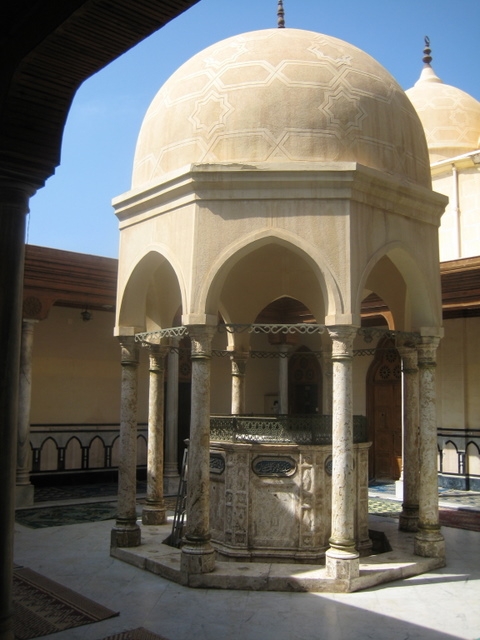
Imam Sharaf al-Din al-Busiri
d. 684 H. in Alexandria
radiya Allah anhu
Bio: Jamal al-Din al-Zayla’i | الإمام جمال الدين الزيلعي
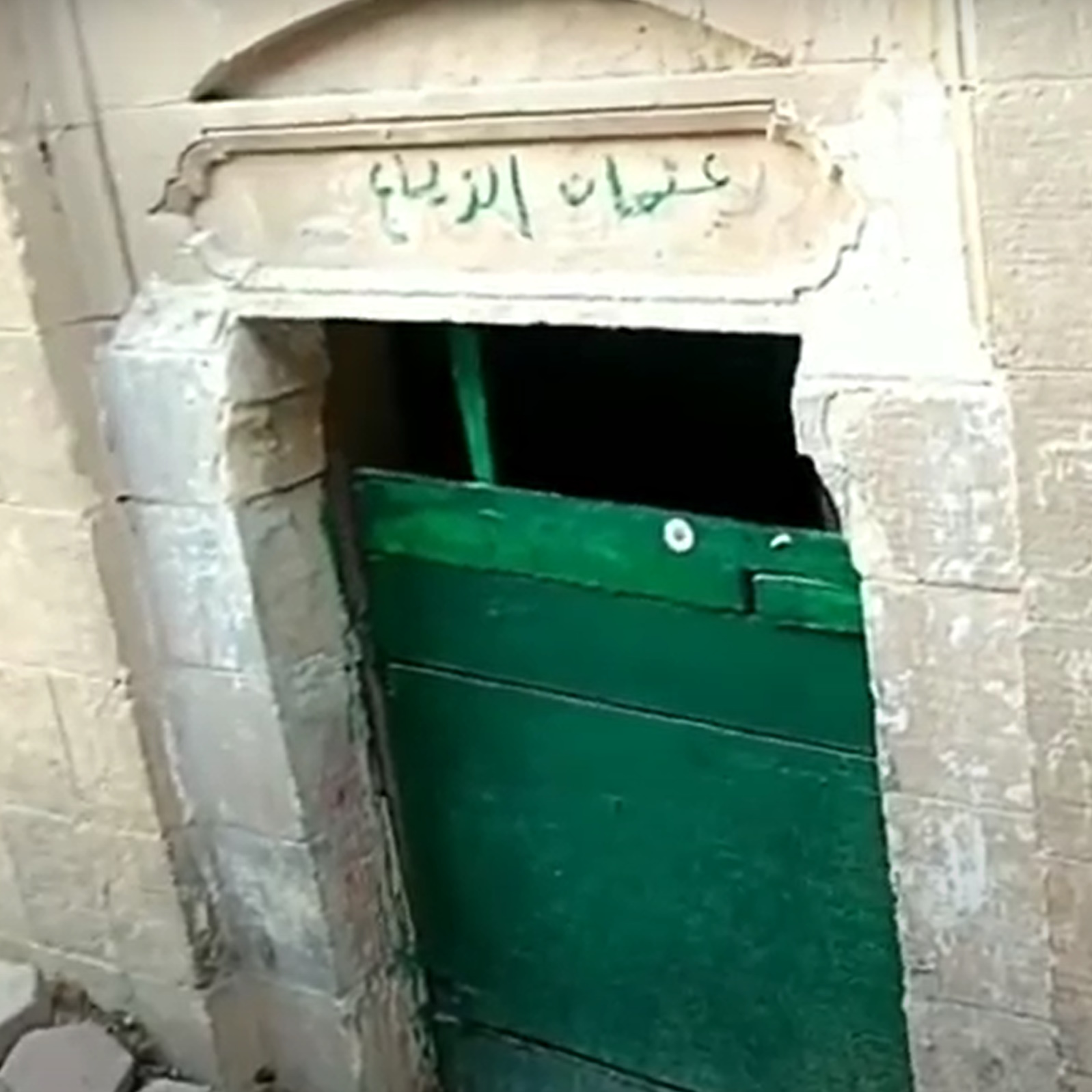
Imam Jamal al-Din al-Zayla'i
الإمام جمال الدين أبو محمد عبد الله بن يوسف بن محمد الزيلعي الحنفي المصريb. in Zayla' – d.762 H. in Cairo
may Allah be pleased with him
Bio: Jamil Buthayna
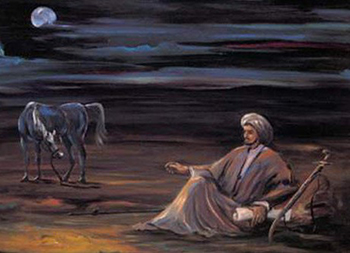
Jamil b. ´AbdAllah b. Ma´mar
(known as Jamil Buthayna)
b. in Hijaz – d. 82 H. in Misr
Bio: Mawlay Idris II – The Founder of Fas

Moulay Idris II – Founder of the City of Fas
سيدنا ومولانا إدريس الأزهرb. 157 H. – d. 213 H. in Fas
Bio: Moulay ‘Abd al-Salam ibn Mashish
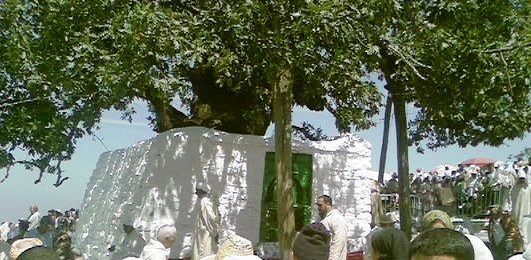
Sayyidi Moulay `Abd al-Salam Ibn Mashish al-Hasani al-Idirisi
القطب المُنير سيدي عبد السلام بن مشيش
d. 622 H. Jabal ‘Alam near Tetuan
qaddasa Allah sirrahu
Bio: Mu’awiya b. Abi Sufiyan | معاوية بن أبي سفيان
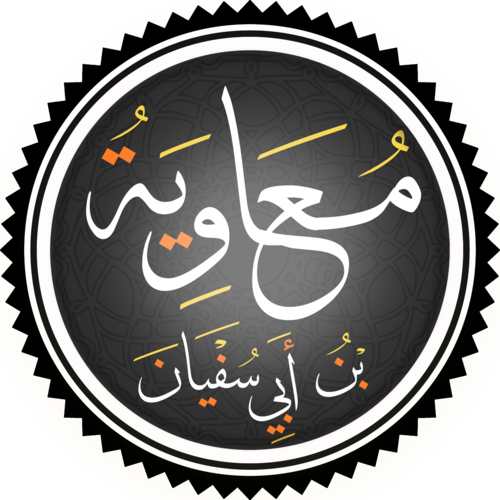
Mu'awiya b. Abi Sufiyan
معاوية بن أبي سفيانb. 15 H. in Makka – d.60 H. in Damascus
sahabi - radya Allah anhu
Bio: Nur al-Din b. Zanki

Nur al-Din b. Zanki
b. 511 – d. 579 in Daamascus
radiya Allah anhu
– السلطان أبو القاسم نور الدين محمود ين أبي سعيد(أبو سعد) زنكي بن سيف الدين –
Just ruler of Damscus, first in history ot build a Dar al-hadith, gave many books as waqf, built schools and mosques and institueted many awqaf, loved and honored the pple of din; strong in warfare, a good archer, he would only consume out of wealth he gained by buisineness or spoils of war according to what the `ulema deemd lawful; he forbade wide under his rule, known for his justice and rightousness, rebuilt the city walls and fortresses of all Sham: Aleppo and Hums and Hama and Damascus and other places; build several hospitals, the most famous one in Damascus, which was institueted as waqf, and where rich and poor were attended to; and he made Daria (a village in the Ghuta west of Damascus) a waqf for poor Muslims. [Ziarat al-Sham p. 27-28, quoting Ibn Khaldun]
He was buried in the city wall of Damascus, later his remains were moved to a madrasa he had built for the Hanafis on the Westersn side of (الخواصين أو الخوامين، معروف الآن بسعق الخياطين وكان يعرف بسوق الآخصاصين)ـ
[Ziarat al-Sham p. 29]
© Damas Cultural Society 2007 — Latest update:
Original site: damas-original.nur.nu
Bio: Qadi ´Iyad
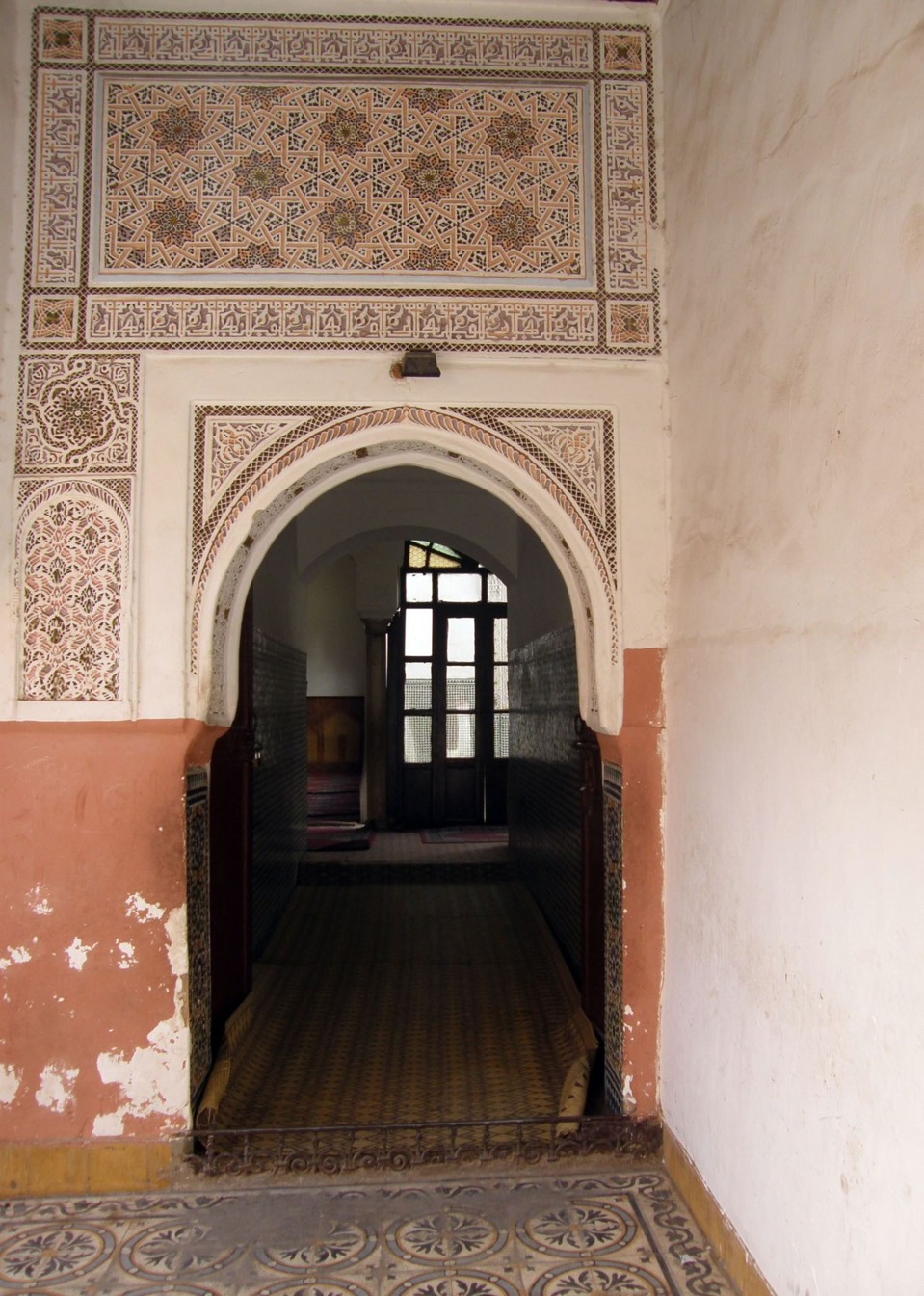
Qadi ´Iyad
القاضي عياض بن موسى بن عياض اليحصبي
b. 476 – d. 544 H. in Marrakesh (1083 – 1149 CE)
may Allah be pleased with him
﷽
English
Among the great Moroccan influential advocates of the cult of the Holy Prophet (peace and blessing be upon him) is the Patron Saint of Marrakech Sidi al-Qadi Abul Fadl Iyyad ibn Musa al-Yahsubi al-Sabti al-Maghribi (d. 544/1129), the premier Hadith scholar of the late Almoravid period and qadi al-jama’a of the cities of Granada and Sabta (“current occupied Ceuta, may Allah turn it to Dar al-Islam). A famous adage, of whom it was said, “Were it not for Iyyad Morocco would not have been mentioned,” the Qadi’s most famous work, Kitab Shifa bita’rif huquq al-Mustapha (The Antidote in knowing the rights of the Chosen Prophet), is a tradition based treatise that promotes the veneration of the Chieftain of the Universe, the Reason of Existence, the Seal of Prophethood and Messengership, Sidna Mohammed ibn Abdellah (peace and blessing be upon him) as the universal archetype of humanity. Al-Qadi Iyyad portrays the Holy Prophet (peace and blessing be upon him) as a mortal man who was blessed with superhuman qualities. Although he acknowledges that the Holy Prophet (peace and blessing be upon him) had human limitations, he restricts these to the Prophet’s outward or bodily aspects alone. With respect to his inner qualities, the Prophet had more in common with the divine than with other of his species. This is proven of Qadi Iyyad by the Prophet’s enjoyment of divine protection and his freedom from major sins and weaknesses. For al-Qadi Iyyad, Holy Prophet’s al-qudwa al-‘hasana (beautiful example) is a paradigm for religious and nonreligious behaviour alike. Thus the Prophet’s actions exemplifies the best of human undertakings: “the best manner of living, the most efficacious teaching, the most useful knowledge, and the finest of personal attributes”. Since many of these qualities pertain to the prophet’s inborn nature and cannot be duplicated by other human beings, al-Qadi Iyyad urges his readers to instead immolate Sidna Mohammed’s acquired virtues, such as his generosity, forebearness, bravery, good fellowship, moral standards, justice, asceticism, and God-consciousness.
عربي
From Tarwid al-Mihan – ترويض المحن View | Download | Read online: Open | Close
هو الإمام العلامة الحافظ الأوحد، شيخ الأندلس والمغرب، وفريد عصره، شيخ الإسلام، القاضي عياض بن موسى بن عياض بن عمرو اليحصبي الأندلسي ثم السبتي المالكي، وُلد 476هـ بمدينة سبتة المغربية (وهي ما زالت واقعة حتى الآن تحت الاحتلال الإسباني)، وكان جده عمرو قد هاجر من الأندلس إلى المغرب أيام ملوك الطوائف، وسكن مدينة سبتة، وبها وُلد القاضي عياض.
لم يحمل القاضي عياض العلم في الحداثة كعادة كبار العلماء، بل طلبه بعد أن جاوز العشرين، وكان أول سماعه وطلبه للعلم إجازة مجردة من الحافظ أبي عليَّ الغسَّاني، ثم رحل إلى الأندلس سنة 503هـ، وسمع من شيوخها وعلمائها، وانقطع لطلب العلم، فاستبحر من شتى العلوم: الحديث والفقه، وعلوم اللغة، وتمر فيها حتى فاق معاصريه وشيوخه، وبذ الأقران، وجمع وألف، وناظر وأفتى، وسارت بتصانيفه الركبان، واشتهر اسمه في الآفاق، وتولى منصب القضاء في بلده سبتة مدة طويلة، حُمِدَتْ فيها سيرته، ثم نقل عنها إلى قضاء غرناطة، ومن شدة أهليته للمنصب ارتبط واقترن اسمه بقلب القاضي؛ على الرغم من صغر سنه، فلقد تولى القضاء وله خمس وثلاثون سنة فقط.
ثناء الناس عليه:
كان القاضي عياض من محاسن الدهر، وبركة العصر، وكلمة إجماع عند أهل العلم، رزقه الله عز وجل القبول عند الناس، فأنزلوه مكانه اللائق به في مصاف كبار علماء الأمة، وأثنوا عليه بما هو أهله، وهذه طائفة من أقوالهم:
قال ابن بشكوال تلميذه: هو من أهل العلم والتفنن، والذكاء والفهم، استقضى بسبتة مدة طويلة، حمدت سيرته فيها، ثم نقل إلى غرناطة، فلم يطول بها، ثم قدم علينا قرطبة فأخذنا عنه، واستفدنا منه كثيرًا.
قال الفقيه محمد بن حمادة السبتي: جلس القاضي للمناظرة وله نحو من ثمان وعشرين سنة، وولي القضاء وله خمس وثلاثون سنة، كان هينًا من غير ضعف، صليبًا في الحق، وقد حاز من الرئاسة في بلده والرفعة ما لم يصل إليه أحد قط من أهل بلده، وما زاده ذلك إلا تواضعًا وخشية لله تعالى.
قال ابن خلكان في وفياته: هو إمام الحديث في وقته، وأعرف الناس بعلومه، وبالنحو، واللغة، وكلام العرب، وأيامهم، وأنسابهم.
قال المؤرخ الشهير محمد بن عبد الله: وكان القاضي عياض من أكابر الحفاظ، ومن أعظم أئمة عصره في الحديث، وفي فهم غريبه ومشكله ومختلفه، بارعًا في علم الأصول والكلام، حافظًا للمختصر والمدونة، متمكنًا من الشروط والأحكام، أبرع أهل زمانه في الفتيا، متقنًا للنحو واللغة، أديبًا كبيرًا، وشاعرًا مجيدًا، حسن التصرف في النظم، كاتبًا بليغًا، وخطيبًا مفوهًا، عالما بالسير والأخبار، ولا سيما أخبار العرب و أيامها وحروبها، وكان حسن المجلس، ممتع المحاضرة، فصيح اللسان، حلو المداعبة، بسامًا مشرقًا، جم التواضع، يمقت الإطراء والملق، معتزًا بنفسه ومكانته، محبًا لأهل العلم، معاونًا لهم على طلبه، جوادًا، سمحًا، من أكرم أهل زمانه، كثير الصدقة والمواساة.
مصنفاته:
يعتبر القاضي عياض من أكثر علماء المغرب تصنيفًا وترتيبًا، وله ثبت حافل بالمؤلفات النفسية والفائقة، كلها بفضل الله عز وجل موجود ومطبوع، وهو من الأعلام القلائل الذين لم يفقد مؤلفاتهم شيء، على الرغم من المحنة الهائلة التي تعرض لها عندما اضطهدته السلطة، وهذا الحفظ الذي حفظه الله عز وجل لمؤلفات القاضي عياض دليل على عظم هذا الإمام ومكانته، وتأييد الله عز وجل له، وإعلاء ذكره وعلمه بين العالمين، أما عن أهم كتبه ومصنفاته فمنها:
• كتاب (الشفا في شرف المصطفى) وهو أجَّل كتبه وأنفعها وأشهرها، وقد أتى في الكتاب بالعجائب والفرائد والتأويلات البديعة، والمعاني الخفية اللطيفة، فجاء هذا الكتاب فريدًا بين كتب سيرة النبي صلى الله عليه وسلم، وقد شغف العلماء بهذا الكتاب، فوضعوا له الشروح والحواشي، وخرجوا أحاديثه، وحرروا ألفاظه، ولذلك الكتاب عدة طبعات بعدة شروح مختلفة، وبتحقيق أسماء مختلفة من أهل العلم، والكتاب لا يستغني عنه أي طالب علم، فضلا عن المتخصصين في السير والتاريخ.
• كتاب ((ترتيب المدارك وتقريب المسالك في ذكر فقهاء مذهب مالك)).
• كتاب ((العقيدة)) في بيان عقيدة أهل السنة والجماعة، وقد شرح فيه عقيدته السلفية الصحيحة.
• كتاب شرح حديث أم زرع، واسمه (بغية الرائد فيما في حديث أم زرع من الفوائد)، وقد ذكر فيه طرق الحديث، وما يتعلق بها، ثم ذكر على طريق الإجمال فيه من العربية والفقه والغريب، وما اشتمل عليه من ضروب الفصاحة، وفنون البلاغة والبديع، ويعد هذا الشرح من أعظم كتب البلاغة التطبيقية في الكتب العربية، وقد أثنى عليه الحافظ ابن حجر كثيرًا في الفتح.
• كتاب ((مشارق الأنوار في اقتفاء صحيح الآثار)) وهو في تفسير غريب الحديث، وضبط ألفاظه رتب فيه الكلمات على ترتيب حروف المعجم المعروف ببلاد المغرب بحسب حرفها الأول، ثم الثاني وهكذا، وهو من الكتب العظيمة النافعة.
• كتاب ((جامع التاريخ)) الذي أربى على جميع المؤلفات، جمع فيه أخبار ملوك الأندلس والمغرب، واستوعب فيه أخبار سبتة وعلمائها.
• كتاب ((الإكمال في شرح صحيح مسلم)) أكمل به كتاب ((المعلم)) للإمام المازري.
• كتاب ((الإلمام إلى معرفة أصول الرواية وتقييد السماع)).
• كتاب ((التنبيهات))، كتاب ((الإعلام بحدود قواعد الإسلام)).
محنته:
وُلد القاضي عياض كما ذكرنا سنة 476 بسبتة، التي كانت وقتها تحت حكم دولة المرابطين العظيمة، وهذه الدولة كانت من أعظم الدول الإسلامية التي ظهرت في بلاد المغرب عبر عصورها جميعًا، فلقد كانت دولة مجاهدة من الطراز الأول، حققت في هذا المضمار الكثير من الفتوحات والإنجازات الخالدة، وكان لها الفضل في نشر الإسلام في غرب ووسط القارة الإفريقية، حتى إن راياتها الميمونة قد وصلت إلى منتهى نهر النيجر، وبلاد الكاميرون، وقلب نيجيريا، كما أنها كانت دولة بدوية ساذجة، غير متلوثة بأسباب الترف المهلك، والأهم من ذلك كله أنها كانت دولة سلفية المنهج والعقيدة، لا تعرف الطرق الكلامية، والمذاهب البدعية إلى أهلها سبيلا، وكان قادة وسلاطين وأمراء تلك الدولة يعظمون العلماء والفقهاء ويجلونهم، وما سقطت هذه الدولة العظيمة إلا عندما تسلل الترف والفساد إلى جنباتها.
في ظل تلك الدولة المجاهدة السلفية، وُلد ونشأ وترعرع القاضي عياض، وفي ظلها أيضًا تعلم وتمهر، وتقدم في شتى العلوم، وفي ظلها أيضًا صار القاضي عياض من أعلام العلماء، وكبار القضاة، ولأن هذه الدولة لم تعمَّر طويلا فإن القاضي عياض قد شاهد هذه الدولة، وفي عنفوان شبابها، وأوج قوتها، وأقصى اتساعها، ثم رآها وهي تندحر شيئًا فشيئًا، وتظهر فيها علامات السقوط: مثل الفساد والترف، ورآها أيضًا وهي تهزم المرة بعد الأخرى أمام جيوش مدعي المهدية ابن تومرت، والملقبين بالموحدين، مما كان يؤذن بأفول شمس هذه الدولة، وخروجها من ساحة الأحداث إلى ثبت الذكريات.
تولى القاضي عياض منصب القضاء سنة 510هـ في مدينته ((سبتة))، وكان في الخامسة والثلاثين، وكانت أولى علامات الفساد بدأت في الظهور في جنبات الدولة المرابطية، وكانت تلك العلامة هي الوساطة والشفاعة لبعض الناس، والمحسوبية لهم على حساب الآخرين؛ فتصدى القاضي عياض لتلك الآفة، وسار في ولايته بمنتهى النزاهة والأمانة، وأبدى حزمًا في تطبيق الحدود والأحكام، واشتهر بين الناس بغزير علمه وحفظه، وصدق طريقته، ودقة فتياه، وحياديته الكاملة، حتى طارت شهرته في كل مكان.
هذه الشهرة بكل خير جعلت أمير المسلمين – وهو لقب المرابطين ((عليٍّ ابن يوسف بن تاشفين)) – يوليه قضاء غرناطة بالأندلس، ليصلح من شأنها، نظرًا لانتشار المفاسد بين أهلها، وكثرة القلاقل والاضطرابات بها، فتولى القاضي عياض قضاء غرناطة في سنة 531هـ، فقام به خير قيام، وأعرض عن الشفاعات والمؤثرات، وردع أرباب الولايات وأتباع السلطان عن الباطل، وعزل كل من ثبتت عدم أهليته وكفايته من منصبه، فشرد كثيرًا من حاشية والي الأندلس ((تاشفين بن علي)) عن أعمالهم ومناصبهم، فاستاء منه الأمير تاشفين بن علي، وضاق به ذرعًا، خاصة والقاضي عياض يرفض رفضًا تامًّا أي تدخل في عمله، وأية محسوبية أو وساطة، حتى ولو كانت من الأمير نفسه، فالقاضي عياض عالم ربانيٌّ، يؤثر الحق ومرضاة الخالق على ما سواهما، كائنًا ما كان، فسعى الأمير تاشفين بن علي عند أبيه أمير المسلمين (( علي بن يوسف))، حتى يصرف القاضي عياض عن منصبه، وبالفعل تم مراده، وعُزل القاضي عياض عن منصبه في رمضان سنة 532هـ.
لم يَفُتُّ هذا العزل في عضد القاضي عياض، ولم ينل من مكانته ولا قدره، فعاد إلى مدينته سبتة، وعكف فيها على التدريس والفتيا ونشر العلم، ثم طلب منه أمير المرابطين ((تاشفين بن علي)) سنة 539هـ أن يلي منصب القضاء في سبتة، وكانت أحوال دوله المرابطين قد تدهورت بشدة، واكتسحت جيوش الموحدين معظم ولاياتها في المغرب؛ فأراد ((تاشفين بن علي)) رجالاً صالحين وأشداء في تلك المناصب الحساسة لوقف تدهور الدولة المرابطية أكثر من ذلك، وسبحان الله: كم لله عز وجل في خلقه من شئون؛ فتاشفين بن علي هو الذي اجتهد أول مرة لعزل القاضي عياض عن منصبه، وهو نفسه الذي اجتهد لإعادته لنفس المنصب، وذلك عندما احتاج لعلمه وزهده ونزاهته.
بلغ الكتاب أجله، وسقطت الدولة المرابطية العظيمة المجاهدة، لما تخلت عن أسباب قوتها وبقائها، وأخلدت إلى الأرض والترف والشهوات، وحلت محلها دولة الموحدين، وتلك الدولة كانت على النقيض من دولة المرابطين، فمؤسسها رجل ادعى المهدية اسمه ((محمد بن تومرت))، وقد ابتدع لهم عقيدة خاصة بأتباعه أسماها ((المرشدة)): هي عبارة عن خليط من آراء المعتزلة والأشاعرة والجهمية، وقرر لهم الكثير من البدع والخرافات وقد سلك ذلك الرجل الدجال وأتباعه مسلك القسوة المفرطة، والوحشية القصوى في التعامل مع المرابطين، وسفكوا دماء مئات الآلاف من المرابطين، واستحيوا نساءهم، وأبادوا مدنًا بأكملها من على وجه الأرض، حتى إن الموحدين قد قتلوا قرابة المليون مسلم من أجل إقامة دولتهم.
عندما رأى القاضي عياض تلك القسوة والوحشية الدموية المفرطة في تعامل الموحدين مع خصومهم، خاف على أهل سبتة من أن يصيبهم مثل ما أصاب أهل مدينة ((سلا)) المغربية، الذين ذبحهم الموحدين عن بكرة أبيهم عندما حاولوا مقاومتهم، ورأى أن من المصلحة أن يدخل هو وأهل سبتة في طاعة الموحدين، حتى تستقر الأمور، ويرى بهدوء وروِيَّةٍ ما يمكن عمله بعد ذلك، وبالفعل دخل القاضي عياض وأهل سبتة في طاعة الموحدين في سنة 540هـ، وأقره الموحدون على منصب القضاء.
أخذ القاضي عياض في تسيير شئون سبتة حسب مقتضيات الشرع والعدل، وهو في نفس الأمر يفكر في كيفية التصرف مع هؤلاء الخوارج المبتدعين الضالين أتباع الدجال (ابن تومرت)، ثم وقت مذبحة ((مراكش)) المهولة، التي لم تعرف بلاد المغرب والإسلام قبلها من نظير؛ وذلك عندما قام الموحدون باقتحام مدينة ((مراكش)) عاصمة المرابطين، وآخر حصونهم، وذبحوا أهلها جميعًا، وكانوا بمئات الآلوف، واسترقوا النساء والأطفال، ثم قاموا بعد ذلك بهدم المدينة بالكلية؛ بدعوى أنها مدينة نجسة، وأهلها مشركون: (كان الموحدون يصفون المرابطين بالمجسمة والمشبهة، كما هي عادة أهل الزيع والضلال في العقيدة مع أهل السنة والجماعة، أتباع عقيدة السلف الصالح).
فهدموا كل شيء، حتى الجوامع والزوايا والمدارس، وجعلوا المدينة قاعًا صفصفًا؛ فأثرت هذه المذبحة البشعة في نفسية القاضي عياض بشدة، أيقن أنه لا سبيل للتعامل مع هؤلاء الضُلال المبتدعة، وأن مصير ((سبتة)) سيكون كمصير ((مراكش)) و((سلا)) و((وهران))، وغيرهم من البلاد والمدن التي رفضت عقيدة ابن تومرت الضالة.
قرر القاضي الاتصال بزعيم المرابطين (يحيى بن غانية)، وكان هو الوحيد الذي بقى من كبار قادة المرابطين، وقد استطاع أن يسيطر على جزر الأندلس الشرقية [ميورقة وأخواتها]؛ فاتصل به القاضي عياض، ونسق معه من أجل القدوم إلى مدينة ((سبتة))، وتسلميها إليه، على أن يعمل يحيى بن غانية على مجاهدة الموحدين، وتحرير مدن المغرب من نيرهم وضلالهم، وبالفعل وافق يحيى بن غانية على ذلك؛ فأعلن أهل سبتة خلع طاعة الموحدين؛ وذلك سنة 543هـ.
سارت الأمور على غير مراد القاضي عياض؛ إذ تخاذل يحيى بن غانية عن القدوم إلى سبتة، في حين أسرع الموحدون إلى حصار المدينة بجيوش كثيفة؛ فخاف القاضي عياض على أهل المدينة من القتل والسبي، فخرج إلى الموحدين بنفسه، وقرر لهم أنه المسئول عما جرى، فحملوه إلى أمير الموحدين عبد المؤمن بن علي وكان وقتها في مراكش، فعفا عنه عبد المؤمن، وصفح عما جرى، ولكنه طلب منه أن يقر بعصمة ابن تومرت ومهديته، ويكتب بذلك كتابًا للآفاق كلها، فعلم القاضي عياض أن الموحدين قد طلبوا منه ذلك الكتاب ليكون حجة لهم، ودليلا على باطلهم، وصك شرعية من أكبر علماء المغرب والأندلس وقتها، وعلم القاضي عياض أن حياته على المحك، وأنه إذا رفض سيقتل ولا بد، وعلم أيضًا أنه لو أذعن وأعطاهم ما يطلبون لضل كثير من الناس، واتبعوا الموحدين في ضلالهم وعقيدتهم المبتدعة، بل وأهدر بكتابه ذلك دماء مئات الألوف من الأبرياء الذين قتلوا ظلمًا وعدوانًا بسيوف الموحدين.
تراءت كل هذه المعطيات والنتائج في عقل القاضي عياض، فقرر التضحية بنفسه، وإيثار مرضاة الله عز وجل وحده، وإيثار الحق والعلم الذي قضى عمره كله يدعو إليه، ويقضي به، وينشره بين الناس، وأعلنها مدوية أمام الموحدين المبتدعين؛ أنه لا عصمة لابن تومرت، ولا مهدية له، وأنه دجال ضال في باب العقائد والأقوال والأفعال، وأن دماء الأبرياء في رقبته، وهو مسؤول عنها يوم القيامة، وذلك يوم 9 جمادى الآخر سنة 544هـ؛ فقام الموحدون بقتله بالرماح حتى قطعوه إربًا، ثم قاموا بجمع أشلائه ودفنوها في مكان مجهول بمراكش، بلا صلاة ولا غسل، كأنه واحد من غير المسلمين، بل وقاموا بعد ذلك بما هو أنكى من ذلك؛ فأقطعوا تلك المنطقة للنصارى؛ فبنوا بجوار قبره كنيسة وبعض الدور.
ولأن الله عز وجل ينصر رسله والذين آمنوا في الحياة الدنيا وفي الآخرة، فقد عثر على قبر القاضي عياض سنة 712هـ في عهد الدولة المرينية السنية، والتي أسقطت دولة الموحدين الخبيثة، وفرح الناس والعلماء بذلك الأمر بشدة، وأمر القاضي أبو إسحاق بن الصباغ بتسوية ما حول القبر، وإشهاره وإظهاره، واجتمع الناس عنده، وصلوا عليه مرات كثيرة، وختموا القرآن عنده مرات كثيرة، [وهذا الأمر بخلاف السنة]، والخلاصة أن القاضي عياض أعظم حفاظ المغرب والأندلس وعلمائها في عصره، وسر عظمته ليس فقط علمه الغزير، وفضائله الجمة، ولكن ثباته على الحق، ورغبته في إصلاح الأمة، والتصدي للباطل والطغيان، حتى ولو كان ثمن ذلك الثبات هو روحه فرحمه الله عز وجل رحمة واسعة، وأجزل له المثوبة يوم الدين.
المصادر والمراجع:
• سير أعلام النبلاء: (20/ 212).
• البداية والنهاية: (12/ 344).
• الصلة: (2/ 453).
• وفيات الأعيان: (3/ 483).
• الإحاطة: (4/ 222).
• الديباج المذهب: (2/ 46).
• نفح الطيب: (7/ 333).
• شذرات الذهب: (4/ 138).
• النجوم الزاهرة: (5/ 285).
• طبقات الحفاظ: (481).
• تذكرة الحفاظ: (4 /1304).
• دولة الإسلام في الأندلس: (4/ 461).
ترويض المحن – دراسة تحليلية لهم المحن التي مرَّ بها كبار علماء الأمة، دار الصفوة بالقاهرة، 1430 هـ، 2009
↖ رابط الموضوع:
From shamela
كان من أعلم الناس بكلام العرب وأنسابهم وأيامهم. ولي قضاء سبتة، ومولده فيها، ثم قضاء غرناطة.
وتوفي بمراكش مسموما، قيل: سمه يهودي.
وجمع المقري سيرته وأخباره في كتاب «أزهار الرياض في أخبار القاضي عياض – ط» ثلاثة مجلدات من أربعة و «الإعلام بحدود قواعد الإسلام – ط» و «شرح حديث أم زرع – خ» جزء لطيف، في خزانة الرباط (1857 كتاني) والظاهرية بدمشق.
Books
• «الشفا بتعريف حقوق المصطفى – ط»
• و «الغنية – خ» في ذكر مشيخته،
• و «ترتيب المدارك وتقريب المسالك في معرفة أعلام مذهب الإمام مالك – ط» أربعة أجزاء وخامس للفهارس،
• و «شرح صحيح مسلم – خ» [ثم طُبع]
• و «مشارق الأنوار – ط» مجلدان، في الحديث،
• و «الإلماع إلى معرفة أصول الرواية وتقييد السماع – ط» في مصطلح الحديث وكتاب في «التاريخ».
كتب المصنف بالموقع
Burial Place
More
Bio: Salman al-Farisi
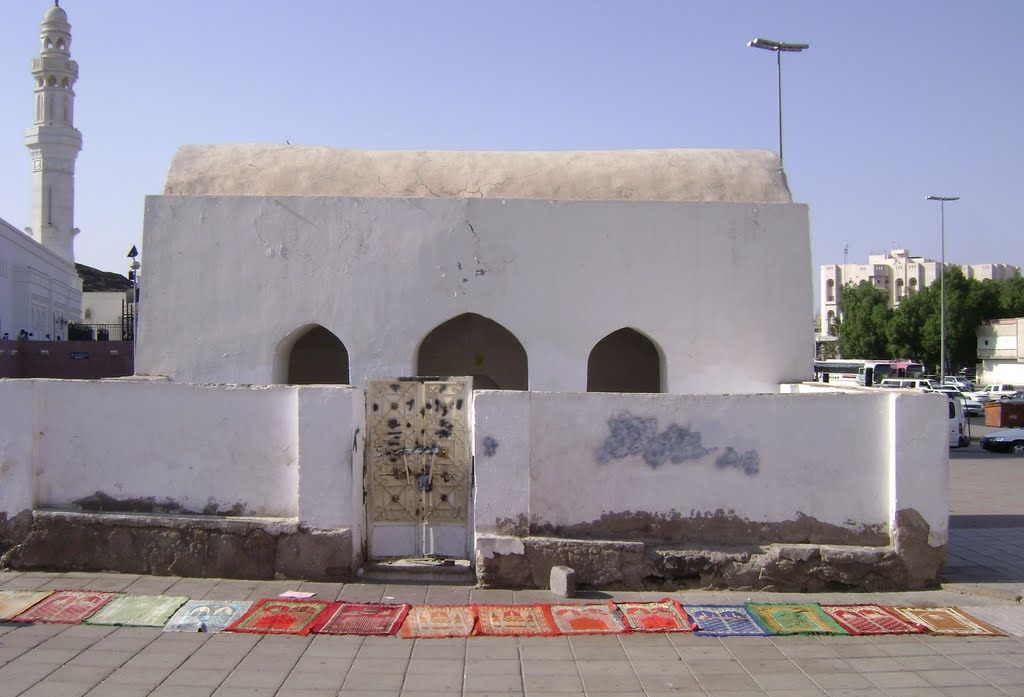
Salman al-Farisi
d. 33/35 H. in Madina Munawwara
radiya Allah anhu
.
Hadith from Shamail
t.b.d.
English
2. From naqshbandi.org
View on sunnah.org
This is a story of a seeker of Truth, the story of Salman the Persian, gleaned, to begin with, from his own words:
I grew up in the town of Isfahan in Persia in the village of Jayyan. My father was the Dihqan or chief of the village. He was the richest person there and had the biggest house.
Since I was a child my father loved me, more than he loved any other. As time went by his love for me became so strong and overpowering that he feared to lose me or have anything happen to me. So he kept me at home, a veritable prisoner, in the same way that young girls were kept.
I became devoted to the Magian religion so much so that I attained the position of custodian of the fire which we worshipped. My duty was to see that the flames of the fire remained burning and that it did not go out for a single hour, day or night.
My father had a vast estate which yielded an abundant supply of crops. He himself looked after the estate and the harvest. One day he was very busy with his duties as dihqan in the village and he said to me:
“My son, as you see, I am too busy to go out to the estate now. Go and look after matters there for me today.”
On my way to the estate, I passed a Christian church and the voices at prayer attracted my attention. I did not know anything about Christianity or about the followers of any other religion throughout the time my father kept me in the house away from people. When I heard the voices of the Christians I entered the church to see what they were doing.
I was impressed by their manner of praying and felt drawn to their religion. “By God,” I said, “this is better than ours. I shall not leave them until the sun sets.”
I asked and was told that the Christian religion originated in AshSham (Greater Syria). I did not go to my father’s estate that day and at night, I returned home. My father met me and asked what I had done. I told him about my meeting with the Christians and how I was impressed by their religion. He was dismayed and said:
“My son, there is nothing good in that religion. Your religion and the religion of your forefathers is better.”
“No, their religion is better than ours,” I insisted.
My father became upset and afraid that I would leave our religion. So he kept me locked up in the house and put a chain on my feet. I managed however to send a message to the Christians asking them to inform me of any caravan going to Syria. Before long they got in touch with me and told me that a caravan was headed for Syria. I managed to unfetter myself and in disguise accompanied the caravan to Syria. There, I asked who was the leading person in the Christian religion and was directed to the bishop of the church. I went up to him and said:
“I want to become a Christian and would like to attach myself to your service, learn from you and pray with you.”
The bishop agreed and I entered the church in his service. I soon found out, however, that the man was corrupt. He would order his followers to give money in chanty while holding out the promise of blessings to them. When they gave anything to spend in the way oRGod however, he would hoard it for himself and not give anything to the poor or needy. In this way he amassed a vast quantity of gold. When the bishop died and the Christians gathered to bury him, I told them of his corrupt practices and, at their request, showed them where he kept their donations. When they saw the large jars filled with gold and silver they said.
“By God, we shall not bury him.” They nailed him on a cross and threw stones at him.
I continued in the service of the person who replaced him. The new bishop was an ascetic who longed for the Hereafter and engaged in worship day and night. I was greatly devoted to him and spent a long time in his company.
(After his death, Salman attached himself to various Christian religious figures, in Mosul, Nisibis and elsewhere. The last one had told him about the appearance of a Prophet in the land of the Arabs who would have a reputation for strict honesty, one who would accept a gift but would never consume charity (sadaqah) for himself. Salman continues his story.)
A group of Arab leaders from the Kalb tribe passed through Ammuriyah and I asked them to take me with them to the land of the Arabs in return for whatever money I had. They agreed and I paid them. When we reached Wadi al-Qura (a place between Madinah and Syria), they broke their agreement and sold me to a Jew. I worked as a servant for him but eventually he sold me to a nephew of his belonging to the tribe of Banu Qurayzah. This nephew took me with him to Yathrib, the city of palm groves, which is how th e Christian at Ammuriyah had described it.
At that time the Prophet was inviting his people in Makkah to Islam but I did not hear anything about him then because of the harsh duties which slavery imposed upon me.
When the Prophet reached Yathrib after his hijrah from Makkah, I was in fact at the top of a palm tree belonging to my master doing some work. My master was sitting under the tree. A nephew of his came up and said:
“May God declare war on the Aws and the Khazraj (the two main Arab tribes of Yathrib). By God, they are now gathering at Quba to meet a man who has today come from Makkah and who claims he is a Prophet.” I felt hot flushes as soon as I heard these words and I began to shiver so violently that I was afraid that I might fall on my master. I quickly got down from the tree and spoke to my master’s nephew. “What did you say? Repeat the news for me.”
My mastcr was very angry and gave me a terrible blow. “What does this matter to you? Go back to what you were doing,” he shouted.
That evening, I took some dates that I had gathered and went to the place where the Prophet had alighted. I went up to him and said:
“I have heard that you are a righteous man and that you have companions with you who are strangers and are in need. Here is something from me as sadaqah. I see that you are more deserving of it than others.”
The Prophet ordered his companions to eat but he himself did not eat of it.
I gathered some more dates and when the Prophet left Quba for Madinah I went to him and said: “I noticed that you did not eat of the sadaqah I gave. This however is a gift for you.” Of this gift of dates, both he and his companions ate.
The strict honesty of the Prophet was one of the characteristics that led Salman to believe in him and accept Islam.
Salman was released from slavery by the Prophet who paid his Jewish slave-owner a stipulated price and who himself planted an agreed number of date palms to secure his manumission. After accepting Islam, Salman would say when asked whose son he was:
“I am Salman, the son of Islam from the children of Adam.”
Salman was to play an important role in the struggles of the growing Muslim state. At the battle of Khandaq, he proved to be an innovator in military strategy. He suggested digging a ditch or khandaq around Madinah to keep the Quraysh army at bay. When Abu Sufyan, the leader of the Makkans, saw the ditch, he said, “This strategem has not been employed by the Arabs before.”
Salman became known as “Salman the Good”. He was a scholar who lived a rough and ascetic life. He had one cloak which he wore and on which he slept. He would not seek the shelter of a roof but stayed under a tree or against a wall. A man once said to him: “Shall I not build you a house in which to live?” “I have no need of a house,” he replied.
The man persisted and said, “I know the type of house that would suit you.” “Describe it to me,” said Salman.
“I shall build you a house which if you stand up in it, its roof will hurt your head and if you stretch your legs the wall will hurt them.”
Later, as a govenor of al-Mada’in (Ctesiphon) near Baghdad, Salman received a stipend of five thousand dirhams. This he would distribute as sadaqah. He lived from the work of his own hands. When some people came to Mada’in and saw him working in the palm groves, they said, “You are the amir here and your sustenance is guaranteed and you do this work!”
“I like to eat from the work of my own hands,” he replied. Salman however was not extreme in his asceticism. It is related that he once visited Abu ad-Dardaa with whom the Prophet had joined him in brotherhood. He found Abu adDardaa’s wife in a miserable state and he asked, “What is the matter with you.”
“Your brother has no need of anything in this world*” she replied.
When Abu ad-Dardaa came, he welcomed Salman and gave him food. Salman told him to eat but Abu adDardaa said, “I am fasting.”
“I swear to you that I shall not eat until you eat also.”
Salman spent the night there as well. During the night, Abu ad-Dardaa got up but Salman got hold of him and said:
“O Abu ad-Dardaa, your Lord has a right over you. Your family have a right over you and your body has a right over you. Give to each its due.”
In the morning, they prayed together and then went out to meet the Prophet, peace be upon him. The Prophet supported Salman in what he had said.
As a scholar, Salman was noted for his vast knowledge and wisdom. Ali said of him that he was like Luqman the Wise. And Ka’b al-Ahbar said: “Salman is stuffed with knowledge and wisdomÑan ocean that does not dry up.” Salman had a knowledge of both the Christian scriptures and the Qur’an in addition to his earlier knowledge of the Zoroastrian religion. Salman in fact translated parts of the Qur’an into Persian during the life-time of the Prophet. He was thus the first person to translate the Qur’an into a foreign language.
Salman, because of the influential household in which he grew up, might easily have been a major figure in the sprawling Persian Empire of his time. His search for truth however led him, even before the Prophet had appeared, to renounce a comfortable and affluent life and even to suffer the indignities of slavery. According to the most reliable account, he died in the year thirty five after the hijrah, during the caliphate of Uthman, at Ctesiphon. ↑
Burial Place & Location
Location:
Masjid Salman al-Farisi (Arabic: مسجد سلمان الفارسي) is part of a group of mosques known as al-Masajid al-Sab’a (Arabic: المساجد السبعة) or The Seven Mosques, located north-west of the Haram.
Map –  Show on overview map
Show on overview map
Bio: Sayyid al-Hasan al-Anwar | السيد حسن الأنور
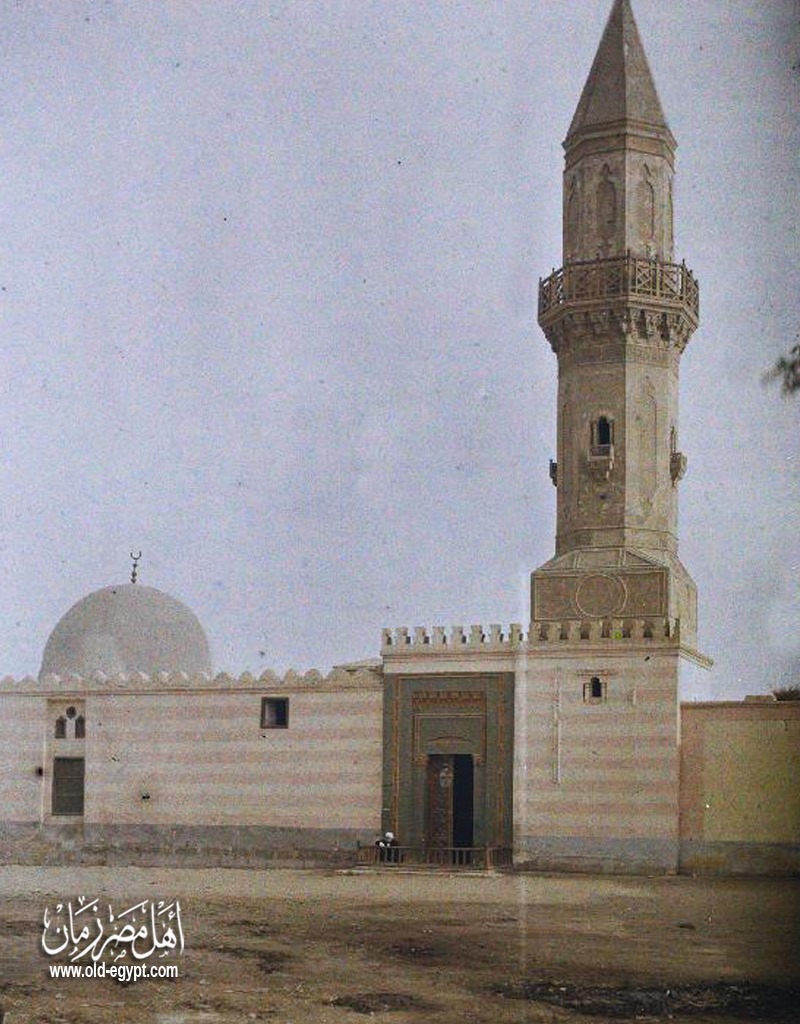
Sayyid Al Hasan al-Anwar
سيدي حسن الأنور بن زيد بن الابلج بن الحسن بن سيدنا علي بن ابي طالب رضي الله عنه وأرضاه .d. in Cairo
Bio: Sayyid Hasan al-Anwar | السيد حسن الأنور
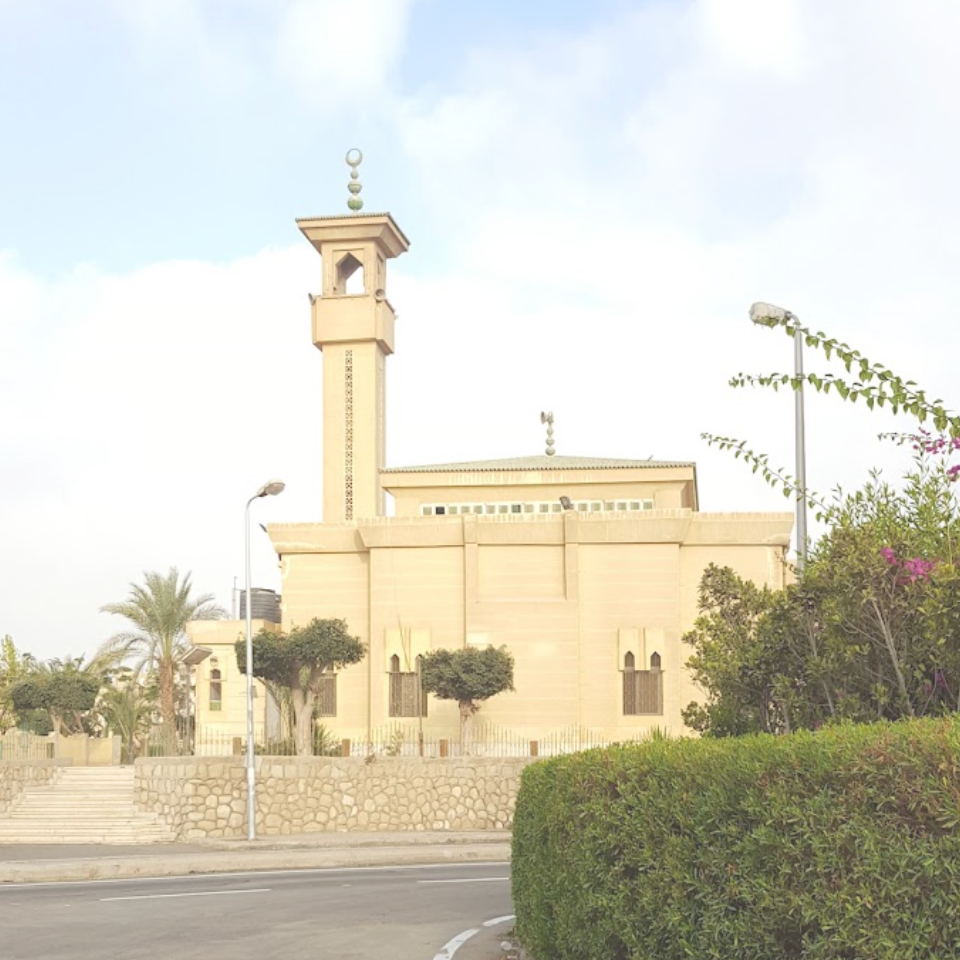
Sayyid Al Hasan al-Anwar
السيد حسن الأنورd. in Cairo
Father of Sayyida Nafisa, and grandson of Sayyiduna Ali b. Abi Talib
radiya Allah 'anhum
Bio: Sayyida Fatima bint Hasan al-Anwar | السيدة فاطمة بنت حسن الأنور
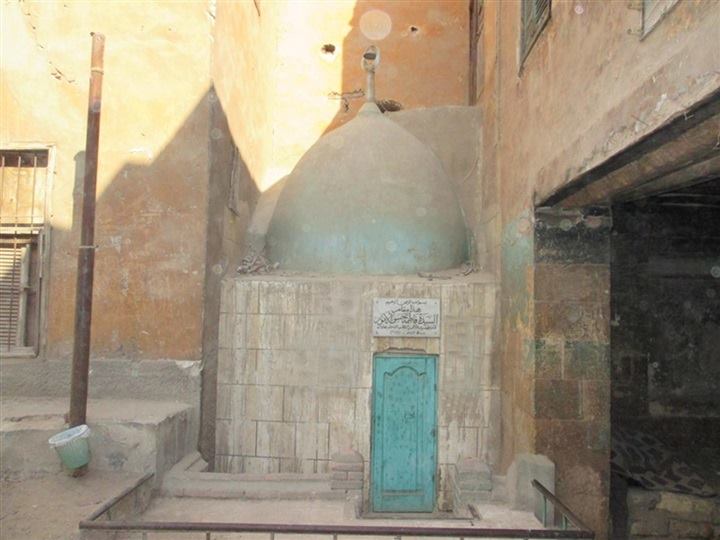
Sayyida Fatima bint Hasan al-Anwar
السيدة فاطمة بنت الإمام حسن الأنورd. in Cairo
Sister of Sayyida Nafisa - radiya Allah 'anhuma
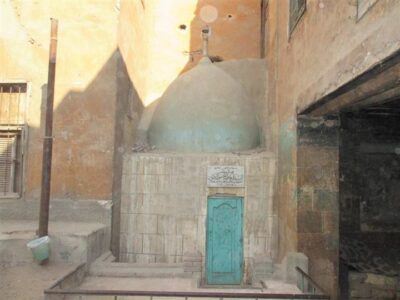
هى : السيدة فاطمة بنت السيد الحسن الأنور بن السيد زيد الأبلج بن سيدنا الحسن السبط بن سيدنا الإمام على بن أبى طالب كرم الله وجهه ورضي الله عنهم أجمعين ، ابن سيدة نساء العالمين السيدة فاطمة الزهراء بنت حبيب الله نبينا وسيدنا محمد بن عبد الله صلى الله عليه وآله وصحبة وسلم .
ومن ألقابها أيضاً : فاطمة الصغرى .
وربما لا يعلم الكثيرون شيئا عن شقيقة السيدة نفيسة العلوم رضي الله عنها السيدة فاطمة بنت السيد الحسن الأنور ، حيث مقامها على يسار السالك إلى مقابر سيدي عقبة بن عامر الجهني ، فلا يخرج أحدا ولا يدخل إلى درب سيدنا عقبة إلا إذا مر عليها أهل ذاك الحي جميعهم برهم وفاجرهم فهم رحمات الله في الأرض ، وقبل دخول البوابة المواصلة لهذا المسجد تجد مقبرة صغيرة مربعة الشكل بها مقصورة مصنوعة من الألمونيوم بها ضريح كتب عليه هذا مقام السيدة فاطمة حسن الأنور رضي الله تعالى عنها ، وهذه المقبرة تنزل لها بعدة درجات ولها باب قبل الدخول إلى مسجد سيدي عقبة بن عامر الجهني والباب الأخر من الشارع ويعلوها قبة صغيرة .
وكان حوش السيدة فاطمة بنت السيد الحسن الأنور شقيقة السيدة نفيسة رضي الله عنهم أجمعين ، وهى على باب بوابة حوش سيدنا عقبة بن عامر الجهني رضي الله عنه ، كان مكان تجمع الحجيج والمحمل ، حيث كان ينتهي المطاف بحجيج أهل مصر وحجيج الشمال الإفريقي فيقفون زائرين للسيدة فاطمة بنت السيد الحسن الأنور ، ثم يعبرون بوابة سيدنا عقبة بن عامر ، فيكون أخر من زار أهل مصر من الأولياء قبل عبورهم الصحراء إلى سيدنا النبي صلى الله عليه وآلة وصحبة وسلم ومكة المكرمة هم أهل بيته وصحابته ، وكان الحجيج يجتمعوا أمام مقامها بعد أخذ المحمل الشريف المتوجه للحجاز وذلك بعد زيارة مقام سيدنا الحسين رضي الله عنه وانتهاء زفة المحمل عند مولانا الحسين وقراءة الفاتحة ، فكان المصريون أذكياء وعلى قدر عالي من الفطنة وعلى فهم يعرفون أن سيدنا الحسين باب سيدنا النبي صلى الله عليه وسلم ، والله يقول {وَأْتُوا الْبُيُوتَ مِنْ أَبْوَابِهَا} فكانوا ينهون عبادتهم عند مولانا الحسين رضي الله عنه ومنها المحمل الشريف ، ثم يغادر المحمل الشريف إلى مكان تجمع الحجيج أمام السيدة فاطمة بنت السيد الحسن الأنور رضي الله عنهما ، ولا ننسى أن المحمل الشريف يقضى بجوار مولانا الحسين اغلب وقت العام نظرا لمتطلبات صناعته هناك ، فكانت السيدة فاطمة والسيد عقبة بن عامر الصحابي الجليل ، هم أخر من يزورهم أهل مصر قبل التوجه للحجاز المبارك .
From FB of Dr. Ali Gomaa
Bio: Sayyida Nafisa | السيدة نفيسة
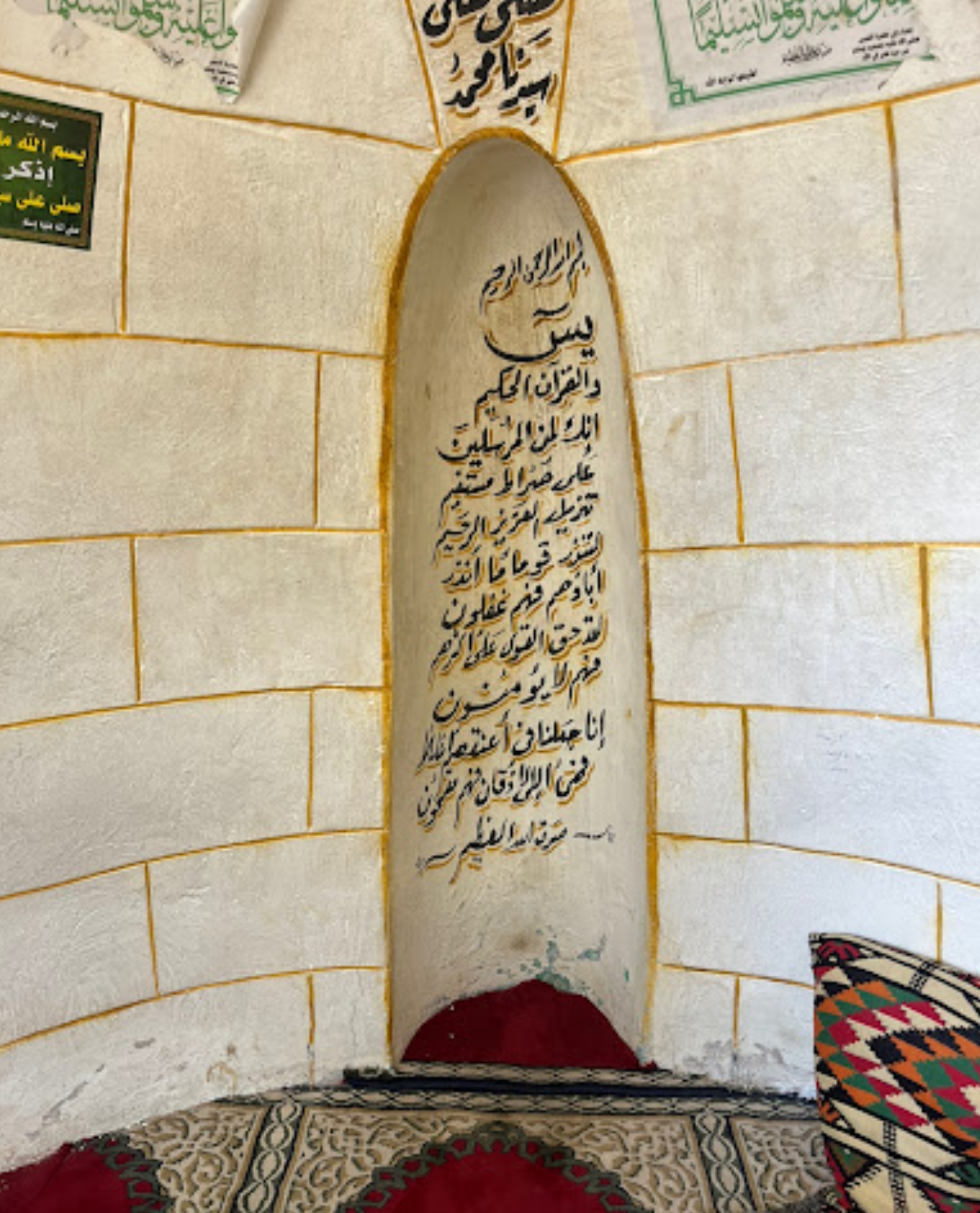
Sayyida Nafisa
السيِدة نفيسةb. 145 H. in Makka – d. 208 H. in Cairo
great grand daughter of Sayyiduna al-Hasan b. Ali b. Abi Talib
radiya Allah 'anhum
Bio: Sayyida Sakina bint Al-Husayn | السيدة سكينة بنت الحسين
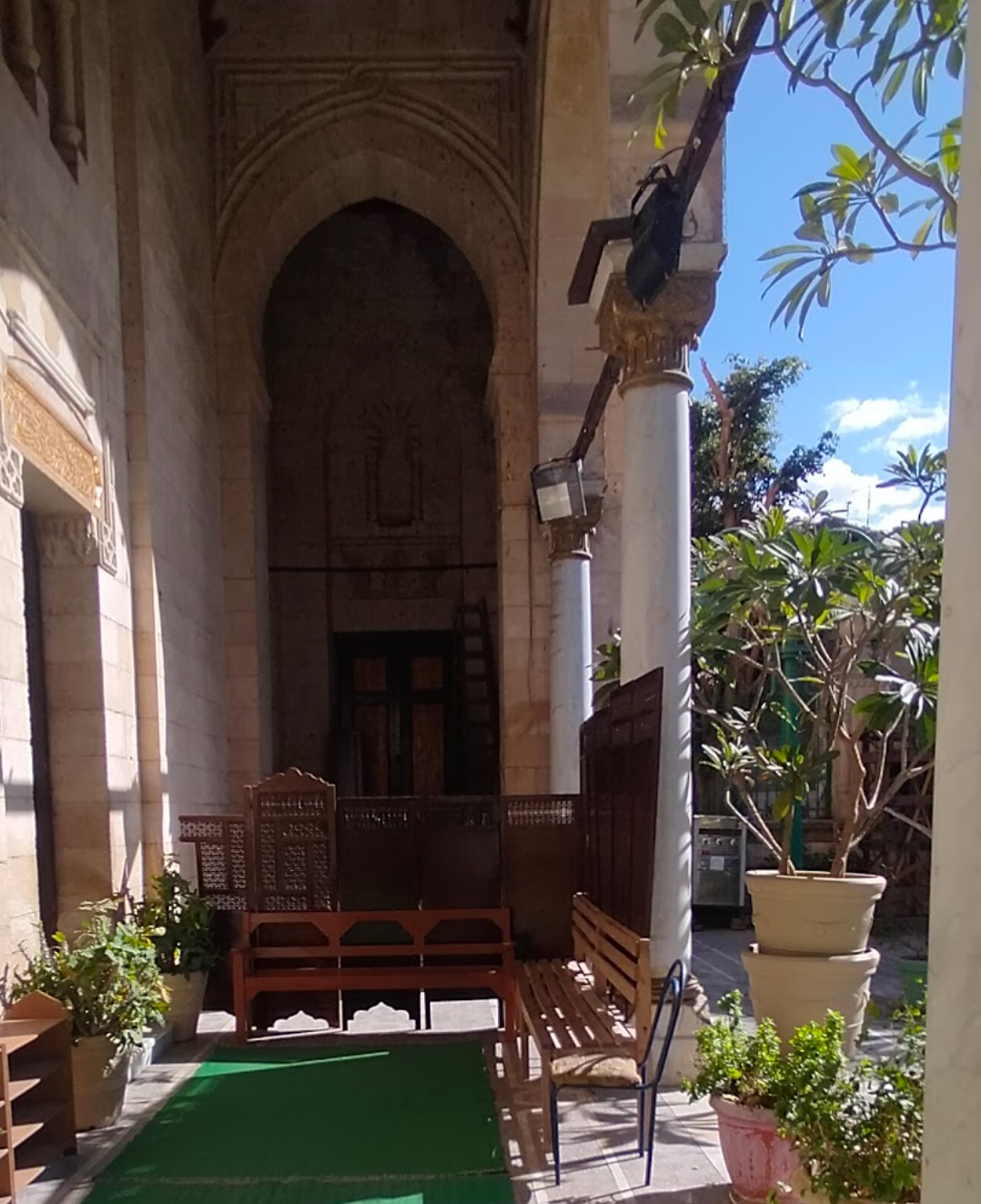
Sayyida Sakina bint Al-Husayn
السيدة سكينة بنت الحسينb. 47? H. in Madina – d.117 H. in Madina
radiya Allah 'anha
Bio: Sayyida Zaynab bint ‘Ali | السيدة زينب بنت علي
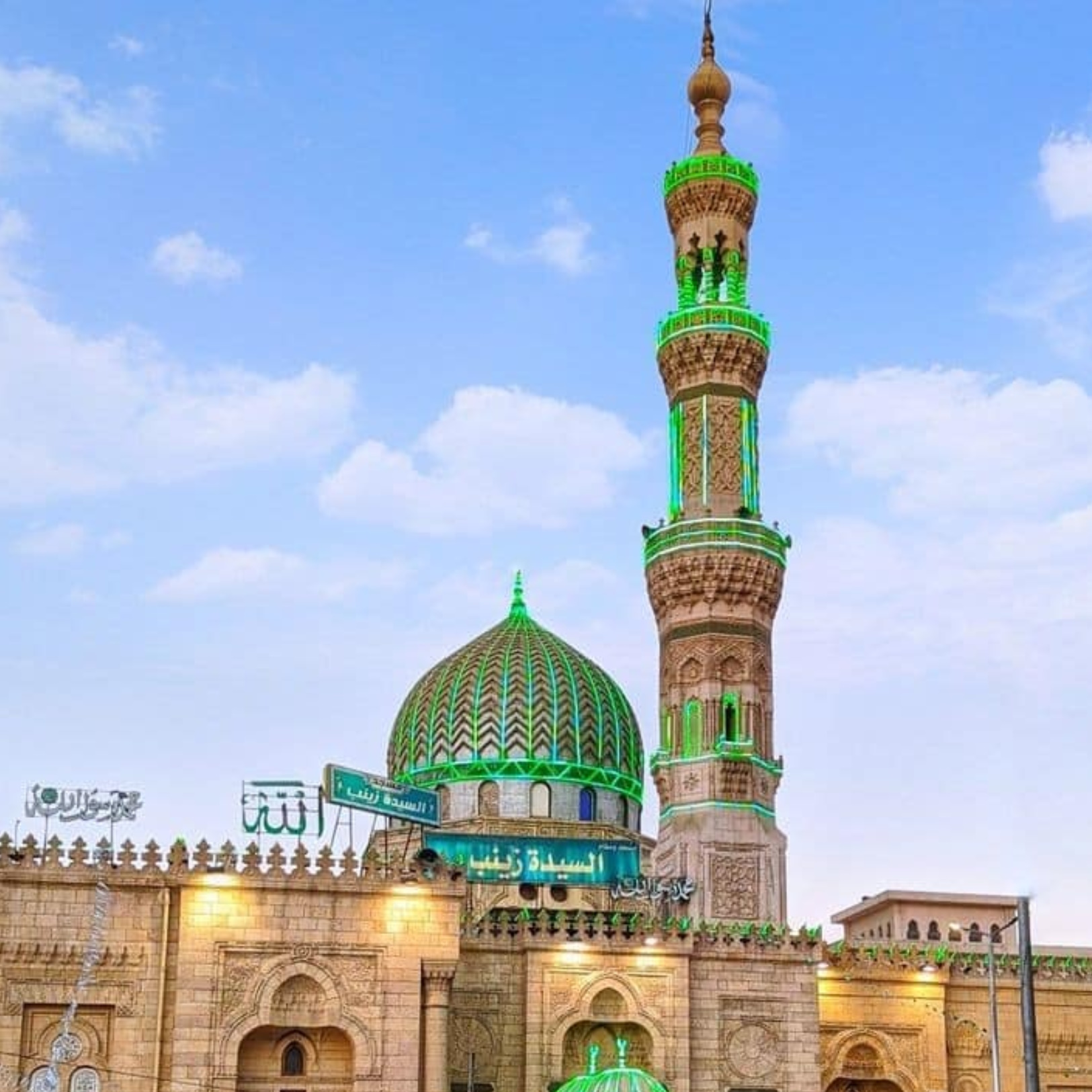
Sayyida Zeynab bint 'Ali
السيدة زينب بنت علي بن أبي طالبb. 6 H. in Madina – d.62 H. in Cairo
Daughter of Ali b. Abi Talib
radiya Allah 'anhuma
Bio: Sayyidi al-Husayn b. ‘Ali | السيد الحسين بن علي بن أبي طالب Copy
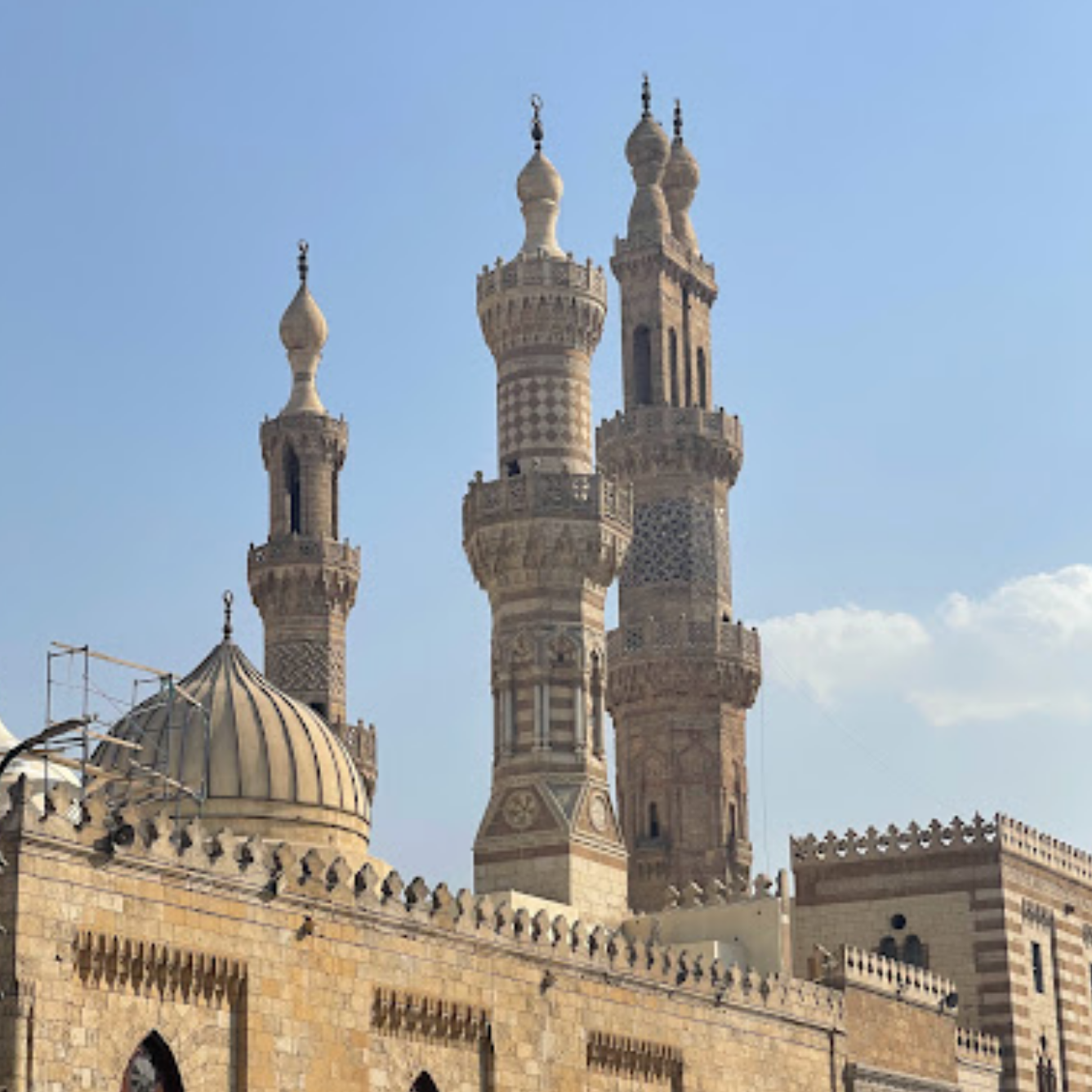
Sayyid Al-Husayn b. 'Ali b. Abi Talib
السيد الحسين بن علي بن أبي طالبb. 4 H. in Madina – d.61 H. in Karbala, Iraq
radiya Allah 'anhu
Bio: Sayyiduna al-Husayn b. ‘Ali | السيد الحسين بن علي بن أبي طالب
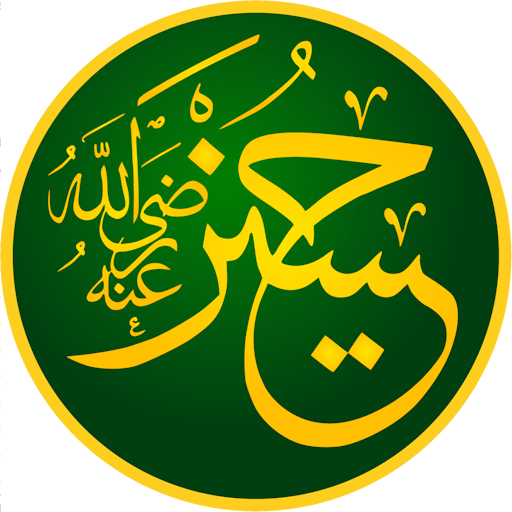
Sayyiduna Al-Husayn b. 'Ali b. Abi Talib
السيد الحسين بن علي بن أبي طالبb. 4 H. in Madina – d.61 H. in Karbala
radiya Allah 'anhu
Bio: Sh Muhammad al-Hashimi
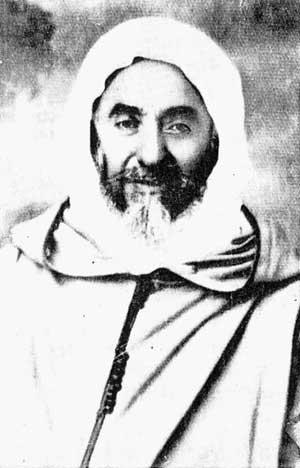
Shaykh Muhammad al-Hashimi al Hasani al-Shadhili
b. 1298 – d. 1381 H. (1880–1961 CE) in Damascus (CE)
Bio: Sh-. `Abd al-Rahman al-`Attar al-Madani

Sayyidi `Abd al-Rahman al-`Attar al-Madani al-Hasani al-Idrisi
(الشيخ عبد الرجمن المدني العَطَّار الحسني (الملقب بالزَّيات
d. around 600 H. in Madina al-Munawwara
radiya Allah anhu
Bio: Sh. ‘Ali Jamal al-‘Amrani
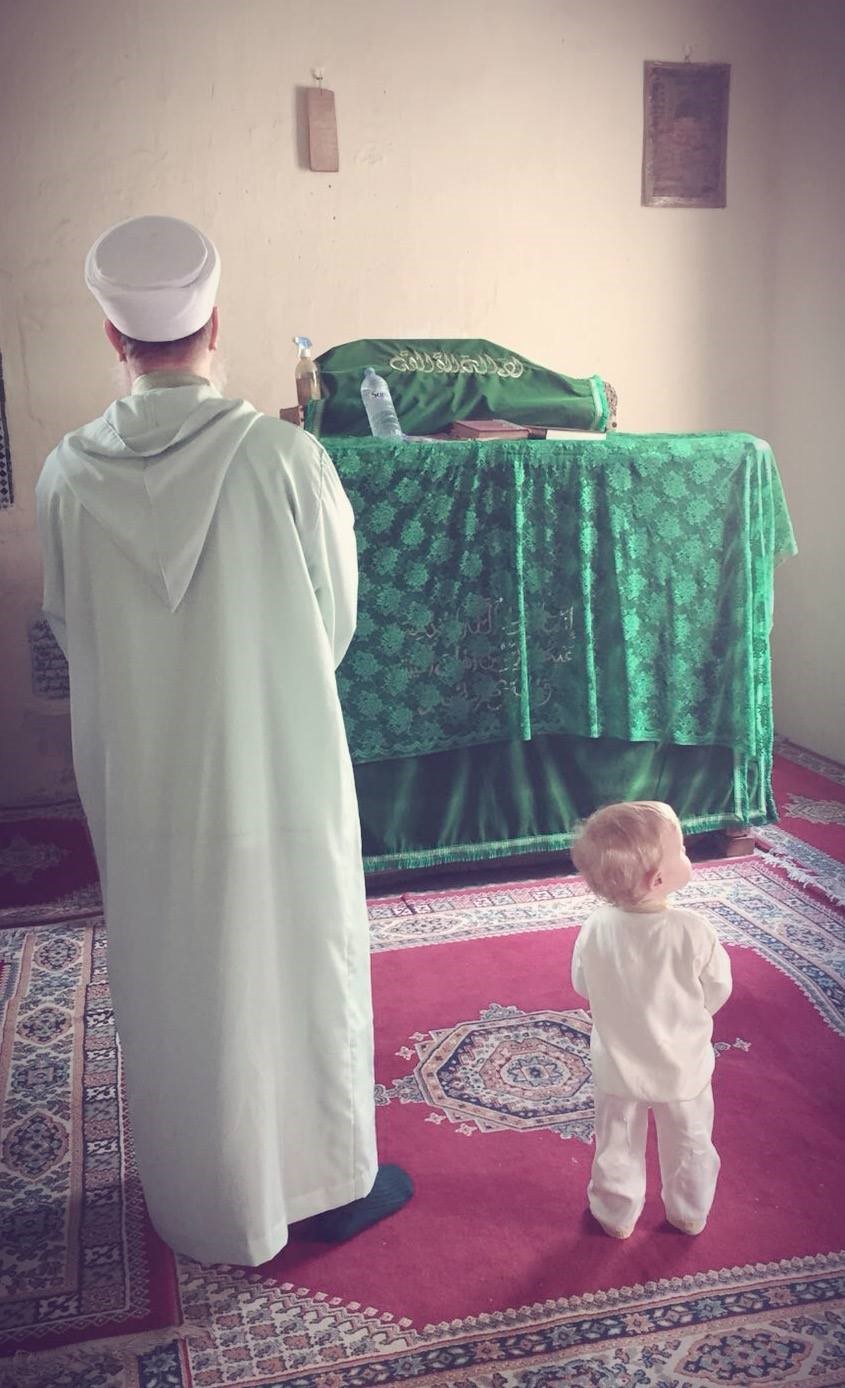
Sayyidi Shaykh ´Ali al-Jamal al-‘Amrani al-Hasani
الشيخ السيد علي بن عبد الرحمن العمراني الجمل
d. 1194 H. in Fas
qaddasa Allah sirrahu
﷽
His Shaykh was Sayyidi Sh. al-‘Arabi ibn Ahmad ibn ‘Abd Allah
He passed on his secrets to Sayyidi Imam `Arabi al-Dirqawi
– may Allah be pleased with them all
English
Biography
t.b.d.
From Kuhin: Tabaqat al-Shadhiliyya
Ref: Hasan b. Muhmmad al-Kuhan al-Fasi: Tabaqat al-Shadhiliyya al-Kubra
عربي
From alaw1934
علي الجمل العمراني
في ديسمبر 22, 2017
الشيخ العارف بالله، الدال على الله، شيخ الطريقة، وإمام أهل الحقيقة، معدن المواهب الربانية، ومنبع المعارف الإلهية، قطب الأنام، وغياث الإسلام، الغوث الجامع، والبحر الواسع، الكبريت الحمر، والحجة الأشهر؛ أبو الحسن سيدي علي بن عبد الرحمن بن محمد بن علي بن إبراهيم بن عمران الشريف الحسني الإدريسي العمراني من شرفاء بني عمران أهل قبيلة بني حسان؛ الملقب بالجمل لكونه وجد ناقة أو بعير راقدا ببعض طرق بفاس؛ فرفعه ووضعه خارج الطريق. فرآه بعض الناس فقال: هذا هو الجمل. فاشتهر بذلك، وهو ملقب عند ملائكة الرحمن بالجمَال.
كان رحمه الله أولا بفاس متصلا بالمخزن، ثم خرج منها إلى تونس على عهد السلطان أبي عبد الله محمد؛ المدعو: ابن عربية. ابن أمير المؤمنين مولانا إسماعيل خوفا على نفسه من أشرافها، إذ كان ممن تولى أمرهم من قبل السلطان ولحقتهم الإذاية منه. فلقي بتونس مشايخ انتفع بهم، وبعثوه إلى وازان عند الشيخ مولاي الطيب الوازاني رضي الله عنه؛ فلقيه بوازان عام ثلاثة وخمسين ومائة وألف، ثم بعثه مولاي الطيب إلى فاس، فقدم عليها؛ وذلك في السنة المذكورة، وقرأ بها ما شاء الله من التصوف على الشيخ أبي عبد الله جسوس، وصحب العارف الكبر أبا المحامد سيدي العربي بن أحمد ابن عبد الله معن الأندلسي، ولزم خدمته مدة من ستة عشرة عاما، حتى انتفع به غاية النفع، وسمع منه الأسرار ما لا يكيف ولا ينحصر.
وكان قد فتح له أولا على يد شريف كبير السن حسن الوجه من ناحية المشرق له: عبد الله. وجده بتطوان وصحبه بها سنتين، ثم لما توفي شيخه سيدي العربي؛ بني لنفسه زاوية بالرميلة حيث ضريحه الآن، وكثر أتباعه وخدامه.
وكان رضي الله عنه آخذا بالشريعة في جميع أحكامها، لا يتعدى أمرها، ويلبس تارة فاخر الثياب، وتارة رثها، وينتعل تارة بالنعل المعروف بالشربيل، وتارة يحفي قدمه بالكلية، ويمد يده بالسؤال لقوم مخصوصين بلا إلحاح ولا إلحاف.
وأكثر ما تراه جالسا في القرويين بالباب المظلم لناحية المظلم لناحية باب فندق سيدي عبد المجيد، دائم الفكرة، كثير العْبرة والعَبْرة، وإذا كلمته؛ وجدت منه بحرا زخارا بالعلم والعرفان، وكان من أجل شيوخ الطريق من أهل تجريد الظاهر والباطن معا؛ متقشفا ذاكرا خاضعا متواضعا، خاليا عن الدعوى محيدا عن أهلها، مولعا بالوحدة وكتبها، وقوانين أهلها، وله اليد الطولى في أصولها وفروعها وحقيقتها، على طريقة الشيخ أبي الحسن الششتري ونظرائه من الأكابر.
وكان مستغرق الأوقات في رؤية النبي صلى الله عليه وسلم يقظة ومناما حتى كان يقول: “مهما خطر ببالي رسول الله صلى الله عليه وسلم وجدته هو وأصحابه العشرة الكرام البررة حاضرين بين يدي؛ حسا لا معنى، ونتكلم معهم، ونأخذ العلم والعمل من عين العلم والمل صلى الله عليه وسلم”.
وكان تلميذه العارف بالله مولاي العربي الدرقاوي يقول فيه : “والله ما كان شيخنا مولاي علي الجمل إلا أكبر استغراقا في ذات رسول الله صلى الله عليه وسلم من أبي العباس المرسي!”. وقال في رسائله: “ترجع لي والله أعلم أنه أقوى من سيدي المرسي بما رأيت منه من الاستغراق في رؤيته صلى الله عليه وسلم ومخاطبته إياه”.
وكان من أهل التصريف في وقته، حتى قيل: إنه كان يُزَطّطُ القوافل بهمته، وربما كان يخرج لباب المدينة ويأخذ من أرباب القافلة درهما لكل جمل من أجمالها، فيذهبون ويربحون في سلعتهم ويرجعون للبلد سالمين غانمين. واتفق في يوم من الأيام أن بعض أرباب القافلة تشطر معه في جمل؛ فلم يعطه عليه شيئا. فخرج فيهم اللصوص ونبهوا لهم ذلك الجمل وحده، لم ينهبوا لهم غيره، وشاع ذلك في البلد، ولم يتشطر معه بعد ذلك أحد.
وأدرك رضي الله عنه القطبانية العظمى، بل عاش فيها جل عمره؛ على ما ذكره تلميذه مولاي العربي في رسائله؛ ونصه: “وأستاذنا رضي الله عنه قد كان يسأل القواربط بفاس البالي عمره الله من حانوت إلى خانوت كالمضطر الكبير، مع أنه قد عاش غوثا جل عمره، وقد تعدى عمره ثامنين سنة”. هـ.
وكان كما ذكره أيضا تلميذه المذكور يعرف اربعا وعشرين طريقا في الحكمة، كل طريق منها تقيم الساعي لدار الملك، ومع ذلك كان يسأل القواريط من الناس بالأسواق ويده ترتعش من شدة الكبر، ومن أراد أن يعرف مقامه في التحقيق، وينطق في علو مرتبته في الطريق؛ فليطالع كتابه الذي ألفه؛ فإنه عزيز الوجود، وفيه من الفوائد، خرق العوائد.
وقد كان الشيخ سيدي عبد الواحد الدباغ رضي الله عنه يقول: “لا يعرف سيدي عليا إلا من كان هو سيدي علي!”، أي: من كان في مقامه. ويقول أيضا: “كان سيدي علي فقيها كبيرا، عالما شهيرا في علم الضدين”، يعني: الحقيقة والشريعة، والحرية والعبودية، والجمع والفرق، والسكر والصحو، والسلوك والجذب، والفناء والبقاء … وما أشبه ذلك.
وقد تربى به وتأدب، وتخرج وتهذب، جماعة من الأكابر؛ أجلهم: الفقيه الأستاذ الأنور، القطب العارف الأشهر؛ أبو المحامد مولاي العربي بن أحمد الدرقاوي الشريف الحسني الزروالي. وقد بالغ في الثناء على شيخه المذكور في مواضع من رسائله رضي الله عنهما، ونفعنا بهما. وكان أول لقاء به في زاويته بالرميلة إذ اقال مولانا العربي الدرقاوي رضي الله عنه:
وكان من عادتي أن لا أقوم على أمر من الأمور جليلاً أو حقيرًا إلاَّ بعد الإستخارة النبوية فاستخرت الله في تلك الليلة فبت أخوض في صفاته أي الشيخ المربي كيف هو؟ و كيف تكون ملاقاتي معه؟ حتى لم يأخذني النوم تلك الليلة و لـمَّا قصدته, أي الشيخ أبو الحسن علي الجمل, لزاويته بالرميلة التي بين المدن عدوة الوادي من جهة القبلة شرفها الله و هي التي ضريحه بها الآن مشهور مقصودٌ للزيارة فدققت الباب فإذا به قائمٌ يشطب أي يكنس الزاوية إذ كان لا يترك تشطيبها بيده المباركة كل يوم مع كبر سنه و علو شأنه فقال أيش تريد؟ قلت أريد ياسيدي أن تأخذ بيدي لله فقام معي قومةً عظيمةً و لبَّس الأمر عليَّ و أخفى عني حاله و صار يقول من قال لك هذا؟ و من أخذ بيدي أنا حتَّى آخذ بيدك؟ و زجرني و نهرني و كل ذلك اختبارًا لصدقي فوليت من عنده قال فاستخرت الله تلك الليلة أيضًا فصليت الصبح و قصدته لزاويته أيضًا فوجدته على حاله يشطب الزاوية رضي الله عنه فدققت الباب ففتح لي و قلت تأخذ بيدي لله؟ فقبض علي يدي و قال لي مرحبًا بك و أدخلني لموضعه بالزاوية و فرح بي غاية الفرح و سُـرَّ بي غاية السرور فقلت له يا سيدي كم لي أُفتش على شيخ؟! فقال لي و أنا أفتش على مريد صديق!!! فلقنني الوِردَ و قال لي امش و اجيء أي تردد علي بلا حرج أو تعالى لتزورني بدون حرج فكنت أمشي و أجيء كلَّ يوم فيذكرني مع بعض الإخوان من أهل فاس حرسها الله من كلِّ بأس
توفي صاحب الترجمة رضي الله عنه بفاس عشية يوم السبت تاسع وعشرين ربيع الأول سنة أربع وتسعين، وقيل: سنة ثلاث وتسعين ومائة وألف 1193هـ، /1779م، عن مائة وستة أعوام، أو خمسة؛ على ما في فهرسة الكوهن. وحكى بعضهم عن ولده سيدي محمد الشريف أنه ولده وهو من مائة وثمان عشرة سنة والله أعلم.
ودفن من الغد وهو: يوم الأحد بزاويته التي بحومة الرميلة من عدوة فاس الأندلس، قرب مسجد الشيخ سيدي أبي مدين الغوث نفعنا الله به، وبنيت عليه هناك قبة، وقبره بها مشهور معروف مزار، عليه دربوز من خشب، ودفن معه بها وبما اتصل بها جماعة من أصحابه وأصحابهم رضي الله عنهم.
قال سيدي علي الجمل رضي الله عنه:
من صفات كمال الولاية لله أن لا يحتاج الولي إلى شيء آخر غير الحال الذي قلده الله له في أي لحظة كانت وليس لديه رغبة أخرى بخلاف الإرادة الإلهية ففي أحد الأيام كان الشيخ العارف أبو العباس أحمد اليماني نسأل الله أن ينفعنا به جالسا مع بعض فقرائه و كان الجدل حول حقيقة الولاية و كان لكل واحد منهم رأي واستمر الخلاف وقرروا أن يعرضوا المسألة على الشيخ و عرض كل فقير رؤيته لحقيقة الولاية واستمع الشيخ دون أن يؤكد كلام أي منهم وعندما رأوا أنهم عاجزون عن الوصول للمقصود قالوا: “يا سيدي نأمل من الله و منكم أن تبلغونا حقيقة الأمر ما هي حقيقة الولاية؟”, فأجاب الشيخ: “صاحب الولاية عندما يجلس في الظل فإنه لا يصبو إلى أن يجلس تحت الشمس وعندما يجلس تحت الشمس فإنه لا يصبو إلى أن يجلس في الظل”.
وقال رضي الله عنه في كتابه الرسائل في التصوف (مخطوط خاص): سبحان من هيأ أقواما لخدمته وأقامهم فيها, وهيأ أقواما لمحبته وأقامهم فيها , أهل الخدمة تجلى لهم الحق بصفة الجلال والهيبة فصاروا مستوحشين من الخلق قلوبهم شاخصة لما يرد عليها من حضرة الحق قد نحلت أجسادهم وأصفرت ألوانهم وخمصت بطونهم بالشوق ذابت أكبادهم وقطعوا الدياجي بالبكاء والنحيب واستبدلوا الدنيا بالمجاهدة في الدين ورغبوا في جنة عرضها السموات والأرض أعدت للمتقين وأهل المحبة تجلى لهم الحق بصفة الجمال والمحبة وسكروا بخمر لذيذ القربة شغلهم المعبود عن أن يكونوا من العباد ولا من الزهاد اشتغلوا بالظاهر والباطن وهو الله فحجبوا عن كل ظاهر وباطن زهدوا في التنعم والأنعام واشتغلوا بمشاهدة الملك العلام وقد قيل في حقهم :
نسيم الوصل هب على الندامى فأسكرهم وما شربوا مداما
ومالت منهم الأعطاف ميلا لأن قلوبهم ملئت غراما
و ناداهم عبادي لا تناموا ينال الوصل من هجر المناما
ينال الوصل من سهر الليالي على الأقدام من لزم القياما
وما مقصودهم جنات عدن ولاالحور الحسان ولا الخياما
سوى نظر الجليل فذا مناهم فيا بشرى لهم قوما كراما
من مؤلفاته:
– نصيحة المريد في طريق أهل السلوك والتجريد ويسمى أيضاً اليواقيت الحسان في تصريف معاني الإنسان.
– الرسائل في التصوف (مخطوط خاص)
المصادر
– كتاب المقصد الأحمدي “المقصد الأحمد في ذكر سيدنا ابن عبد الله أحمد” للعلامة الطيب القادري
– سلوة الأنفاس و محادثة الأكياس بـمن أقبر من العلماء و الصلحاء بفاس
ترجم له في “الروضة المقصودة”، و”سلوك الطريق الوارية”، و”إمداد ذوي الاستعداد” وغيرها.
الأعلام السابقين
تعليقا
From ghrib.net
بسم الله الرحمن الرحيم
سيدي علي بن عبد الرحمن العمراني الجمل: ت 1194 ه
اسمه ونسبه:
هو الإمام الجليل الشيخ العارف بالله، الدال على الله، شيخ الطريقة وإمام أهل الحقيقة، أبو الحسن سيدي علي بن عبد الرحمن بن محمد بن علي بن إبراهيم بن عمران الشريف الحسني الإدريسي العمراني من شرفاء بني عمران أهل قبيلة بني حسان؛ لُقب بالجمل، والأصل في لقبه بالجمل كما قال مولاي العربي الدرقاوي: “أنه كان في حال صغره قويا شديدا، وكان ذات يوم سائرا ببعض طرق فاس، إذ وجد بها ناقة أو بعيرا صغيرا راقدا، فرفعه ووضعه خارج الطريق، فرآه بعض الناس حين فعل ما فعل فقال: هذا هو الجمل، فاشتهر رحمه الله بالجمل عند أهل فاس، فهذا هو السبب في لقبه بسيدي علي الجمل”.
علمه وأخلاقه:
كان الشيخ سيدي عبد الواحد الدباغ يقول: “لا يعرف سيدي عليا إلا من كان هو سيدي علي”،[3] أي لا يعرفه حق المعرفة إلا من بلغ مرتبته.
ويقول مولاي العربي الدرقاوي: “كان بحرا لا ساحل له؛ لأن علمه كان أحلى من السكر وعمله كان أمرَّ من الحنظل، إذ كان دائما يقول كلام ولي الله تعالى سيدي أبي المواهب التونسي رضي الله عنه: من ادعى شهود الجمال قبل تأدبه بالجلال أرفضه فإنه دجال”،[4] ويقول الشيخ سيدي عبد الواحد الدباغ: “كان سيدي علي فقيها كبيرا، عالما شهيرا في علم الضدين، يعني: الحقيقة والشريعة، والحرية والعبودية، والجمع والفرق، والسكر والصحو، والسلوك والجذب، والفناء والبقاء… وما أشبه ذلك”.
وكان رحمه الله متواضعا خيِّرا يقوم بأعمال الزاوية بمفرده، وفي ذلك يقول مولاي العربي الدرقاوي عنه: “لما قصدته لزاويته بالرميلة التي بين المدن عدوة الوادي لي من جهة القبلة -شرَّفها الله- وهي التي ضريحه بها الآن مشهور مقصود للزيارة فدققت الباب فإذا به قائم يُشطب الزاوية إذ كان لا يترك تشطيبها بيده المباركة كل يوم مع كبر سنه وعلو شأنه”.
مؤلفاته:
• نصيحة المريد في طريق أهل السلوك والتجريد ويسمى أيضاً اليواقيت الحسان في تصريف معاني الإنسان. وهو مطبوع، طبعته دار الكتب العلمية، بتحقيق: عاصم إبراهيم الكيالي الحسيني، سنة 2005م/1426هـ.
• أنوار الطريقة وأسرار الحقيقة.
• الرسائل في التصوف، (مخطوط).
من رسائله :
الرسالة الأولى
في تسليم الأمور كلها لمولاها
قال : مهما تركت الأمور لمولاها يتصرف فيها كما يشاء ، يردّها – سبحانه – إليك ،
ويمكنك من زمامها ، ويأمرها تكون عند أمرك ونهيك ، تتصرّف فيها بمشيئتك ،
حتى لا يكون منها إلا ما تريد ، ومهما تعرضت للأمور وأردتها أن تكون عند أمرك ونهيك
يردّك مولاك إليها ، ويمكّنها من زمامك ، كانت الأمور خديمة لك مملوكتك حين أطلقت منها ،
فلما أردتها صرت أنت خديما لها ، مملوكا لها ، تفعل بك ما أرادت ، وشتان ما بين المالك والمملوك
سبب عبوديتك للوجود هو حبّ عبودية الوجود إليك ، وأنت و الوجود عبيد لله ،
وسبب عبودية الوجود إليك هو عبوديتك لله : ( يا دنيا ! اخدمي من خدمني ، وأتعبي من خدمك )
الرسالة الثانية
صفات الداخل إلى الحضرة الإلهية
قال رحمه الله ورضي عنه : اعلم أن الحضرة الإلهية مثل الجنة لا يدخلها صاحب حسد
ولا صاحب بغض ، ولا صاحب غلّ ، ولا صاحب غضب ، ولا صاحب همّ ،
ولا صاحب نكد ، قال تعالى : ( ونزعنا ما في صدورهم من غلّ إخوانا على سرر متقابلين ،
لا يمسّهم فيها نصب وما هم منها بمخرجين ) الحجر : 47 – 48
* رحمه الله و نفعنا بعلومه
Letters
Letters
اخترت لكم من مخطوط كتاب ( مجموع رسائل سيدي علي الجمل )
هذه الحكم الربانية ، للشيخ والعارف بالله الغوث الرباني سيدي علي العمراني الملقب بالجمل ونفعنا به آمين .
الرسالة الأولى
في تسليم الأمور كلها لمولاها
قال : مهما تركت الأمور لمولاها يتصرف فيها كما يشاء ، يردّها – سبحانه – إليك ،
ويمكنك من زمامها ، ويأمرها تكون عند أمرك ونهيك ، تتصرّف فيها بمشيئتك ،
حتى لا يكون منها إلا ما تريد ، ومهما تعرضت للأمور وأردتها أن تكون عند أمرك ونهيك
يردّك مولاك إليها ، ويمكّنها من زمامك ، كانت الأمور خديمة لك مملوكتك حين أطلقت منها ،
فلما أردتها صرت أنت خديما لها ، مملوكا لها ، تفعل بك ما أرادت ، وشتان ما بين المالك والمملوك
سبب عبوديتك للوجود هو حبّ عبودية الوجود إليك ، وأنت و الوجود عبيد لله ،
وسبب عبودية الوجود إليك هو عبوديتك لله : ( يا دنيا ! اخدمي من خدمني ، وأتعبي من خدمك )
الرسالة الثانية
صفات الداخل إلى الحضرة الإلهية
قال رحمه الله ورضي عنه : اعلم أن الحضرة الإلهية مثل الجنة لا يدخلها صاحب حسد
ولا صاحب بغض ، ولا صاحب غلّ ، ولا صاحب غضب ، ولا صاحب همّ ،
ولا صاحب نكد ، قال تعالى : ( ونزعنا ما في صدورهم من غلّ إخوانا على سرر متقابلين ،
لا يمسّهم فيها نصب وما هم منها بمخرجين ) الحجر : 47 – 48
الرسالة الثالثة
في الحضّ على خرق العوائد
وقال : اعلم أنه ما من نبيّ مرسل ، ولا وليّ مربّ إلا وأول ما يأمر به
الذين اتبعوه من الناس بخرق العوائد التي يجدهم عليها .
وفي الأصل الحقيقة كلها خرق العوائد ، وخرق العادة لا بدّ منه لكل موجود ,
ولكن شتّان من يأتيها عارفا طائعا ، وبين من يأتيها جاهلا عاصيا ،
وكل من خرق العادة لأجل شيء ، يظفر به على كل حال .
قال صاحب الحكم : ( كيف تخرق لك العوائد وأنت لم تخرق من نفسك العوائد ؟ )
وخرق العادة يكون قهرا أو بالحكمة إرادة ،
والحكمة والقدرة كلاهما وصف المولى – جلّ ثناؤه – والقدرة من عين الحكَم
والاكتساب من عين الحكمة ، والكل من الله وإليه .
الرسالة الرابعة
تحقّق بأوصافك يمدّك بأوصافه
وقال : صاحب الحقائق العلوية موكول إلى نفسه ،
وصاحب الحقائق السفلية متوكل على ربه ،
وشتّان ما بين المتوكل على نفسه ، والمتوكل على ربه .
قال ابن عطاء الله السكندري في الحكم : ( تحقّق بأوصافك يمدّك بأوصافه )
الرسالة الخامسة
ما قابلك مولاك بشيء إلا قابلتك الأكوان بمثله
وقال : اعلم أنك أنت تزيد ذلاّ بين يدي مولاك والأكوان تزيد ذلاّ بين يديك ،
أنت تزيد خضوعا وفقرا بين يدي مولاك والأكوان تزيد خضوعا وفقرا بين يديك ،
لأن الكون مثل المرآة ما قابلت مولاك بشيء إلا قابلتك الأكوان بمثله .
* رحم الله سيدي علي العمراني الجمل و نفعنا بعلومه آمين .
الرسالة السادسة
تحقّق بأوصافك يمدّك بأوصافه
وقال : صاحب الحقائق العلوية موكول إلى نفسه ،
وصاحب الحقائق السفلية متوكل على ربه ،
وشتّان ما بين المتوكل على نفسه ، والمتوكل على ربه .
قال ابن عطاء الله السكندري في الحكم : ( تحقّق بأوصافك يمدّك بأوصافه )
الرسالة السابعة
في أقسام النّية
وقال : النية على قسمين : نية معنوية باطنية ، وهي المعروفة عند جميع الخلق بالنية ،
ونية أخرى تقابلها ظاهرية ، حسية وهي : الصحبة والمجالسة ، يعني دوام مجالسة الرجل لأهل فنه
الأولى تجرّ الثانية ، وهي المعنوية ، تجرّ الحسية ، ويكون بالعكس : الحسية تجرّ المعنوية .
والإنسان إذا فاتته الحسية يمسك بالمعنوية ، وإذا فاتته المعنوية يمسك بالحسية ،
وكل من توجّه لأمر ولم تكن عنده نية معنوية أو نية حسية ، لا سبيل له للدخول لذلك الأمر ،
لأن هاتين النيتين هما مفتاح الأمو
الرسالة الثامنة
ما قابلك مولاك بشيء إلا قابلتك الأكوان بمثله
وقال : اعلم أنك أنت تزيد ذلاّ بين يدي مولاك والأكوان تزيد ذلاّ بين يديك ،
أنت تزيد خضوعا وفقرا بين يدي مولاك والأكوان تزيد خضوعا وفقرا بين يديك ،
لأن الكون مثل المرآة ما قابلت مولاك بشيء إلا قابلتك الأكوان بمثله
الرسالة التاسعة
كلاّ نمدّ هؤلاء وهؤلاء من عطاء ربك
وقال : ( إن الله يرزق العبد على قدر همّته ) الحديث
ومن ذلك أن الله يمدّ كل فرقة من خلقه بما طلبت ، يمدّ من طلب الاسم بالاسم
ويمدّ من طلب الصفات بالصفات ، ويمدّ طالب الذات بالذات ، ومادة كل واحد على قدر ضميره ،
القويّ مادته على قدر قوّته ، والضعيف مادته على قدرضعفه ،
وأهل الاسم يطلبون الاسم بالاسم ، يمدّهم الله بالاسم ، كعامة المسلمين ،
وأهل الصفات يطلبون الصفات بالصفات يمدّهم الله تعالى بالصفات ، كخاصة المسلمين ،
وأهل الذات يطلبون الذات بالذات يمدّهم الله بالذات ، كخاصة الخاصة – نفعنا الله بالجميع .
وأما صاحب الاسم : واقف مع نفسه له الأجرة ما دام في عمله حتى يقطع ،
وعلامته : تارة في شدّة وتارة في رخاء .
وطالب الصفات : واقف مع القدرة شاخص ببصره لما يبرز منها لا يرى لنفسه قدرا ، ولا يعبأ بها
وهذا مقامه مقام الشكر ، والشاكر لا ينقطع أبدا ،
وعلامته : الرجوع إلى الله في السّراء والضّراء .
وطالب الذات لا يشهد في الوجود إلا الله ، غائب عن الأكوان في المكوّن ، مستغرق في شهود مولاه
لا يخطر على قلبه سوى مولاه ، ولا يرى بعينه ، ولا يسمع بأذنيه إلا هو ، استوى رجاؤه وخوفه
وعلامته : أن استوت عنده الأشياء كلها ، وأضدادها ، لا فرق عنده بين الحلو والمرّ ،
وبين العدوّ والحبيب ، وبين العطاء والمنع ، وبين الإساءة والإحسان ،
و بين العلوّ والسفل إلى ما لا نهاية له .
From ghrib.net and others
جاء في الكتاب المخطوط: “معنى الإنسان” لسيدي علي بن عبد الرحمان العمراني المشهور بالجمل (ت 1194) شيخ مولاي العربي الدرقاوي:
• الصمت إذا كان عن علم فهو أعلى من الكلام وأشرف، والكلام إذا كان عن جهل فهو أوضع من الصمت وأحقر. (ورقة 17).
• الأفعال تنقص الأقوال. (ورقة 59).
• إذا كثر الكلام قلت فائدته، وإذا قل الكلام كثرت فائدته. (ورقة 191).
• من رأيته مجيبا عن كل ما سئل ومعبرا لكل ما شهد، وذاكرا لكل ما علم، فاستدل بذلك على وجود جهله. (ورقة 73).
• القابل على الخلق هو المدبر عن الحق، والمدبر عن الخلق هو المقبل عن الحق. (ورقة 42).
• لا يحل لإمرىء أن يقدم على أمر حتى يعلم حكم الله فيه. (ورقة 58).
• الشاكر لا ينقطع أبدا، وعلامته الرجوع إلى الله في السراء والضراء. (ورقة 68).
• إذا أردت أن تكون صادقا مع الله، فكن صادقا مع عباد الله. (ورقة 95).
• كلما يفعل صاحب الفلس بفلسه يفعل صاحب النفس بنفسه، إلا أن صاحب النفس ملِك وصاحب الفلس مملوك، وذلك لأن الله تعالى خلق الفلس كرامة للنفس، ولم يخلق النفس كرامة للفلس. (ورقة 155).
• كل ما تباشره بالصدق لا يباشرك إلا بالصدق، وكل ما تباشره بالكذب لا يباشرك إلا بالكذب. (ورقة 175).
• من تواضع للوجود اختيارا، تواضع له الوجود قهرا، ومن تكبر على الوجود اختيارا تكبر الوجود عليه قهرا. (ورقة 188).
• الإنسان على قدر طلوعه في المُلك يكون نزوله في المِلْك، وعلى قدر نزوله في المِلك يكون طلوعه في المُلك. (ورقة 205).
• من رأى الناس كلهم على خطأ، فهو أي الرائي على خطأ، ومن رأى الناس كلهم على صواب، فالرائي على صواب، ومن رأى الناس تارة على صواب وتارة على خطأ، فهو تارة على صواب وتارة على خطأ. (ورقة 259).
• كل من تتعزز عليه يتعزز عليك، وكل من تتذلل له يتذلل لك كان ملكا أو مملوكا. (ورقة 260).
• الخلق مثل الأرض أين ما حفرت تجد الماء، إلا أن بعض المواضع الماء فيها قريب، والبعض الماء فيها بعيد. (ورقة 262/263).
• اترك صحبة العاجزين أمثالك واصحب من لا يخفى عليه أقوالك وأفعالك وأحوالك، واترك من يعجز عن دفع الضرر عن نفسه. (ورقة 307).
From aljounaid.ma
Sayings
Sayings
From shadiliamashishia
مع سيدي علي الجمل قدس سره
بسم الله الرحمن الرحيم
اللهم صل على سيدنا محمد و آل سيدنا محمد
قال سيدي علي الجمل العمراني الشاذلي قدس سره :
اعلم أن نتيجة عبودية أهل الله الفناء في الله، كما أن نتيجة
الفناء في الله البقاء بالله، كما أن نتيجة البقاء بالله الفناء و لا فناء،والبقاء و لا بقاء،عبودية أهل الله عبودية كسبية،وعبودية أهل الفناء في الله عبودية قهرية،وعبودية أهل البقاء بالله عبودية كسبية بعد القهرية، وعبودية أهل بقاء البقاء كسبية قهرية، قهرية كسبية.
الأولى :عبودية بوجود الوسائط.
والثانية وهي المسماة بالفناء:عبودية مع فقد الوسائط.
الثالثة وهي المكناة بالبقاء:عبودية بوجود الوسائط. والرابعة وهي المكناة
ببقاء البقاء:عبودية بوسائط مع فقد الوسائط، و عبودية بفقد الوسائط مع وجود الوسائط.
وهذا المقام الرابع بقال له: مقام التلوين في التمكين و الرسوخفي مقامات اليقين…
وقال أيضا قدس سره:
سبحان من هيأ أقواما لخدمته وأقامهم فيها, وهيأ أقواما لمحبته وأقامهم فيها , أهل الخدمة تجلى لهم الحق بصفة الجلال والهيبة فصاروا مستوحشين من الخلق قلوبهم شاخصة لما يرد عليها من حضرة الحق قد نحلت أجسادهم وأصفرت ألوانهم وخمصت بطونهم بالشوق ذابت أكبادهم وقطعوا الدياجي بالبكاء والنحيب، واستبدلوا الدنيا بالمجاهدة في الدين، ورغبوا في جنة عرضها السموات والأرض أعدت للمتقين وأهل المحبة، تجلى لهم الحق بصفة الجمال والمحبة وسكروا بخمر لذيذ القربة، شغلهم المعبود عن أن يكونوا من العباد ولا من الزهاد، اشتغلوا بالظاهر والباطن وهو الله، فحجبوا عن كل ظاهر وباطن زهدوا في التنعم والأنعام واشتغلوا بمشاهدة الملك العلام وقد قيل في حقهم :
(القصيدة لمولانا عبدالقادر الجيلاني قدس سره)
نسيم الوصل هب على الندامى**** فأسكرهم وما شربوا المداما
ومالت منهم الأعناق ميلا **** لأن قلوبهم ملأت غراما
و ناداهم عبادي لا تناموا **** ينال الوصل من هجر المناما
ينال الوصل من سهر الليالي **** على الأقدام من لزم القياما
وما مقصودهم جنات عدن **** ولاالحور الحسان ولا الخياما
سوى نظر الجليل فذا مناهم **** فيا بشرى لهم قوما كراما
وقال قدس سره في بعض حكمه:
• الأفعال تنقص الأقوال.
• إذا كثر الكلام قلت فائدته، وإذا قل الكلام كثرت فائدته.
• من رأيته مجيبا عن كل ما سئل ومعبرا لكل ما شهد، وذاكرا لكل ما علم، فاستدل بذلك على وجود جهله.
• القابل على الخلق هو المدبر عن الحق، والمدبر عن الخلق هو المقبل عن الحق.
• لا يحل لإمرىء أن يقدم على أمر حتى يعلم حكم الله فيه.
• الشاكر لا ينقطع أبدا، وعلامته الرجوع إلى الله في السراء والضراء.
• إذا أردت أن تكون صادقا مع الله، فكن صادقا مع عباد الله.
• كلما يفعل صاحب الفلس بفلسه يفعل صاحب النفس بنفسه، إلا أن صاحب النفس ملِك وصاحب الفلس مملوك، وذلك لأن الله تعالى خلق الفلس كرامة للنفس، ولم يخلق النفس كرامة للفلس.
• كل ما تباشره بالصدق لا يباشرك إلا بالصدق، وكل ما تباشره بالكذب لا يباشرك إلا بالكذب.
• من تواضع للوجود اختيارا، تواضع له الوجود قهرا، ومن تكبر على الوجود اختيارا تكبر الوجود عليه قهرا.
• الإنسان على قدر طلوعه في المُلك يكون نزوله في المِلْك، وعلى قدر نزوله في المِلك يكون طلوعه في المُلك.
• من رأى الناس كلهم على خطأ، فهو أي الرائي على خطأ، ومن رأى الناس كلهم على صواب، فالرائي على صواب، ومن رأى الناس تارة على صواب وتارة على خطأ، فهو تارة على صواب وتارة على خطأ.
• كل من تتعزز عليه يتعزز عليك، وكل من تتذلل له يتذلل لك كان ملكا أو مملوكا.
• الخلق مثل الأرض أين ما حفرت تجد الماء، إلا أن بعض المواضع الماء فيها قريب، والبعض الماء فيها بعيد.
• اترك صحبة العاجزين أمثالك واصحب من لا يخفى عليه أقوالك وأفعالك وأحوالك، واترك من يعجز عن دفع الضرر عن نفسه.
Maqam
Photo: Umm Idriss
From karkariya
nHYsNPJPKJE
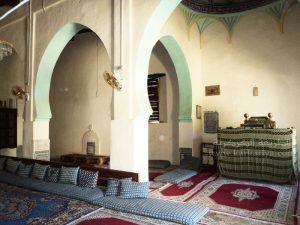
Video
Bio: Sh. ‘Ali Wafa | الشيخ علي وفا
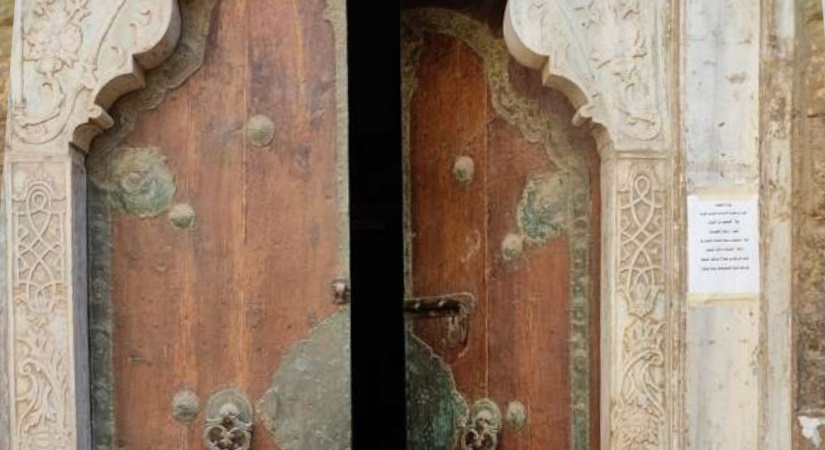
Sh. 'Ali Wafa
الشيخ علي وفاb. 761 H. in Cairo – d.807 H. in Cairo
﷽
He passed it on to Sh. Yahya al-Qadiri.
Read more about the Wafa’i Masters
– May Allah be pleased with them all.
English
الشيخ علي بن محمد وفا (d. 807/1404)
Our mater ‘Ali 154 was young [when his father died]. Alongside his brother, he was brought up under the tutelage of Shaykh Muhammad al-Zayla’i. When he turned seventeen, he took up his father’s place and began delivering regular lessons. His fame spread all over and the number of his followers and disciples multiplied. He resided for the most part in Cairo’s Rawda.
He wrote a number of works that include a collection of invocations, litanies, admonitions, and poetry.
He passed away in his house in Rawda on Tuesday, 2 Dhu’l-Hijja AH 807. By way of sons, he had Abu’l-Abbas Ahmad, Abu al-Tayyib, Abu al-Tahir and Abu’l-Qasim. His biography has been penned by more than one scholar.
Qutb al-Sha’rani writes:
Our master `Ali Wafa reached the pinnacle of virtue, perfection, grace and beauty. There was no one more perfect and more beautiful in Cairo than him. He penned well-known poems and fine postclassical stanzas [muwashshahat] in which thread together secrets of the folks of the path. He was gifted the language of separation [farq] particularization [tafsil], and gatheredness [jam’]. Few saints are given this.
He would often conceal himself from people, as would his brother, our master Shihab al-Din Ahmad. They would only leave the house to deliver a lesson.
When our master ‘Ali died, the like of his funeral had never been witnessed before. His disciples walked in front of the coffin, invoking Allah in a way which softened the hearts of coarse people. His birth had taken place in Cairo in AH 759.
Footnotes:
Türkçe
Referans: Tabakat el-Şaziliyye el-Kubra, Muhammed bin Kasım el-Kuhin [Babası vefat ettiğinde] çok küçüktü. Abisiyle birlikte ve vekilleri Şeyh Muhammed ez-Zeyla’a’nın gözetiminde büyüdü. Şeyh Ali vefa hazretleri 17 yaşına eriştiğinde babasının makamını almış ve düzenli dersler vermeye başlamıştır. İsmi birçok beldede anılmış, ona tabi olanların ve müridlerinin sayıları artmıştır. En çok ikamet ettiği yer Ravdaydı.
Kendisine ait bir çok hizib, vird, münacaat, nasihatler ve şiir divanı vardır.
Ravda’daki evinde 807 yılının Zilhicce ayında bir salı günü vefat etmiştir. Abu’l-Abbas Ahmad, Abu’l-Tayyib, Abu’l-Tahir ve Abu’l-Qasım isimli oğulları vardır.
Kutup İmam Şa’rani hazretleri demiştir ki: Ali Vefa efendimiz fazilet ve kemalin, zerafet ve cemalin had safhasındaydı. Mısır’da ondan daha büyük biri, yüz ve dış görünüş bakımından daha güzel biri görülmedi. Meşhur bir nazmı ve içinde ehli tarikin sırları yazılmış dakik muvassah tarzı şiiri vardır. Kendisine fark, tefsil ve cem lisanı verilmiş, ki bu pek az evliyaya verilmiştir.
Ali Vefa efendimiz vefat ettiği zaman onun cenazesi gibi bir cenaze daha sonra görülmedi. Cemaati ve ashabı cenazenin önünden Allah’ı zikrederek yürüyorlar, bununla katı kalpler yumuşuyordu. Doğumu Kahire’de 759 yılında olan Ali Vefa hazretleri (807 senesinde vefat etmiştir.)
عربي
2. From Kuhin: Tabaqat al-Shadhiliyya – Entry on Sh. ‘Ali Wafa (Ref alsufi.net)
وكان مولانا عليٌّ إذ ذاك صغيرًا، فنشأ مع أخيه في كفالة وصيِّهما الشيخ محمد الزَّيْلَعي، ولما بلغَ مولانا عليٌّ من العمر سبع عشرة سنة جلس مكان أبيه، وعمل الميعاد، فشاع ذكرُه في البلاد، وكثرتْ أتباعه ومريدوه، وكان أكثرُ إقامته بالرَّوضة، وله أحزابٌ وأوراد وتوجُّهات وتصانيفُ كثيرة، وديوان شعر، توفي بمنزله في الرَّوضة يوم الثلاثاء اثنين من ذي الحجة سنة ثمان مئة وسبع، وله من الذكور أبو العباس أحمد، وأبو الطيب، وأبو الطاهر، وأبو القاسم، وقد ترجَمه غيرُ واحدٍ من الأعيان.
قال القطب الشعراني رضى الله عنه: كان مولانا عليّ وفا في غايةِ الفضل والكمال، والظَّرف والجمال، لم يُر في مصرَ أكملَ منه، ولا أجمل وجهًا ولا ثيابًا، وله نظمٌ شائع، وموشحات رقيقة نسجَ فيها أسرارَ أهل الطريق، وأُعطي لسان الفرق والتفصيل زيادة على الجمع، وقليل من الأولياء من أُعطي ذلك.
وكان رضى الله عنه كثير التحجُّبِ هو وأخوه مولانا شهاب الدين أحمد لا يخرجان إلا عند حملِ الميعاد.
ولما تُوفِّي مولانا عليٌّ رضى الله عنه لم تُر قطُّ جنازةٌ مثل جنازته، كانت جماعته وأصحابُه يمشون أمامها، ويذكرون الله بطريقةٍ تلينُ لها قلوبُ الجفاة. ومولده بالقاهرة سنة 759.
Burial Place
His grave is located in the main chamber. (Ref: Kuhin)
Bio: Sh. ‘Umar ibn al-Farid | سيدي عمر بن الفارض
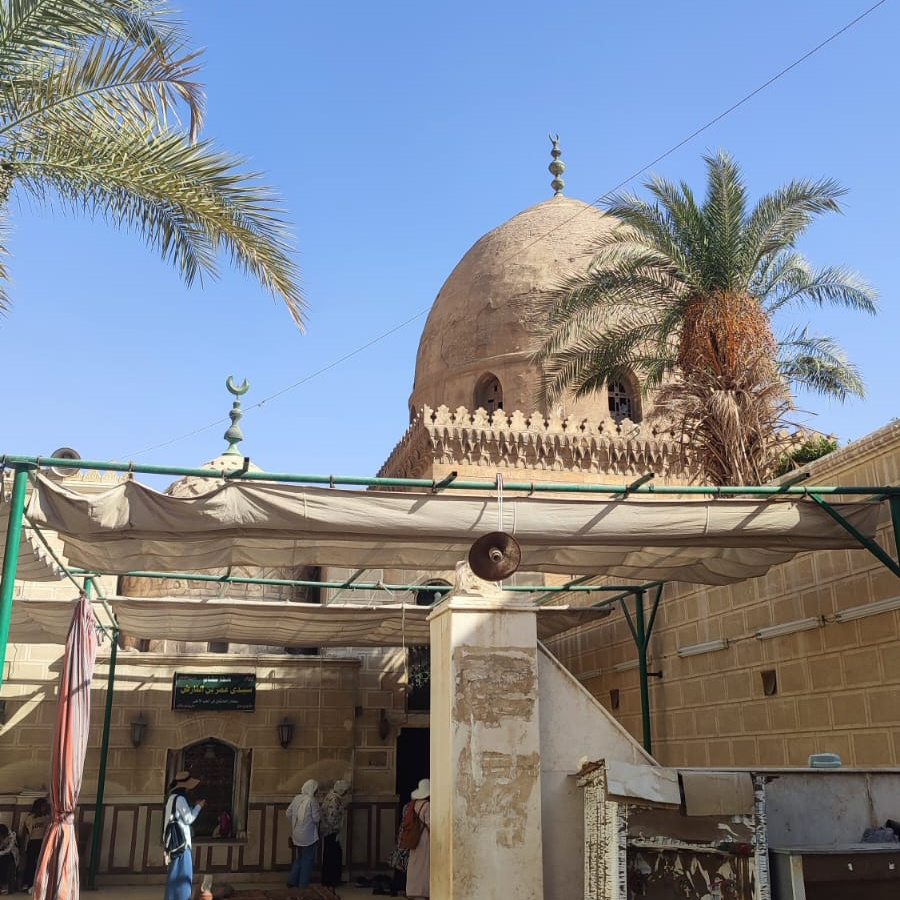
Sayyidi Sh. 'Umar ibn al-Farid
سيدي الشيخ عمر بن الفارضb 576 - d. 632 H. in Cairo
may Allah be pleased with him
Bio: Sh. Abd al-‘Aziz al-Dabbagh

Sayyidi Shaykh Abd al-‘Aziz al-Dabbagh al-Hasani
الشيخ مولانا عبد العزيز الدباغ
b 1095 – d. 1131 H. (1718 CE) in Fas
Bio: Sh. Abul Hassan ´Ali ibn Hirzihum
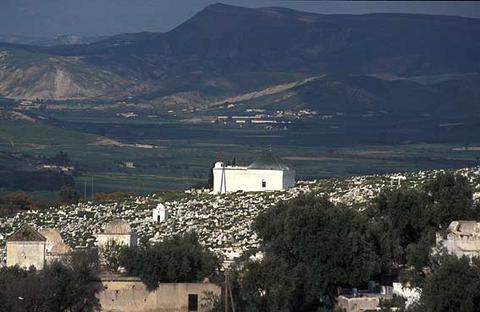
Sayyidi Abul Hassan Ali ibn Hirzihum
d. 544 H. (1129 CE) in Fas
qaddasa Allah sirrahu
Teacher of Sayyiduna Shaykh Abu Madyan al-Ghawth
Bio: Sh. Abul Mawahib al-Shadhili | الشيخ أبو المواهب الشاذلي
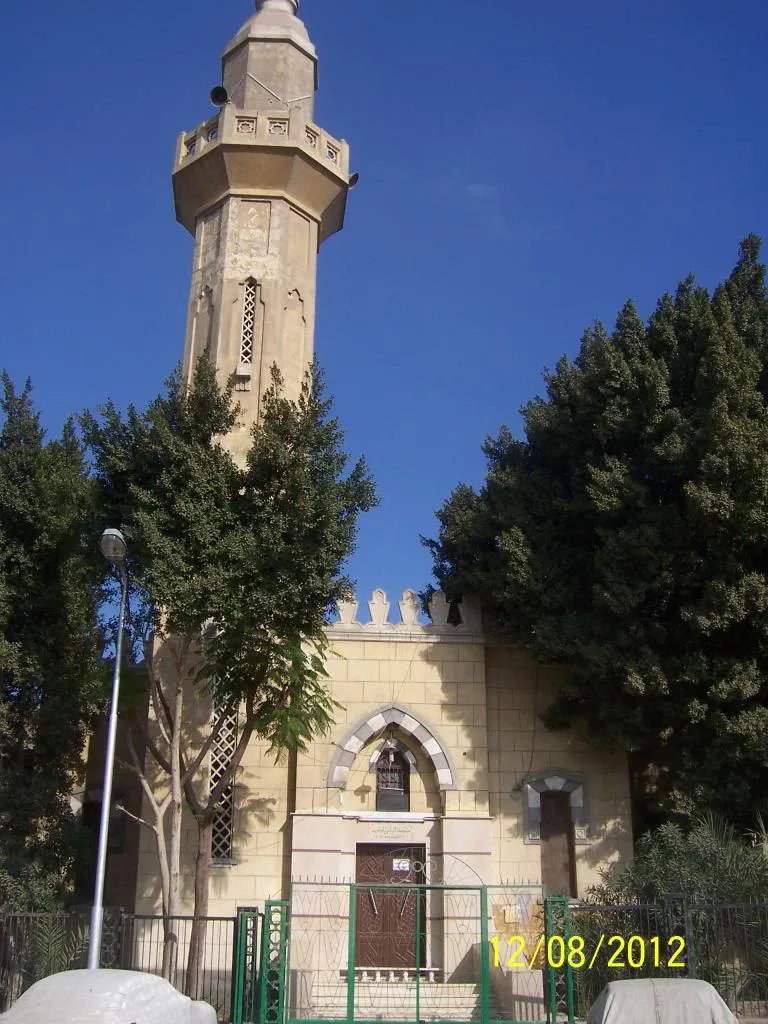
Sh. Abul Mawahib al-Shadhili
الشيخ أبو عبد الله محمد أبو المواهب التونسي الشاذلي الوفائيd. 881 H. (? after 850) in Cairo
Bio: Sh. Abul-‘Abbas al-Mursi
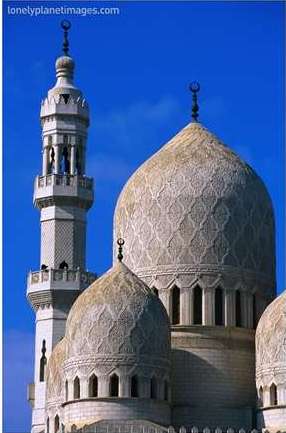
Sayyidi Shaykh Abul-‘Abbas al-Mursi
الشيخ أبو العباس المرسي
d. 686 H. in Alexandria
qaddasa Allah sirrahu
.
He took the noble Shadhili Tariqa from Sayyidi Imam Abul Hasan al-Shadhili.
He passed the path on to Sayyidi Shaykh Ibn ‘Ata Allah al-Sakandari.
May Allah be pleased with all of them.
English
2. From Tabaqat al-Shadhiliyya of Kuhin
3. From Lataif al-Minan of Imam Ibn ‘Ata Allah al-Sakandari
Article translated by Arfan Shah | marifa.net View PDF
His full name was Shihāb al-Dīn A$mad ibn ‘Umar ibn ‘Alī al-Khazraji al-Balansi whose noble lineage is traced back to the great companion Sa’ad ibn ‘Ubadā al-’An.arī. He was known by the agnomen Abu’l‘Abbās and by the nickname al-Mursī after the place he was born – Mursia. His grandfather was Qays ibn Sa’ad, the leader of Egypt before our master Imam ‘Alī ibn Abī Tālib in 36H. Our master Abu’l ‘Abbās al-Mursī was born in the city of Mursia in Andalusia in the Islamic year 616H [1219 AD]. His father worked there and sent his son to a teacher to study the Majestic Qur’ān and to understand the commands of the religion. Abu’l‘Abbās memorised the entire Quran in one year and went on to study the principles of Jurisprudence, reading and writing. …
translated by Ahmad Ali al-Adani as “Biographies of Prominent Shadhilis”
He is the imam of the circle of those truly realized, the qutb of the elite, the treasury of saints, and the vanguard of those brought nigh. He was endowed with the pure saintly miracles and resplendently lofty feats. He is the realized exemplar, Sidi Abu’l-Abbas Ahmad al-Mursi al-Ansari al-Shadhili,1 may Allah be pleased with him and benefit us by his knowledges, amin.
He was one of the greatest knowers of Allah. He was the only one to inherit the [complete] knowledge of al-Shadhili, and the most esteemed disciple to have taken the path from him.
Al-Mursi did not bequeath any books, saying: ‘The sciences of this group are sciences of realization, and these sciences are not grasped by the intellects of the commonality among creation.’ His own guide, Abul-Hasan al-Shadhili — may his secret be sanctified — would say: ‘My companions are my books’. He also said:
He is a qutb, so recognize him, unmatched and unique.
Al-Shadhili would exhort Zaki al-Din al-Aswani with the words, ‘O Zaki al-Din, you must stick to Abul-Abbas. By Allah, there is no Friend of Allah save that Allah has manifested him to Abul-Abbas. OZaki, Abul-Abbas is the perfected man!’ Ustadh
Abul-Abbas would say about himself: ‘By Allah, the saints and the substitutes [abdal] travel around Mount Qaf2 until they meet someone like us. When they meet him, he enriches them.’
He would teach other sciences and say: ‘We have participated in the disciplines of the jurists, yet they have not participated in what we [the Sufis] are engaged in.’
He was the pivot of gnoses and secrets, and their illumining sun. Had you heard his speech you would have said, ‘This is the speech of someone whose homeland is nothing but Allah’s invisible reality. He is more knowledgeable about news of the celestials than the news of the terrestials.’
He would only speak about the Greatest Intellect, the Supreme Name and its four branches, the Names, the Letters, the Circles of Saints, the stations of those endowed with certainty and the possessions of the ones brought near the Throne, the sciences of secrets, the spiritual help of formulas of remembrance, the Day of the Decrees, the matter of self-direction [tadbir], the science of the beginning, the science of volition [mashi’ a], the matter of the divine grasp [qabda] and the men singled out for that, the sciences of segregated devotion [ifrad], and Allah’s acts vis-à-vis His slaves set to occur on the Day of Rising.
He would say: ‘By Allah, were it not for the weakness of intellects, I would inform you of what is going to take place tomorrow by God’s mercy.’
He would grab his beard and say, ‘By Allah, if the people of Iraq and the Levant knew what lay beneath these hairs, they would come crawling to it.’
He would say:
“For forty years I have not been veiled from the Messenger of Allah ﷺ even for the blinking of an eye, and had that occurred I would not have counted myself from the Muslims.”
His worldly abstinence [zuhd] reached such an extent that he spent thirty six years in Alexandria without ever seeing the face of its governor or sending him any message. One day, the governor of the city sought to have a meeting with him, but al-Mursi refused, saying, ‘By Allah, I will meet Allah without seeing him.’ It was as he stated. Rulers and kings would come to visit him, but spiritual contraction [qabd] would seize him and he would not find respite while in their company.
He would say:
“By Allah, nothing unlawful ever entered my stomach.’ If he happened to stretch a hand towards something of dubious lawfulness, sixty of his veins would throb and his fingers would emit a light.”
He was gifted the ability to speak in foreign languages and dialects. He would reside in the Muqassam district in Cairo. Every night he would go to Alexandria, listen to the lesson of Abul-Hasan [al-Shadhili], and then return to Cairo.’3 He would say: ‘Allah caused me to witness the angels prostrating to Adam, peace upon him, so I took my share (of knowledge) from that, and so I have declaimed:
The sun of my heaven was manifest to the secret
I descended through the worlds. What was folded
In the Attributes after my attribute was disclosed.
He has — may Allah have mercy on him — many sayings, which have been presented in Lata’if al-Minan. O Allah, sustain us and our dear ones by his spiritual help [madad], and benefit us by his blessings, Amin.
His death — may Allah have mercy on him — took place in AH 686. He was buried in his mosque in Alexandria. His tomb is famous among Egyptians, young and old. Both leaders and paupers seek intercession through him. O Allah, benefit us through him, amin.
Footnotes:
2 Qaf is mentioned in the Qur’an. Exegetes have taken the view that it is the mountain that encircles the earth. They say it is made of green chrysolite, and that the green of the sky is from its green. They say that its base is a green rock on top of it and that Mount Qaf is a stem (tributary) of this green rock. The bases of all the mountains derive from the stem of Mount Qaf, being tributaries of it. They mention that between it and the sky is the distance of a man standing (a man’s height), though it is also stated that heaven is resting upon it as a layer. (cf. Yaqut al-Hawami’s Mu’jam al-Buldan).
3 The distance between the two cities is now 178.62 kilometers, and in his days there were no fast means of transport as we have today.
t.b.d.
Svenska
Sammanställt av bmk | Damas Cultural Society © 2007 – Se ursprunglig sida
Sheikh Abul ´Abbas Shihab al-Din Ahmad ibn `Umar al-Ansari al-Mursi var efterträdare till Imam Abul Hasan al-Shadhili. Trots att han till det yttre inte liknade sin Sheikh, liknande han honom till sitt sätt och till sitt beteende till den grad att folk inte kunde skilja mellan honom och Imam Abul Hasan.
Sheikh Abul `Abbas al Mursi sade:
“Imam Abul Hasan sade till mig: ‘Abul `Abbas, jag har tagit dig till min lärjunge endast för att du ska bli jag och jag du.’ ” [1/ p. 116]
Hans efterträdare var sedan Ibn `Ata Allah al-Sakandari, som skrivit många kända böcker, t.ex. Al-Hikam (Visdomsord). Han var den förste som dokumenterade sina föregångares liv och uttalanden. Nedan några utdrag ur hans bok Lata’if al-Minan.
Hur Sheikh Abul `Abbas al-Mursi mötte sin Mästare Imam Abul Hasan al-Shadhili
Shaikh Abu al Abbas berättade för Ibn `Ata Allah, enligt Lata’if al-Minan :
“När jag var i Tunisien, sedan jag kommit från Murcia – jag var då en ung man – hörde jag talas om Sheikh Abul Hasan al-Shadhili. En man sade till mig: ‘Vill du komma med mig för att träffa honom?’ Jag svarade: ‘När jag sökt Allah’s vägledning i denna sak.’ När jag sov den natten, såg jag mig själv i en vision, där jag steg upp mot en bergstopp. När jag nådde toppen såg jag där en man klädd i en grön burnus. Han satt med en man på sin högra sida och en annan på sin vänstra. Jag såg på honom och han sade: ‘Du har funnit denna tids khalifa.’ Jag vaknade, och sedan jag bett morgonbönen kom mannen som bjudit in mig för att besöka Sheikhen och jag gick med honom. När vi kom in för att träffa Sheikhen, fann jag honom till min förundran sittande på samma bänk som jag sett honom på på bergstoppen. Sheikhen sade till mig: ‘Du har funnit denna tids khalifa. vad heter du?’ Jag nämnde mitt namn och min härstamning för honom, och han sade till mig: ‘Du lyftes upp till mig för tio år sedan’.” [1/ p. 97]
Abul `Abbas al-Mursi berättar om hur Allah gav Imam Abul Hasan befäl över havet
Sheikh Abu al Abbas berättade:
“Jag var med Sheiken på `Idhab-sjön. Vi ansattes av hårda vindar och båten hade fått en läcka. Sheikhen sade då:´’Jag såg himlarna öppna och två änglar som steg ned. En av dem sade: “Moses är mer kunnig än al-Khidr,” medan den andres sade “Al-Khird är mer kunnig än Moses,” ytterligare en ängel nedsteg och sade: “Sannerligen, det al-Khidr vet mer än Moses är inte mer än det härågeln känner till av Solomos kunskap då han sade: ‘Jag har fått reda på sådant du inte fått reda på.” ‘ Jag förstod då att Allah skulle föra oss säkert till vårt mål, eftersom Han gett Moses befäl över havet. ” [1/ p. 100]
Sheikh Abul `Abbas berättar [för Sheikh Ibn `Ata Allah, i Lataif al-Minan] :
“Vi var på en resa tillsammans med Sheihen [Abul Hasan] det år han dog. När vi kom till Khanim, sade Sheiken till mig: Jag såg mig själv i en häftig storm på havet. Vinden piskade, vågorna hävde sig, båten sprang läck och vi var nära att dränkas. Jag närmade mig då båtens reling och sade: ´”O hav, om du har befallts att lyssna och lyda mig – all nåd tillhör Allah, den All-Hörande, den All-Vetande. Men om du befallts något annat, så ligger domslutet hos Allah, den Allsmäktige, den Vise ” Jag hörde då havet säga: “Jag lyssnar och jag lyder.” – Sheikhen dog och vi begravde honom i Humaythira i `Idhab-öknen. Efter det begav jag mig på en annan resa. Vi befann oss mitt i en häftig storm, vi var långt ute till havs, Vinden piskade, vågorna hävde sig, båten sprang läck och vi var nära att dränkas. Vid den tiden hade jag glömt Sheikhens ord, men när situationen blev allvarlig mindes jag dem. Jag närmade mig då båtens reling och sade: ´’O hav, om du har befallts att lyssna och lyda Allah’s Vänner – all nåd tillhör Allah, den All-Hörande, den All-Vetande. (Jag sade inte: lyssna och lyda mig, som Sheikhen sagt.) Men om du befallts något annat, så ligger domslutet hos Allah, den Allsmäktige, den Vise.’ Jag hörde då havet säga: ‘Jag lyssnar och jag lyder.’ Havet blev då stilla och den återstående resan var behaglig.” [1/ p. 99]
——–
Referenser & källtexter
[1] Lata’if al-Minan
Türkçe
Referans: Tabakat el-Şaziliyye el-Kubra, Muhammed bin Kasım el-Kuhin
Tahkik ehlinin imamı, ruhlarını saflaştırmışların kutbu, evliyanın hazinesi, Allah’a yakınlaşmış olanların önde gelenlerindendir. Açık kerametlerin ve apaçık ali marifetin sahibi, muhakkik rehber Şeyh Ebu’l Abbas el-Mursî el-Ensârî eş-Şâzîlî Hazretleri, Allah Teala ondan razı olsun ve bizi onun ilmi ile faydalandırsın, Amin.
O (r.ah) ariflerin büyüklerindendi. Ondan başka Ebu’l Hasan Şazili Hazretleri’nin (r.ah) ilmini miras alan yoktur. O, Şazili Hazretleri’nden tarikatı alanların en seçkinidir.
Şeyh, herhangi bir kitap kaleme almamıştır. Derdi ki: “Bu taifenin bilgileri tahkik ilmidir ve avam kişilerin akılları bu bilgileri kavrayamaz.” Aynı şekilde şeyhi Ebu’l Hasan Şazili Hazretleri de (kuddise sırruh): “Benim kitaplarım, ashabımdır.” demiştir.
Şazili Hazretleri, Şeyh Ebu’l Abbas el-Mursi hakkında şöyle söylemiştir:
“Gerçekten o Şazili ilminin varisidir
O kutuptur ki onu iyi tanıyın, O biriciktir”
Şazili Hazretleri, Şeyh Zekiyyuddin el-Asvani’ye şöyle öğütlemiştir: “Ey Zekiyuddin, Ebu’l Abbas’a sıkıca yapış. Zira Allah’a yemin olsun, Allah’ın hiçbir velisi yoktur ki, Allah mutlaka onu Ebu’l Abbas’a bildirmesin. Ey Zeki, Ebu’l Abbas kamil bir zâttır.”
Şeyh Ebu’l Abbas Hazretleri kendisi hakkında şöyle derdi: “Allah’a yemin olsun ki, Allah dostları ve abdallar bize benzeyen biri ile karşılaşana dek Kaf Dağı’ndan Kaf Dağı’na yolculuk ederler! Böyle kimse ile karşılaştıklarında, o zat onları manevi hazineleri ile zengin eder.”
Ebu’l Abbas Hazretleri diğer ilimler konusunda da söz sahibi idi ve şöyle derdi: “Bizler fıkıh alimlerine ilimlerinde ortak olduk; fakat onlar bizim ilmimizde bize ortak olamadılar.”
O, marifet ve sırlar ilminin dayanağı ve parlayan güneşiydi. Onun konuşmalarını dinlediğinde: “Bu ilmin vatanı Allah’ın gaybi hakikatinden başka bir şey olamaz. Şeyh, göktekilerin haberlerini, yeryüzündekilerin haberlerinden daha iyi biliyor.” derdin.
Konuştuğu zaman sadece Akl-ı Ekber, İsm-i Azam ve onun dört şubesi, İsimler, Harfler, Evliya Daireleri, yakin sahiplerinin ve arşa yakınlaşanların makamları, sırlar ilmi, zikirlerin manevi yardımı, Hüküm Günü, tedbir mevzusu, başlangıç ilmi, Allah’ın iradesini konu alan ilim, ilahi kabza ve onun ricaline dair mevzular, ifrad ilmi ve kıyamet gününde Allah Teala’nın kullarıyla olacak olan münasebeti hakkında konuşurdu.
Ve şöyle derdi: “Allah’a yemin ederim ki, akıllar zayıf olmamış olsaydı Allah’ın rahmetiyle yarın nelerin olup meydana geleceğini anlatırdım.”
Ebu’l Abbas el-Mursi Hazretleri sakalını tutup şöyle buyururdu: “Allah’a yemin olsun, Irak ve Şam alimleri bu sakalın altında ne olduğunu bilmiş olsalardı yüzüstü sürünerek de olsa yanımıza gelirlerdi.”
Ebu’l Abbas el-Mursi Hazretleri yine şöyle buyurmuşlardır: “Kırk sene boyunca Rasulullah (sallallahu aleyhi ve sellem) ile arama bir an olsun perde girmemiştir. Eğer göz kırpacak kadar Rasulullah’tan ayrılmış olsam, kendimi Müslümanlardan saymazdım.”
Onun zühdü çok ileri bir düzeye ulaşmıştı, öyle ki otuz altı sene İskenderiye’de yaşadığı halde bir kere olsun şehrin valisinin yüzünü görmedi ve hiç kimseyi de ona göndermedi. Bir gün vali onunla buluşmak istemişti fakat o bunu geri çevirdi. Ve şöyle demişti: “Allah’a yemin olsun onu görmeden Allah ile buluşacağım.” Bu onun makamıydı. Emir ve sultanlar ona ziyaret maksadıyla gelirlerdi ancak onu bir kabz hali bürür ve onların aralarında genişlik bulamazdı.
Şeyh Hazretleri şöyle söylerdi: “Allah’a yemin olsun ki mideme hiç haram lokma girmedi.” Şüpheli bir şeye elini uzatacak olsa altmış damarı titreyip hareket eder ve parmaklarının arasından ışık parıldardı.
Kendisine pek çok farklı dilde konuşma becerisi verilmişti. Kahire’de Mukassem bölgesinde oturuyordu. Her gece İskenderiye’ye gelir, hocası Şeyh Ebu’l Hasan’ın dersini dinler sonra Kahire’ye geri dönerdi.
Şeyh şöyle demiştir: “Allah bana Hz. Adem (a.s)’e secde eden melekleri müşahede ettirdi. Ben de o (ilimden) payıma düşeni aldım. Bir de baktım ki şu kasideyi okuyorum:
“Suretim eridi, fena halimin sıdkı tamam olduğunda
Semamın güneşi tecelli etti sırlarda
Alemlere indim ve olundu ifşa
Saklanmış olan o Sıfatlarda bendekilerden sonra”
Şeyhin buna benzer birçok sözü “Letâifu’l Minen” adlı eserde yer almaktadır.
Ey Allah’ım, bize ve sevdiklerimize onun mededi ile imdad eyle ve onun bereketi ile bize fayda ver… Amin.
Şeyh Hazretleri Hicri 686 senesinde vefat etmiştir. İskenderiye’deki camisine defnedilmiştir. Makamı Mısır halkı arasında meşhur olmuştur, büyük-küçük herkes onu bilir ve hükümdarı da fakiri de onunla Allah’a tevessül eder.
Allah’ım onun yoluyla bize fayda ver. Amin.
عربي
2. From Kuhin: Tabaqat al-Shadhiliyya: View book | Download | Chapter [4] – see below
See also: About the mosque of Sh. Abul ‘Abbas al-Mursi in Alexandria
( الشيخ سيدى الإمام أحمد أبو العباس المرسى رضى الله عنه )
كان من أكابر العارفين بالله وكان يقال أنه لم يرث علم الشيخ أبى الحسن الشاذلى رضى الله عنه غيرره وهو أجل من أخذ عنه الطريق رضى الله عنه ولم يضع رضى الله عنه شيأ من الكتب وكان يقول علوم هذه الطائفة علوم تحقيق وعلوم التحقيق لا تحملها عقول عموم الخلق وكذلك شيخه أبو الحسن الذشاذلةى رضى الله عنه لم يضع شئأ وكان يقول كتبى اصحابى ( مات رضى الله عنه سنة ست وثمانين وستمائة ومن كلامه رضى الله عنه جميع الأنبياء عليهم الصلاة والسلام خلقوا من الرحمة ونبينا صلى الله عليه وسلم هو عين الرحمة وكا رضى الله عنه يقول الفقيه هو من أنفقأ الحجاب عن عبينى قلبه وكان رضى الله عنه يقول رجال الليل هم الرجال وكلما أظلم الوقت وقى نور الولى وكان رضى الله عنه يقول ولى الله مع الله وكان رضى الله عنه يقول ان لله تعالى عبادا محق أفعالهم بأفعاله واوصافهم بأوصافه وذاتهم بذاته وحملهم من أسراراه ما يعجر عامة الأولياء عن سماعه وكان يقول رضى الله عنه فى معنى حديث من عرف نفسه عرف ربه ( معناه ) من عرف نفسه بذلها وعجز ما عرف الله بعزة وقدررته قلت وهذا أسلم الأجو والله أعلم وكان يقول رضى الله علنه سمعت الشيخ أبا الحسن رضى الله عنه يقول لو كشف عن نرو المؤمن العاصى يطبق بين المساء والأرض فما ظنك بنور المؤمن المطيع * وكان يقول رضى الله عنه قد يكون الولى مشحونا بالعلوم والمعارف والحقائق لديه مشهودة حتى إذا أعطى العبارة كان الاذن من الله تعالى فى الكلام ويجب أن تفهم ان من أذن له فى التعبير حليت فى مسامع الخلق اشاراته وكان يقول كلام المأذون له يخرج وعليه كسوة وطلاوة وكلام الذى لم يؤذن له يخرج مكسوف الانوار * وقال فى قول بشر الحافى رضى الله عنه انى لاشتهى الشواء منذ أربعين سنة ما صفا لى ثمنه أى لم يأذن لى الحق فى أكله فلو أذن لى صفا لى ثمنه والا فمن أين يأكل فى الاربعين سنة وقال فى قول الجنيد رضى الله عنه أدركت سبعين عارفا كلهم كانوا يعبدون الله تعالى على ظن ووهم حتى أخى أبا يزيد يدلوا أدرك صبيا من صبياننا لاسلم علي يدية معناه أنهم ييقولون ما بعد المقام الذى وصلناه مقام فهذا وهم وظن فان كل مقام فوقه مقام الى ما يتناهى وليس معناه الظن والوهم فى معرفتهم بالله تعالى ومعنى لا سلم على يديه أى لا نقاد له لان الاسلام هو الانقياد وقال فى قوله أبى يزيد رضى الله عنه خضت بحرا وقل الانبياء بساحله معناه أن أبا يزيد رضى الله تعالى عنه يشكو ضعفه وعجزه عن اللحوق بالانبياء عليهم الصلاة والسلام وذلك لان الانبياء عليهم الصلاة والسلام خاضوا بحر التوحيد ووقفوا على الجانب الآخر على ساحل الفرق يدعون الخلق الى الخوض أى فلو كنت كامى لوقفت حيث وقفوا قال ابن عطاء الله رضى الله عنه وهذا الذى فسر به الشيخ كلام أبى يزيد رضى الله عنه هو اللائق بمقام أبى يزيد وقد كان يقول دميع ما أخذ الاولياء بالنسبة لما أخذ الانبياء عليهم الصلاة والسلام كزق ملىء عسلا ثم رشحت منه رشاحة فما فى باطن الزق للآنبياء عليهم الصلاة والسلام وتلك الرشاحة للأولياء رضى الله تعالى عنهم
(…-686)
إمام دائرة المحققين، قطب الأصفياء، وسكردان([2]) الأولياء، أحدُ صدور المقرّبين، صاحبُ الكرامات الظاهرة، والمآثر العالية الزاهرة، القدوة المحقِّقُ سيدي أبو العباس أحمد المُرسي الأنصاري الشاذلي رضي الله عنه ونفعنا بعلومه آمين.
كان رضى الله عنه من أكابر العارفين، لم يرثْ علمَ الشاذلي رضى الله عنه غيرُه، وهو أجلُّ من أخذ عنه الطريق، ولم يضع رضى الله عنه كتبًا. وكان يقول: علومُ هذه الطائفة علومُ تحقيق، وعلومُ التَّحقيق لا تسعها عقول عموم الخلق. وكذلك شيخُه أبو الحسن الشاذلي قدّس سرُّه، كان يقول: كُتبي أَصحابي.
وقال في حقِّه:
ووارثُ علم الشَّاذليِّ حقيقةً * وذلك قطبٌ فاعلموه وأوحدُ
وكان رضى الله عنه يُوصي الأستاذ زكيِّ الدين الأسواني، ويقول له: يا زكي الدين، عليك بأبي العباس، فوالله ما من وليٍّ إلا وقد أظهره الله عليه، يا زكيُّ، أبو العباس هو الرجل الكامل.
وكان الأستاذُ أبو العباس يقول عن نفسه: واللهِ، ما سار الأولياءُ والأبدال من قاف إلى قاف حتى يلقوا واحدًا مثلنا، فإذا لَقوه كان يغنيهم.
وكان رضى الله عنه يتحدَّثُ في سائر العلوم، ويقول: شاركنا الفقهاء فيما هم فيه، ولم يُشاركونا فيما نحن فيه.
وكان في المعارف والأسرار قطبَ رحاها، وشمس ضحاها، تقول إذا سمعت كلامه، هذا كلام مَنْ ليس وطنه إلا غيب الله، هو بأخبار أهل السماء أعلمُ منه بأخبار أهل الأرض.
وكان لا يتحدَّثُ إلا في العقل الأكبر، والاسم الأعظم، وشعبه الأربع، والأسماء، والحروف، ودوائر الأولياء، ومقامات الموقنين والأملاك والمقربين من العرش، وعلوم الأسرار، وإمداد الأذكار، ويوم المقادير، وشأن التدبير، وعلم البدء، وعلم المشيئة، وشأن القبضة، ورجال القبضة، وعلوم الإفراد، وما سيكون يوم القيامة من أفعال الله مع عباده.
وكان يقول: واللهِ، لولا ضعفُ العقول لأخبرت بما يكون غدًا من رحمة الله.
وكان يُمسك بلحيته ويقول: لو علم علماءُ العراق والشام ما تحت هذه الشعرات، لأتوها ولو سعيًا على وجوههم.
وكان يقول لي: أربعون سنة ما حُجبتُ عن رسول الله صلى الله عليه وسلم طرفةَ عين، ولو حُجبت طرفةَ عين ما عددت نفسي من المسلمين.
وبلغ رضى الله عنه من زهده أنه مكثَ بالإسكندرية ستًا وثلاثين سنةً ما رأى وجهَ مُتولّيها ولا أرسلَ إليه، وطلبه المتولي يومًا للاجتماع به، فأبى، وقال: والله، إني ألقى الله ولا أراه. فكان الأمر كذلك، وكانت تأتيه الأمراء والملوك لتزوره، فكان يغلبُ عليه القبضُ، ولا ينبسط في مجلسهم.
وكان رضى الله عنه يقول: والله ما دخلَ بطني حرامٌ قط. وكان له ستون عرقًا تضرب إذا مدَّ يده إلى شبهة، وكان النور يتلألأ في أصابعه.
وأُعطي رضى الله عنه النُّطقَ بسائر اللغات والألسن.
وكان ساكنًا خط المقسم بالقاهرة، فكان كلَّ ليلةٍ يأتي الإسكندرية، فيسمعُ ميعاد الأستاذ أبي الحسن، ثم يرجع إلى القاهرة.
وكان رحمه الله يقول: أطلعني الله على الملائكة ساجدةً لآدم — فأخذت بقسطي من ذلك، فإذا أنا أقول:
ذابَ رسمي وصحَّ صدقُ فنائي * وتجلَّتْ للسرِّ شمسُ سمائي
وتنزَّلت في العوالم أُبدي * ما انطوى في الصفاتِ بعد صفائي
وله رحمه الله كلامٌ كثير من هذا القبيل مبسوط في «لطائف المنن» اللهم مدَّنا وأحبتنا بمدده، وانفعنا ببركاته آمين.
وكانت وفاته رحمه الله سنة ست وثمانين وست مئة، ودفن بمسجده بالإسكندرية، ومقامه رحمه الله مشهورٌ بين أهل مصر بأسرها، يعرفُهُ الكبير والصغير، ويتوسَّلُ به إلى الله الأميرُ والفقير، اللهم انفعنا به آمين.
([1]) أبو العباس المرسي صحب الشيخ أبا الحسن الشاذلي، وكان قدم من الأندلس من مرسية وقبره بالإسكندرية مشهور، توفي بالإسكندرية سنة 686هـ.
([2]) السُكُرْدان: شبه خزانة يحفظ فيها المشروب والمأكول.
Maqam
شيخ الإسكندرية الجليل
أبو العباس المرسى هو الأمام شهاب الدين أبو العباس احمد بن عمر بن علي الخزرجي الأنصاري المرسى البلنسي يتصل نسبه بالصحابي الجليل سعد بن عبادة الأنصاري (رضي الله عنه) سيد الخزرج و صاحب سقيفة بن ساعدة التي تمت فيها البيعة لأبي بكر الصديق بالخلافة ..و كان جده الأعلى قيس بن سعد أميرا علي مصر من قبل الإمام علي كرم الله وجهه عام 36هـ.(656م).
و لقد ولد أبو العباس المرسى بمدينة مرسيه سنة 616هـ.(1219م) و نشأ بها و هي احدي مدن الأندلس و إليها نسب فقيل المرسى
و لما بلغ سن التعليم بعثه أبوه إلي المعلم ليحفظ القرءان الكريم و يتعلم القراءة و الكتابة و الخط و الحساب. و حفظ القرءان في عام واحد و كان والده عمر بن علي من تجار مرسيه فلما استوت معارف أبي العباس و ظهرت عليه علائم النجابة ألحقه والده بأعماله في التجارة و صار يبعثه مع أخيه الأكبر أبو عبد الله فتدرب علي شؤون الأخذ و العطاء و طرق المعاملات و استفاد من معاملات الناس و أخلاقهم .
و في عام 640هـ. (1242م) كانت له مع القدر حكاية عظيمة و ذلك حين صحبه و الده مع أخيه و أمه عند ذهابه إلي الحج فركبوا البحر عن طريق الجزائر حتى إذا قاربوا الشاطيء هبت عليهم ريح عاصفة غرقت السفينة غير أن عناية الله تعالي أدركت أبا العباس و أخاه فنجاهما الله من الغرق … و قصدا تونس وأقاما فيها و اتجه أخوه محمد إلي التجارة و اتجه أبو العباس إلي تعليم الصبيان الخط و الحساب و القراءة و حفظ القرءان الكريم .
و كان لأبي العباس في تونس مع القدر حكاية أخري حددت مستقبله و أثرت علي اتجاهه فيما بعد ذلك انه تصادف وجود أبي الحسن الشاذلي علي مقربة منه في تونس و يروي أبو العباس نفسه عن لقاءه بأستاذه الشيخ أبي الحسن الشاذلي فيقول:
” لما نزلت بتونس و كنت أتيت من مرسيه بالأندلس و أنا إذ ذاك شاب سمعت عن الشيخ أبي الحسن الشاذلي و عن علمه و زهده و ورعه فذهبت إليه و تعرفت عليه فأحببته ورافقته ”
ولازم أبو العباس شيخه أبا الحسن الشاذلي من يومها ملازمه تامة و صار لا يفارقه في سفر ولا في حضر، ورأي الشيخ الشاذلي في أبي العباس طيب النفس و طهارة القلب و الاستعداد الطيب للإقبال علي الله فغمره بعنايته و اخذ في تربيته ليكون خليفة له من بعده و قال له يوما يا أبا العباس ما صحبتك إلا أن تكون أنت أنا و أنا أنت , و قد تزوج أبو العباس من ابنة شيخه الشاذلي و أنجب منها محمد و احمد وبهجه التي تزوجها الشيخ ياقوت العرش.
أما أبو الحسن الشاذلي فهو تقي الدين أبو الحسن علي بن عبد الجبار الشريف الإدريسي مؤسس الطريقة الشاذلية و أستاذ أبي العباس فينتهي نسبه إلي الأدارسه الحسينيين سلاطين المغرب الأقصى
و في عام 642هـ. 1244م. خرج أبو الحسن الشاذلي إلي الحج و سافر إلي مصر عبر الإسكندرية و كان معه جماعة من العلماء و الصالحين و علي رأسهم الشيخ أبو العباس المرسى و أخوه أبو عبد الله جمال الدين محمد و أبو العزائم ماضي.
وقد حج الشيخ أبو الحسن الشاذلي و عاد إلي تونس و أقام بها و لحق به أبو العباس المرسى ثم وفدوا جميعا إلي مصر للإقامة الدائمة بها و اتخذ من الإسكندرية مقاما له و لأصحابه
و لما قدموا إلي الإسكندرية نزلوا عند عامود السواري و كان ذلك في عهد الملك الصالح نجم الدين أيوب
( في عصر الدولة الأيوبية)
و لما استقروا بالإسكندرية اتخذ الشاذلي دارا في كوم الدكة نزل بها هو و أصحابه و علي رأسهم أبو العباس و بدأوا يدعون إلي الله في كل مكان حتى قصدهم العلماء و الفضلاء و لازم مجالسهم الطلاب و المريدون و ذاع صيتهم في الديار المصرية
و قد اختار الشيخ أبو الحسن الشاذلي جامع العطارين لإلقاء دروسه فيه و عقد حلقات الوعظ و الإرشاد و فيه وأقام الشيخ أبو العباس المرسى خليفة له و أذن له في إلقاء الدروس و إرشاد المريدين و تعليم الطلاب و مناظرة العلماء و تلقين مبادئ و آداب السلوك.
و قد أقام أبو العباس المرسى رضي الله عنه 43 عاما بالإسكندرية ينشر فيها العلم و يهذب فيها النفوس و يربي المريدين و يضرب المثل بورعه و تقواه…
و قد استأذن أبو العباس شيخه الشاذلي في القيام بأمر الدعوة في القاهرة و اتخذ من جامع أولاد عنان مدرسة لبث تعاليمه و مبادئه بين الطلاب و المريدين و اتخذ هذا المسجد مأوي له و كان يذهب كل ليلة إلي الإسكندرية ليلتقي بشيخه أبي الحسن ثم يعود إلي القاهرة و لم يستمر طويلا إذ عاد و استقر بالإسكندرية .
و في عام 656هـ. (1258م.) اعتزم الشيخ أبو الحسن الشاذلي الحج فصحب معه جماعة من إخوانه و علي رأسهم أبو العباس المرسى و أبو العزائم ماضي و في الطريق مرض مرضا شديدا فمات رضي الله عنه و دفن بحميثرة من صحراء عذاب و هي في الجنوب من أسوان علي ساحل البحر الأحمر.
و لما أدي الشيخ أبو العباس فريضة الحج بعد وفاة شيخه عاد إلي الإسكندرية فتصدر مجالسه وأخذ شانه في الارتفاع و ذاع صيته فأمه الطلاب و المريدون من جميع البلاد و رحل إليه الزوار و ذوو الحاجات من جميع الأقطار و توافد عليه العلماء و الأمراء و الأغنياء و الفقراء.
و كان إذا جاء الصيف رحل إلي القاهرة و نزل بجامع الحاكم و صار ينتقل بينه و بين جامع عمرو بالفسطاط ليلقي دروسه و مواعظه و كان أكثر من يحضر دروسه من العلماء خصوصا عند شرحه لرسالة الأمام القشيري .
و كان رضي الله عنه علي الطريقة المثلي من الاستقامة و الزهد و الورع و التقوى و كان حاد الذهن قوي الفطنة نافذ الفراسة سريع الخاطر زكي الفؤاد مستنير البصيرة حسن الطباع..
و قد أخذ المرسى من كل فن بنصيب وافر و أتقن علوما كثيرة و كان فقيها و أديبا و عالما بأمور الحياة.
و قد ظل الشيخ أبو العباس المرسى يدعو إلي الله ملتزما طريق التقوى و الصلاح ناشرا للعلوم و المعارف بين الخلق و مهذبا لنفوس الطلاب و المريدين حتى وفاته في الخامس و العشرين من ذي القعدة 685هـ. (1287م.) و دفن في قبره المعروف خارج باب البحر بالإسكندرية .
و لم يترك أبو العباس المرسى شيئا من آثاره المكتوبة فلم يؤلف كتابا و لم يقيد درسا و لكنه ترك من التلاميذ الكثيرين فقد تخرج علي يديه في علم التصوف و آداب السلوك و مكارم الأخلاق خلق الكثيرون و تلاميذ نجباء منهم الأمام البوصيري و ابن عطاء الله السكندري و ياقوت العرش الذي تزوج ابنته و ابن الحاجب و ابن اللبان و ابن أبي شامة و غيرهم
ومن أذكاره رضي الله عنه.
– يا الله يا نور يا حق يا مبين احي قلبي بنورك و عرفني الطريق إليك
– يا جامع الناس ليوم لا ريب فيه اجمع بيني و بين طاعتك علي بساط محبتك و فرق بيني و بين هم الدنيا و الآخرة و املأ قلبي بمحبتك و خشع قلبي بسلطان عظمتك و لا تكلني إلي نفسي طرفة عين.
– اللهم كن بنا رؤوفا و علينا عطوفا وخذ بأيدينا إليك اخذ الكرام عليك , اللهم قومنا إذا اعوججنا , و أعنا إذا استقمنا و خذ بأيدينا إليك إذا عثرنا , وكن لنا حيث كنا
و من اقواله رضي الله عنه:
” الأنبياء إلي أممهم عطية و نبينا محمد هدية و فرق بين العطية و الهدية لأن العطية للمحتاجين و الهدية للمحبوبين قال رسول الله صلي الله عليه و سلم إنما أنا رحمة مهداه.”
و قال رضي الله عنه في قول رسول الله عليه الصلاة و السلام
( أنا سيد ولد ادم و لا فخر) أي لا افتخر بالسيادة وإنما افتخر بالعبودية لله سبحانه و تعالي.
و قال رضي الله عنه في شرحه لحديث الرسول صلي الله عليه وسلم
” سبعة يظلهم الله في ظله يوم لا ظل إلا ظله ”
” الإمام العادل و رجل قلبه معلق بالمساجد أي رجل قلبه معلق بالعرش فان العرش مسجد لقلوب المؤمنين , و رجل ذكر الله خاليا ففاضت عيناه أي خاليا من النفس و الهوى ، و رجل تصدق بصدقه فأخفاها أي أخفاها عن النفس و الهوى
و قال رضي الله عنه في قول النبي صلي الله عليه وسلم ” السلطان ظل الله في أرضه” هذا إن كان عادلا و أما إذا كان جائرا فهو ظل الهوى و النفس.
و قد ظل قبر أبي العباس المرسى قائما عند الميناء الشرقية بالإسكندرية بلا بناء حتى كان عام 706هـ.(1307م) فزاره الشيخ زين الدين القطان كبير تجار الإسكندرية و بني عليه ضريحا و قبة و انشأ له مسجدا حسنا و جعل له منارة مربعة الشكل و أوقف عليه بعض أمواله و أقام له إماما و خطيبا و خدما و كان القبر يقصد للزيارة من العامة و الخاصة.
و في سنة 882هـ. 1477م. كان المسجد قد أهمل فأعاد بناءه الأمير قجماش الأسحاقي الظاهري أيام ولايته علي الإسكندرية في عصر الملك الأشرف قايتباي و بني لنفسه قبرا بجوار أبي العباس و دفن فيه سنة 892هـ.
و في عام 1005هـ.(1596م.)جدد بناءه الشيخ أبو العباس النسفي الخزرجى .
و في عام 1179هـ-1775م و فد الشيخ أبو الحسن علي بن علي المغربي إلي الإسكندرية وزار ضريح أبي العباس المرسى فرأي ضيقه فجدد فيه كما جدد المقصورة و القبة و وسع في المسجد .
و في عام 1280هـ.(1863م.) لما أصاب المسجد التهدم و صارت حالته سيئة قام أحمد بك الدخاخني شيخ طائفة البناءين بالإسكندرية بترميمه و تجديده و أوقف عليه وقفا و اخذ نظار و قفه فيما بعد في توسعته شيئا فشيئا .
و ظل المسجد كذلك حتى أمر الملك فؤاد الأول بإنشاء ميدان فسيح يطلق عليه ميدان المساجد علي إن يضم مسجدا كبيرا لأبي العباس المرسى و مسجدا للإمام البوصيري و الشيخ ياقوت العرش
و مازالت هذه المساجد شامخة تشق مآذنها عنان السماء يتوسطها مسجد العارف بالله الشيخ أبي العباس المرسى احد أعلام التصوف في الوطن العربي و شيخ الإسكندرية الجليل الذي يطل بتاريخه المشرق علي شاطئ البحر مستقبلا و مودعا لكل زائر من زوار الإسكندرية التي تجمع بين عبق التاريخ و سحر المكان.
Ashraf
Sayyidina Muhammad Salah al-Deen
Sayyidina Muhammad Mas’ud
Sayyidina Muhammad al-Manqa’ee
They are the sons of Sayyidina ‘Ali Zayn ul Abdeen ibn Sayyidina Husayn ibn Sayyidina ’Ali ibn Abu Talib (may Allah be pleased with them all). Their maqams are located near the maqam of Sayyidina Abu al-Abbas al-Mursi, in the same mosque complex.
Ref: mazaratmrisr.org
Location
Bio: Sh. Abul-Najib al-Suhrawardi

Abul-Najib Diya’ul-Din al-Suhrawardi
Shaykh Abul-Najib ´Abd al-Qahir (or ´Abd al-Qadir) Diya’ul-Din (and Najib al-Din) al-Suhrawardi
الشيخ أبو النجيب عبد القادر السهروردي الملقب بضياء الدين، وبنجيب الدين
b. 490 in Suhraward – d. 563 H. in Baghdad (1097 – 1168 CE)
qaddasa Allah sirrahu
﷽
He is the uncle of Shaykh Shihab al-Din ´Umar al-Suhrawardi (author of ´Awarif al-Ma´arif).
ولد بسهرورد ، وسكن بغداد وبها وفاته. من آثاره «آداب المريدين» و«شرح الأسماء الحسنى» و«غريب المصابيح».
English
He took the Sufi Path from his uncle Wajih al-Din Abu Hafs Umar al-Qadi (b. 455 – d. 532 H. in Baghdad), who was the muqaddam of a Zawiya known as Sa´adat al-Khadim (“The bliss of the servant”) in Baghdad. His silsila goes back to Imam Al-Junayd, and so does the chain of Imam Ahmad al-Ghazali.
Many Sufi turuq branched off from him. The greatest Shaykhs kept his company, most famous amongst them: his nefew Shihab al-Din ´Umar al-Suhrawardi (author of ´Awarif al-Ma´arif).
Amongst his writings is the book Adab al-Muridin, to which Mulla ´Ali al-Qari later wrote a commentary.
عربي
(( ءاداب المريدين )) ـ شرحه الشيخ علي القارئ شرحاً جيداً بعد أن تصوف في ءاخر عمره ـ .
ويتفرع منه كثير من طرق الصوفية ، مثل الكبروية والمولية والخلوتية والجلوتية والسهروردية وغيرها كما يظهر من (( تبيان وسائل الحقائق في بيان سلاسل الطرائق )) للشيخ كمال الدين الحريري المتوفى سنة 1299 هـ ـ وهو مخطوط في ثلاث مجلدات ـ .
أخذ أبو النجيب التصوف عن عمه وجيه الدين أبي حفص عمر القاضي ، وعن الشيخ أحمد الغزالي .
أما عمه فكان مقدمَ الصوفية في الرباط المعروف بسعادة الخادم ببغداد ، ولد سنة 455 هـ ، وتوفي في ربيع الأول سنة 532 هـ ، ودفن عند قبر رُوَيم بالشونيزية رحمهما الله تعالى .
وهو أخذ عن والده نجيب الدين محمد ولعله توفي في حدود سنة 475 هـ .
وهو أخذ عن أبيه عبد الله عموية بن سعد البكري ، وتكون وفاته سنة 425 هـ تقريباً .
وهو أخذ عن أحمد الأسود الدينوري الذي ذكره القشيري في الرسالة بعد تراجم قدماء الصوفية ، في طبقة من أدركهم وعاصرهم من أمثال أبي عبد الرحمن السلمي المتوفى سنة 412 هـ ، وكان ميلاد القشيري سنة 376 هـ فيكون أحمد الأسود معمَّراً عاش إلى حدود سنة 380 هـ ، لأن شيخه ممشاد عَلُو الدينوري توفي سنة 299 هـ بعد وفاة سيد الطائفة الجنيد رضي الله عنهم أجمعين .
وأما أحمد الغزالي فقد أخذ عن أبي بكر النساج عن أبي القاسم علي الكركاني عن أبي عثمان المغربي عن أبي علي الكاتب عن أبي علي الروذباري عن سيد الطائفة عن خاله سري السقطي عن معروف الكرخي عن داود الطائي عن حبيب العجمي عن الحسن البصري عن علي كرم الله وجهه عن النبي صلى الله عليه وسلم .
وتراجمهم معروفة أمدنا الله تعالى بمددهم أجمعين .
ومشاهير أصحاب أبي النجيب هم ابن أخيه صاحب العوارف شهاب الدين عمر السهروردي ، وعمار بن ياسر البتليسي ، وقطب الدين محمد بن محمد الأبهري
وأما ( الطريقة ) الكبروية المنسوبة إلى أبي الجناب نجم الدين أحمد بن عمر الطامة الكبرى الخيوقي الخوارزمي ، فإنه أخذ عن عمار بن ياسر البتليسي عن أبي النجيب .
وأما ( الطريقة ) المولوية المنسوبة إلى مولانا جلال الدين البكري الرومي فإنه أخذ عن برهان الدين المحقق الترمذي عن سلطان العلماء محمد بهاء الدين بن الحسين البكري البلخي ـ والد الجلال الرومي ـ عن نجم الدين الكبرى عن عمار بن ياسر عن أبي النجيب .
وأما ( الطريقة ) الخلوتية المنسوبة إلى الشيخ محمد بن نور الخلوتي الخوارزمي فإنه أخذ عن الشيخ إبراهيم الزاهد الكيلاني عن جمال الدين التبريزي عن ركن الدين أبي الغنائم محمد بن الفضل السنجاني عن قطب الدين الأبهري عن أبي النجيب السهروردي .
وأما ( الطريقة ) الجلوتية المنسوبة إلى الحاج بيرام الجلوتي الأنقروي : فإنه أخذ عن حامد الأقسرائي عن إبراهيم الأردبيلي عن صفي الدين أبي إسحق الأردبيلي عن إبراهيم الزاهد الكيلاني بسنده السابق .
وصاحب ” روح البيان ” أخذ الطريقة الجلوتية عن السيد عثمان الفضلي وهو عن عبد الله الواعظ ذاكر زادة عن أحمد الخطيب دزدار زادة عن الشيخ محمود الهدائي الجلوتي عن محمد محي الدين أفتادة عن الشيخ خضر درة المقعد عن الشيخ نعمان الأنقروي المعروف بالحاج بيرام الولي بسنده السابق .
و ( الطريقة ) السُهْرَوَردية تنسب إلى الشهاب صاحب العوارف ، ومنها تتفرع طرق كثيرة أسانيدها في ” السمط المجيد ” و ” تبيان وسائل الحقائق ” و ” حديقة الأولياء ” و ” السلسبيل المعين ” وغيرها من كتب القوم .
وترجمة أبي النجيب في غاية من الشهرة في كتب الطبقات والتراجم قدس الله سره
From Sha'rani's Tabaqat
ومنهم الشيخ أبو النجيب عبد القادر السهروردي
رضي الله تعالى عنه ويلقب بضياء الدين، وبنجيب الدين، ونسبه ينتهي إلى أبي بكر الصديق رضي الله عنه، وكان رضي الله عنه يتطيلس، ويلبس لباس العلماء، ويركب البغلة، وترفع الغاشية بين يديه، انعقد عليه إجماع المشايخ، والعلماء بالاحترام وأوقع الله عز وجل له القبول التام في الصدور، والمهابة الوافرة في القلوب، وتخرج بصحبته جماعة من الأكابر مثل الشيخ شهاب الدين السهروردي والشيخ عبد الله بن مسعود الرومي وغيرهما، واشتهر ذكره في الآفاق، وقصد من كل قطر.
ومن كلامه رضي الله عنه: الأحوال معاملات القلوب، وهي ما يحل بها من صفاء الأكدار، وفوائد الحضور، ومعاني المشاهدة، وكان رضي الله عنه يقول: أول التصوف علم وأوسطه عمل، وآخره موهبة فالعلم يكشف عن المراد، والعمل يعين على الطلب، والموهبة تبلغ غاية الأمل، وأهل التصوف على ثلاث طبقات مريد طالب، ومتوسط طائر، ومنته واصل فالمريد صاحب وقت، والمتوسط صاحب حال والمنتهي صاحب يقين، وكان رضي الله عنه يقول: أفضل الأشياء عندهم عد الأنفاس. فمقام المريد المجاهدات، والمكابدات وتجرع المرارات ومجانية الحظوظ، وكل ما للنفس فيه منفعة. ومقام المتوسط ركوب الأهوال في طلب المراد، ومراعاة الصدق في الأحوال، واستعمال الأدب في المقامات، وهو مطالب بآداب المنازل، وهو صاحب تلوين لأنه يرتقي من حال إلى حال، وهو في الزيادة. ومقام المنتهي الصحو، والثبات، وإجابة الحق من حيث دعاه قد جاوز المقامات، وهو في محل التمكين لا تغيره الأحوال، ولا تؤثر فيه الأهوال قد استوى في حالة الشدة، والرخاء، والمنع، والعطاء، والجفاء، والوفاء أكله كجوعه، ونومه كسهره، وقد فنيت حظوظه، وبقيت حقوقه ظاهرة مع الخلق وباطنه مع الحق، وكل ذلك منقول من أحوال النبي صلى الله عليه وسلم.
وكان إذا جلس فقير في خلوة يدخل عليه في كل يوم يتفقد أحواله، ويقول له يرد عليه الليلة كذا، ويكشف لك عن كذا، وتنال حال كذا وسيأتيك شخص في صورة كذا، ويقول لك كذا فاحذره فإنه شيطان فيقع للفقير جميع ما أخبره به الشيخ. سكن بغداد إلى أن مات بها سنة ثلاث، وستين وخمسمائة ودفن بمدرسته على شاطئ دجلة، وقبره بها ظاهر يزار رضي الله عنه.
Burial Place
More
Bio: Sh. Ahmad al-Badawi
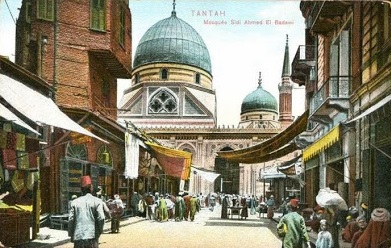
Sh. Ahmad al-Badawi
سيدي الشيخ أحمد ابدوي
d. 675 H. in Tanta, Egypt
radiya Allah anhu
Bio: Sh. Ahmad al-Rifa´i

Sayyidi Shaykh Ahmad al-Rifa´i
b. 512 – d. 578 H. in Umm ´Abida (a village in Bata’ih)
qaddasa Allah sirrahu
.
One of the greatest Sufi Masters – may Allah be pleased with him.
English
عربي
أحمد بن أبي الحسين الرفاعي
Burial Place
More
Bio: Sh. Ahmad al-Tabrizi al-Hanafi

Ahmad al-Tabrizi al-Hanafi
d. 735 in Damascus, Kafar Susa
أحمد بن عبد الكريم بن عبد الصمد التبريزي الحنفي
radiya Allah anhu
Great Hanafi scholar, who used to witness (i.e. veryfy legal writings) in front of al-Madrasa al-Masmariyya in Qaymariya. Died in Kafar Susa and was buried there. [ZaSh p. 41]
Damas Cultural Society © 2007
Bio: Sh. Ahmad b. Badr al-Din al-Hanafi

Shaykh Ahmad b. Badr al-Din al-Hanafi
d. 934
أحمد بن بدر الدين الحنفي
radiya Allah anhu
Buried in the Hamriyyah graveyard
– بمحلة الشويكة – [ZaSh p. 41]
Reference: Damas Cultural Society © 2007
Bio: Sh. Ahmad Habbal
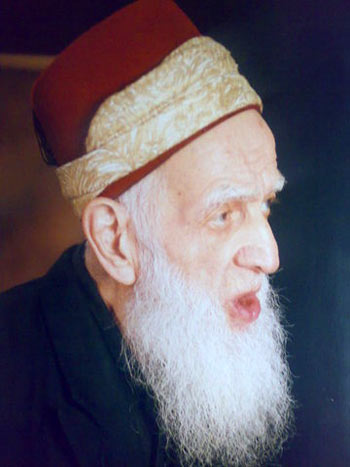
Shaykh Ahmad al-Rifa´i al-Habbal al-Dimashqi
الشيخ أحمد الرفاعي الحبال
d. 1430 H. (2009 CE) in Damascus
Bio: Sh. Ahmad ibn Ajiba
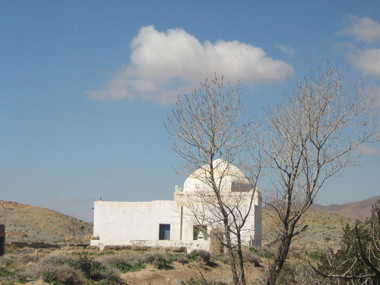
Sayyidi Shaykh Ahmad ibn Ajiba al-Hasani
سيدي الشيخ أحمد ابن عجيبة الحسني
d. 1224 H. (1809 CE) East of Tetuan
Bio: Sh. Badr al-Din al-Hasani
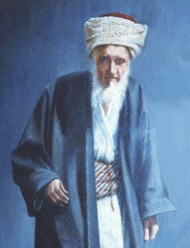
Shaykh Badr al-Din al-Hasani
محدث الشام الأكبرالشيخ محمد بدر الدين بن يوسف الحسني المغربي الاصل الدمشقي
b. 1267 – d. 1354 H in Damascus (1850-1935 CE)
qaddasa Allah sirrahu
.
“The muhaddith of Sham” – one of the last great memorisers of hadith. This Hanafi master had a photographic memory and used it to his utmost ability. He lived a life of ascetic worship and teaching, with a handful of students receiving his full devotion.
Bio English
One of the great scholars, Badruddin Al-Hasani (who was a master of hadith), from the city of Damascus, who died in this age, at every ‘Eid, he would go out, and he would give his students charity from his own pocket, and there were places, particularly in the colonialism era, where there were a lot of women that were impoverished and forced into prostitution to support themselves, and he would tell his student to give those prostitutes charity, and he would say to them, “Tell them that Badruddin Al-Hasani asked you to make du’ah (supplication) for him.” And those women would weep when they heard that: “Who are we to make du’ah for Badruddin Al-Hasani?.” There were people who repented because of that act.
The following are quoted from Al Durar Al Lu’lu’iyyah by Shaikh Mahmood al Rankoosi (pp. 9, 13, 28) who was his special student for the last twelve years of his life:
“He knew Saheeh Muslim and Bukhaari by heart, including individual chains of narrators and their biographies. It is not improbable that he also knew by heart their commentaries from “Fath Al Baari”, al `Ayni and al Nawawi.
Egypt’s Mufti Shaikh Muhammad Bakheet said: “If he was with us in Egypt, (out of respect) scholars would carry him over their shoulders.”
Shaikh Muhammad al Qaayaati said:”He is among the rarities of this age… We were present one night when he was reciting Saheeh Al Bukhaari. He recited more than one hour, discussing topics and explaining Hadeeth by heart.”
The great Hadeeth scholar Abdu’l Waasi` al Yamaani said: “I have heard teachers and preachers in numerous countries but I have never seen anybody similar to him concerning his expertise in all Sciences.”
A scholar from India said in a long biography: “He is the Qutb -pivot, pillar- of our time and the Mujaddid -renovator of religion- of our age.”
Shaikhu’l Islam in Istanbul, Musa Kaazim Afandi said: “He is the Qutb of the Muslim world.”
Al Sayyid al Kabeer al Kittaani al Maghribi said: “There has been no one comparable to him since five hundred years.”
Experts in engineering and mathematics would often attend his lessons and concede his superiority in these sciences saying: “We spent all our life learning but did not reach his level.”
عربي
Portraits



Sheikh Badru al-Din al-Hasani in the center of the picture, using his particular turban, with Sheikh `Ayun Suwayd
Burial Place
Buried outside the Maqbara Bab Saghir. A modern mosque with an institute is erected next to his grave. With him is buried his son Sheikh Yusuf al-Hasani (d. 1279 H), who succeded him as a head of Dar al-Hadith.

Tomb of Sheikh Badru al-Din al-Hasani
Photo: JK/Ziarat 2006
Ref's
– Depending on Allah, Zaytuna Institute Paper
– Dar al-Hadith
– Hanbali Text Society
– Damas Cultural Society 2006
© Damas Cultural Society 2006
Bio: Sh. Ibn Abi Jamra | الشيخ عبد الله بن أبى جمرة
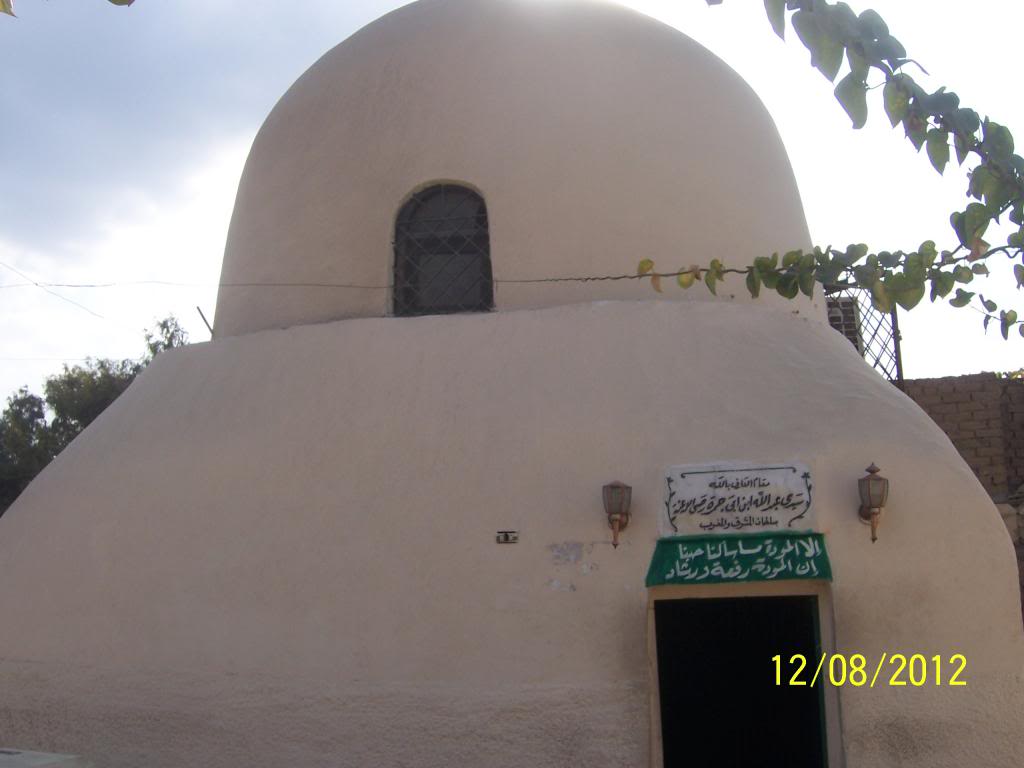
Sh. `Abd Allah Ibn Abi Jamra
الشيخ عبد الله بن سعد بن سعيد بن أبي جمرة الأزدي الأندلسيd. 675 H. in Cairo
radiya Allah anhu
Bio: Sh. Ibn Sayyid al-Nas | الشيخ محمد بن سيد الناس
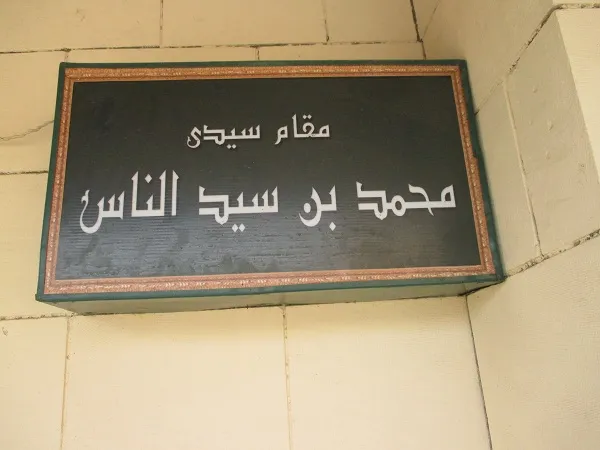
Sh. Fath al-Din Muhammad Ibn Sayyid al-Nas
الشيخ فتح الدين محمد اليعمري، الإشبيلي، المعروف بابن سيد الناسb. 671 in Cairo - d. 734 H. in Cairo
radiya Allah anhu.
Bio: Sh. Ibrahim al-Desuqi al-Husayni
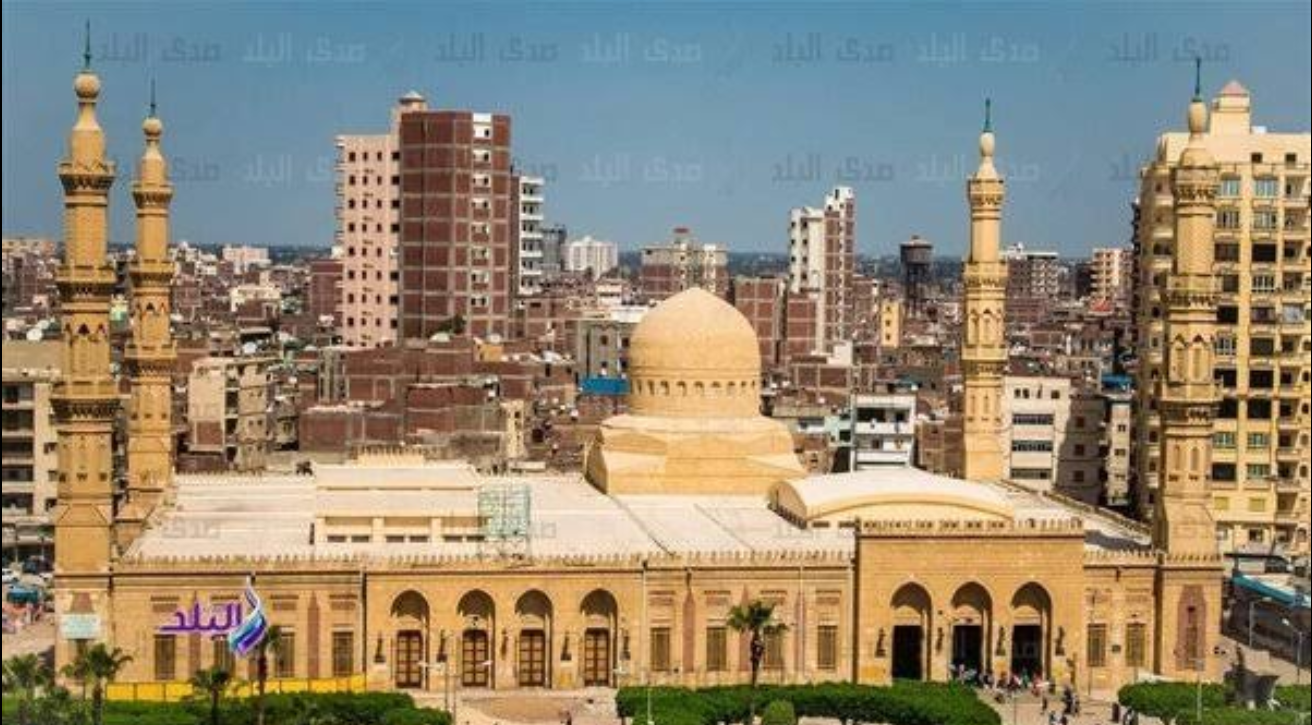
Shaykh Ibrahim al-Desuqi al-Husayni
الشيخ سيدي إبراهيم الدسوقي
b – d. 675 H. (… CE) in Tanta
From the companions of Imam Abul Hasan al-Shadhili
may Allah be pleased with them
Bio: Sh. Ibrahim al-Yaqoubi
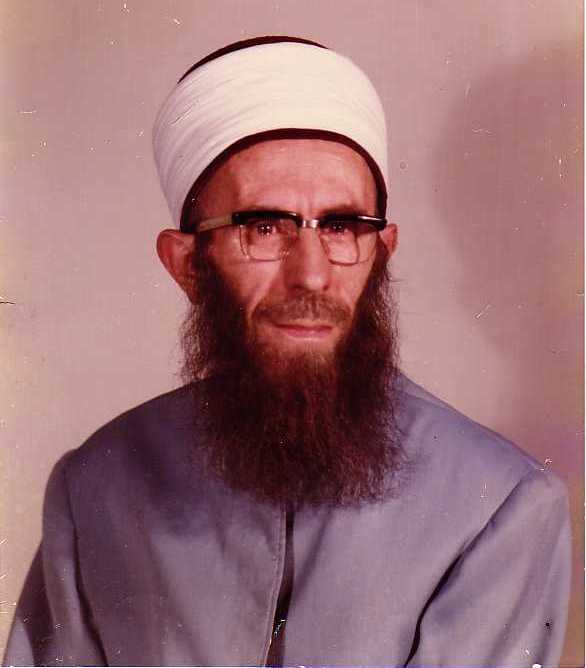
Sayyidi Shaykh Ibrahim al-Yaqoubi al-Hasani al-Idrisi
الشيخ السيد إبراهيم اليعقوبي الحسني
d. 1406 H. / 1985 CE in Damascus
qaddasa Allah sirrahu
Bio: Sh. Ibrahim Fahham | الشيخ إبراهيم الفهَّام (الفحَّام)
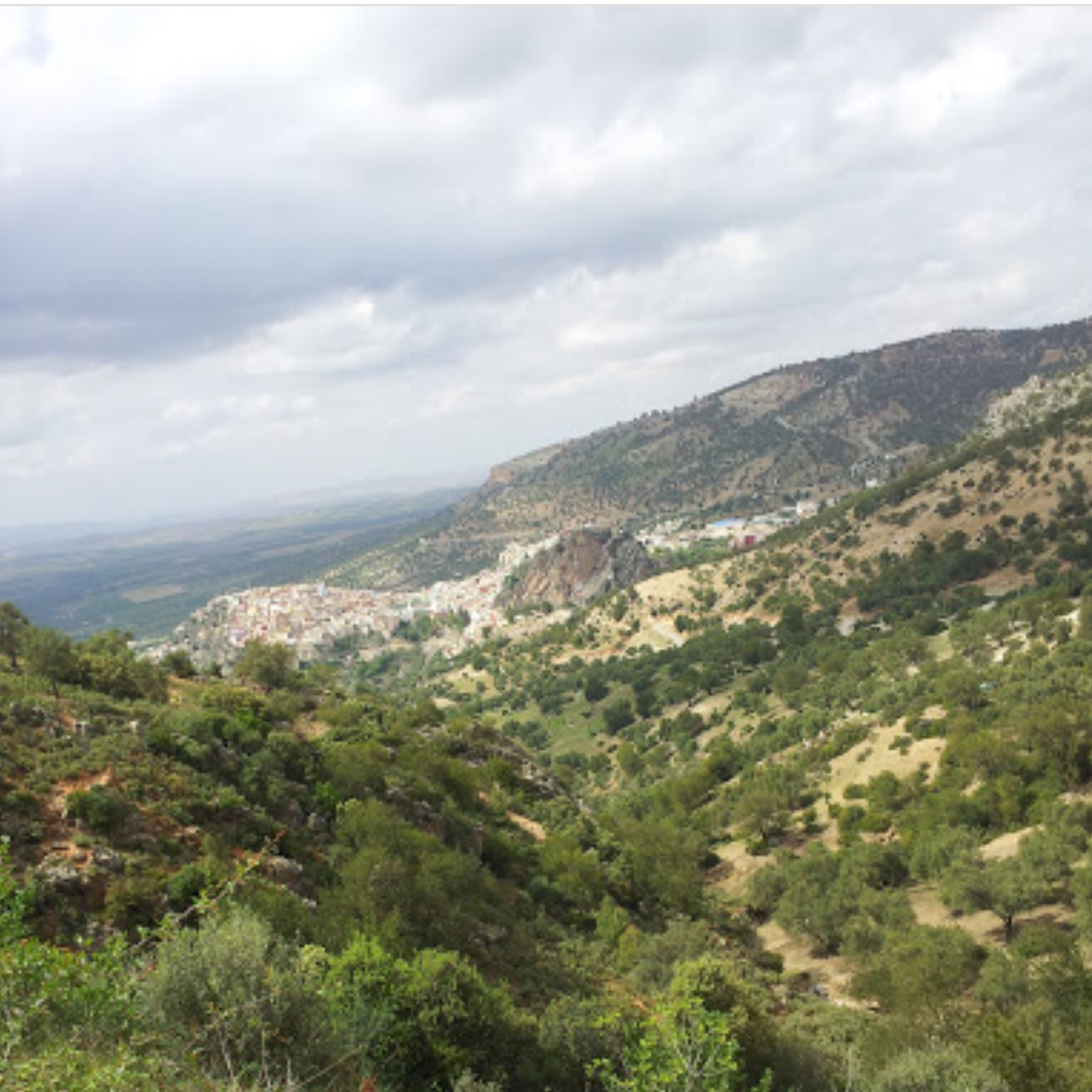
Sh. Ibrahim "Fahham" al-Zarhuni
الشيخ أبو إسحاق إبراهيم بن علي الزرهوني المعروف بالفهَّام (أو الأفهم أو الفحَّام)d.after 900 H. in Jabal Zarhun near Fas
qaddasa Allah sirrahu
Bio: Sh. Ismail al-Yaqoubi
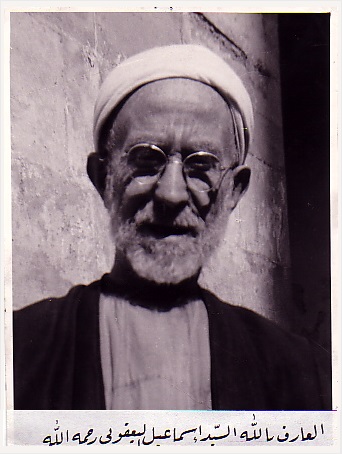
Sayyidi Shaykh Ismail al-Yaqoubi al-Hasani al-Idrisi
الشيخ السيد إسماعيل اليعقوبي الحسني
d. 1380 H. / 1960 CE in Damascus
qaddasa Allah sirrahu
Bio: Sh. Izz al-Din ibn ‘Abd al-Salam | سيدي عز الدين بن عبد السلام
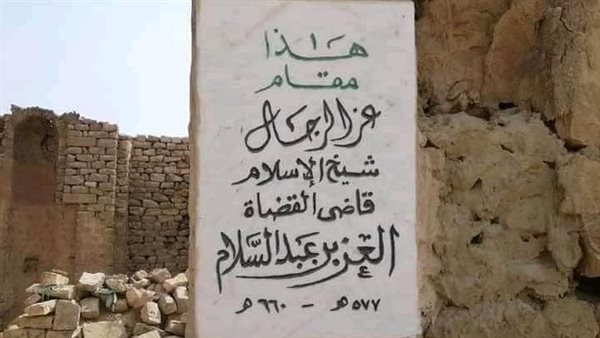
Sh. Izz al-Din ibn 'Abd al-Salam
الشيخ عز الدين بن عبد السلامb. in Damascus 577 H. – d. 660 H. in Cairo, Egypt
radiya Allah anhu
